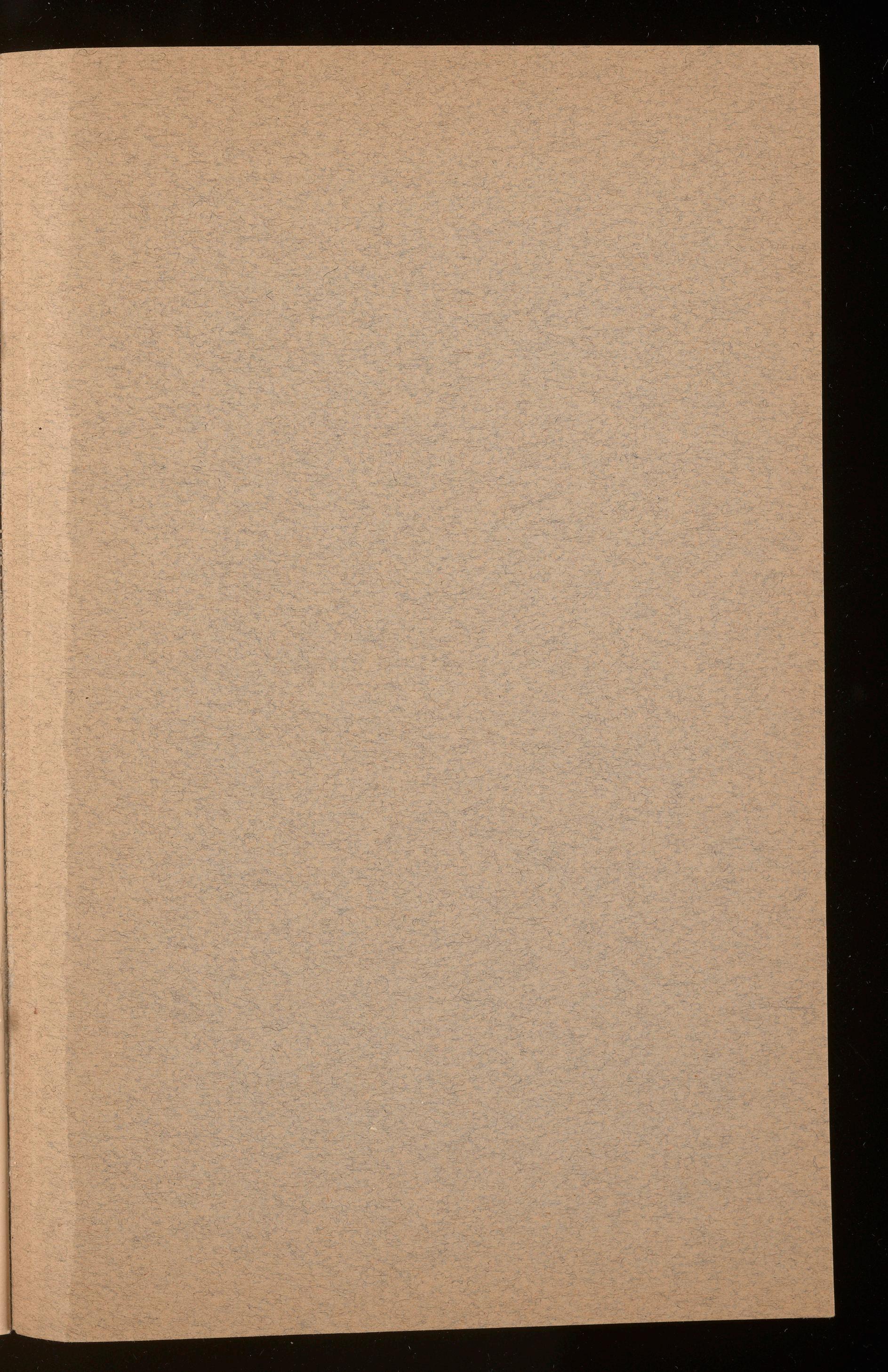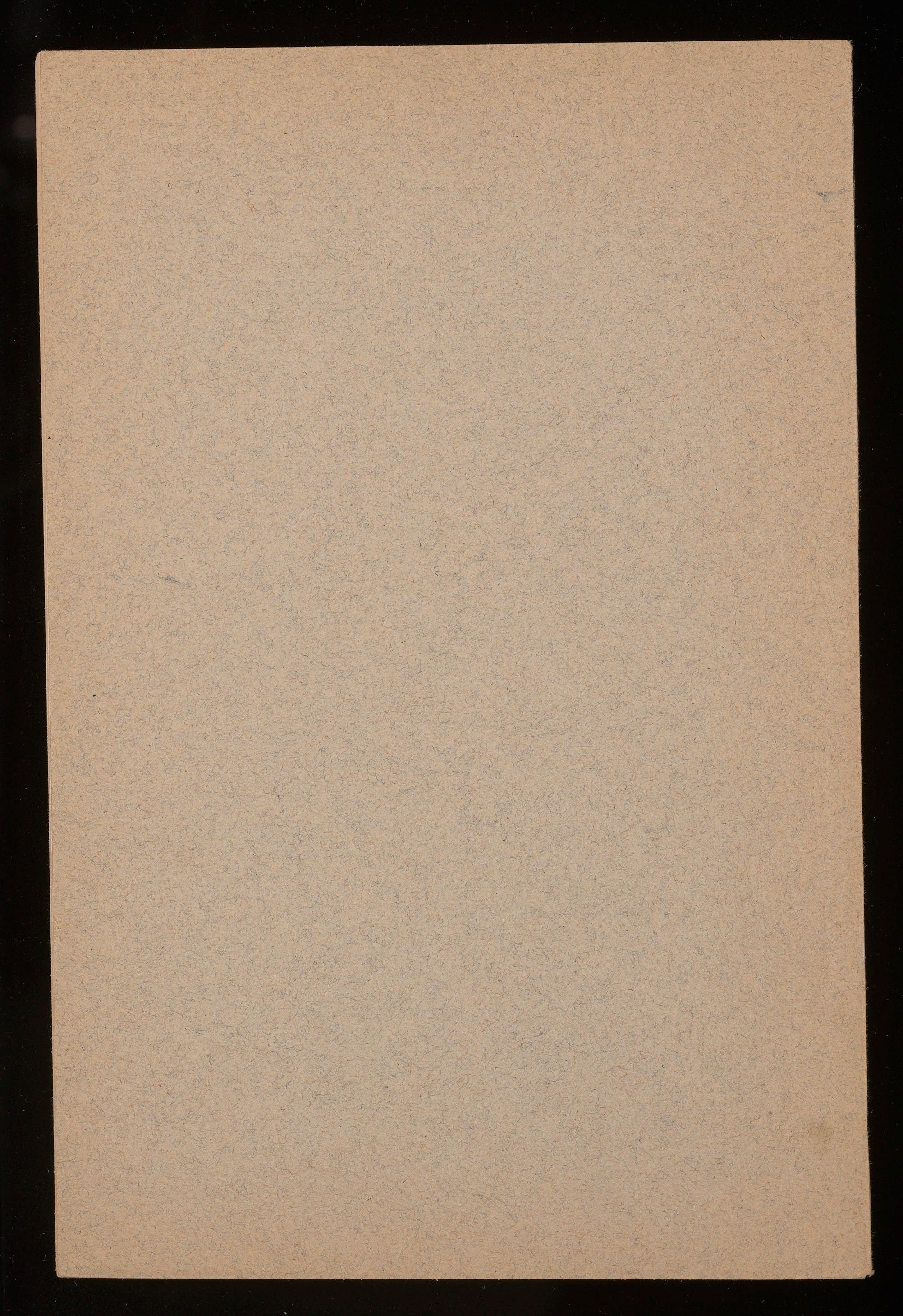Universityof Richmond Bulletin
Vol. XXVII MARCH, 1925
CATALOGUE of Richmond College
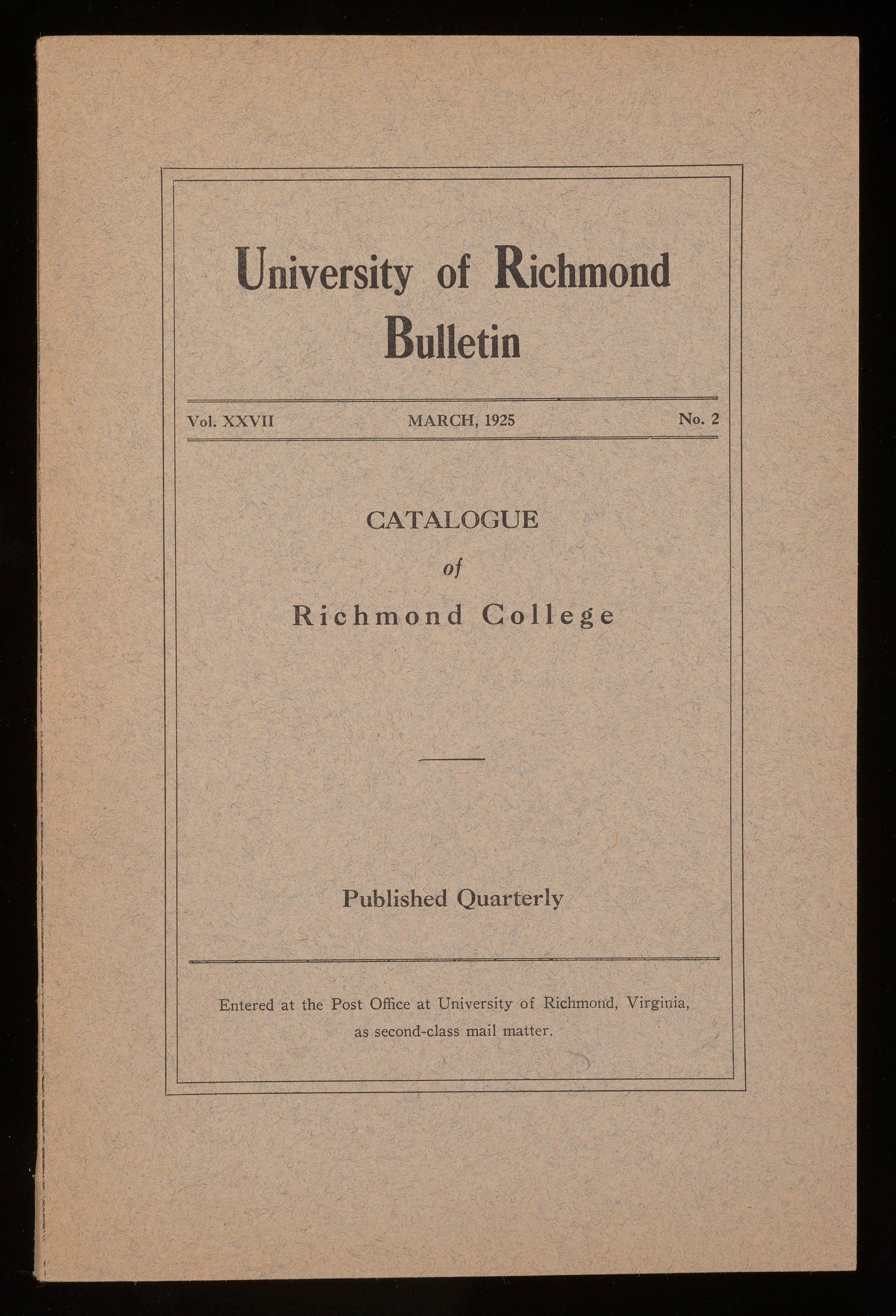
No. 2
Published Quarterly
Entered at the Post Office at University of Richmond, Virginia, as second-class mail matter.


Vol. XXVII MARCH, 1925

No. 2
Published Quarterly
Entered at the Post Office at University of Richmond, Virginia, as second-class mail matter.

UNIVERSITY of RICHMOND, VA.
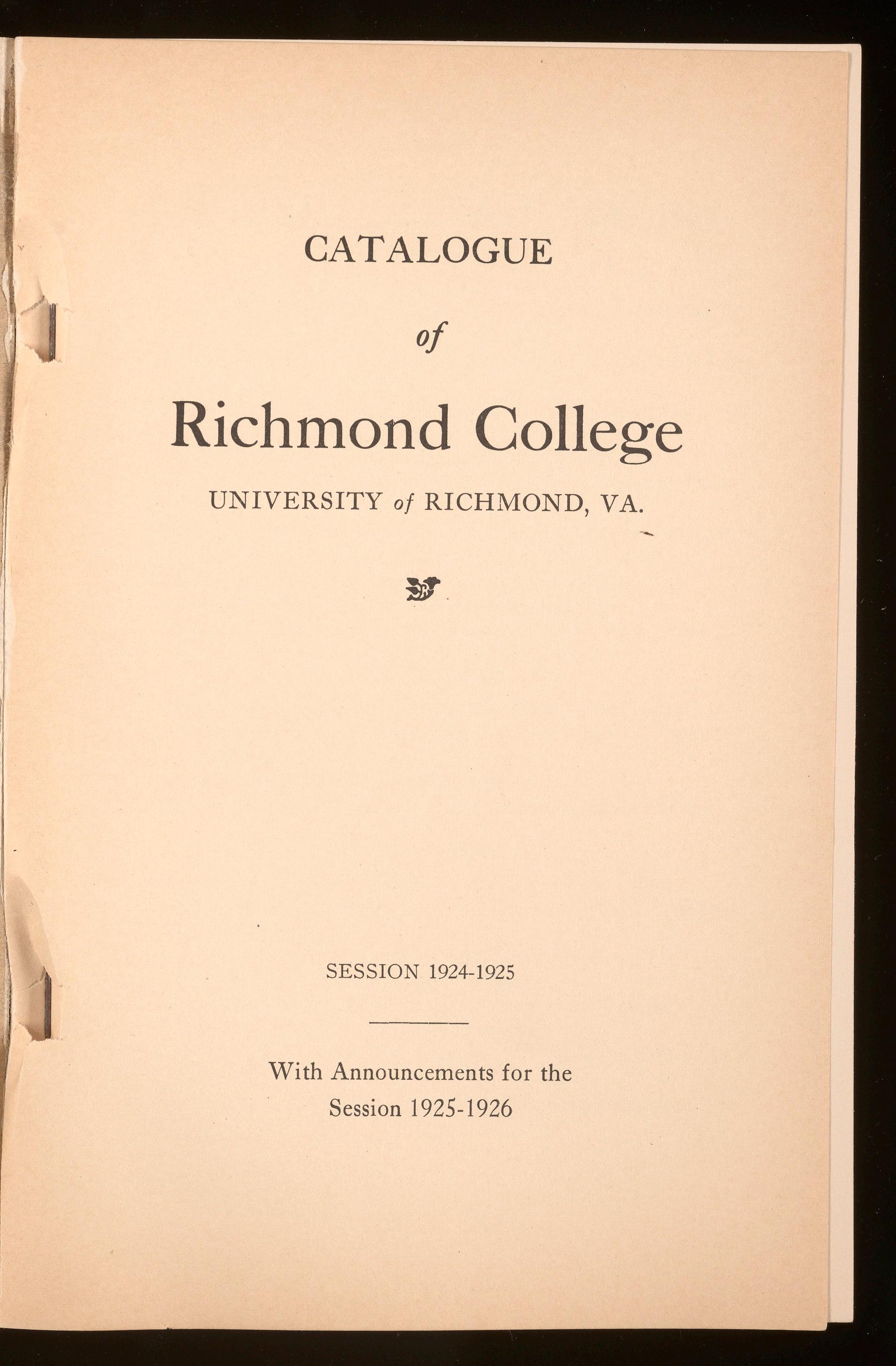
SESSION 1924-1925
With Announcements for the Session 1925-1926


SEPTEMBER15TH-16TH, TUESDAY AND WEDNESDAY.-Entrance Examinations.
SEPTEMBER16TH, WEDNESDAY, 9 :00 A. M.-Registration of New Students.
SEPTEMBER 17TH, THURSDAY.-Session begins: registration of Students.
SEPTEMBER18TH, FRIDAY.-Organization of Classes.
SEPTEMBER18TH-19TH, FRIDAYAND SATURDAY.-Special Examinations.
SEPTEMBER21sT, MONDAY,11 :00 A. M.-First Chapel Assembly.
OcTOBER9TH, FRIDAY.-Applications for Degrees Filed.
NOVEMBER26TH, THURSDAY.-Thanksgiving Holiday.
DECEMBER16TH, WEDNESDAY.-Examinations begin.
DECEMBER22ND, TUESDAY,12 NooN.-Close of First Term.
JANUARY4TH, MONDAY,10 :00 A. M.-Second Term begins.
JANUARY4TH-5TH, MONDAYAND TuESDAY.-Special Examinations.
MARCH 15TH, MoNDAY.-Examinations begin.
MARCH 20TH, SATURDAY,12 NooN.-Close of Second Term.
MARCH 29TH, MONDAY,10:00 A. M.-Third Term begins.
MARCH 29TH-30TH, MONDAYAND TuESDAY.-Special Examinations.
MAY 5TH, WEDNESDAY.-M. A. Theses handed in.
MAY 31ST, MoNDAY.-Examinations begin.
JuNE 6TH, SuNDAY, 11 :00 A. M.-Baccalaureate Sermon.
JUNE 7TH, MoNDAY.-Class Day Exercises.
JuNE 8TH, TuESDAY.-Annual Meeting of Trustees, Alumni Reunions.
JUNE 9TH, WEDNESDAY,10 :30 A. M.-Commencement Day. [ 3 ]
A. W. PATTERSON PRESIDENT
T. C. WILLIAMS, JR. VICE-PRESIDENT
B. WEST TABB S ECRETARY
CLASS ONE
Term expires June, 1925
E. C. MATHEWS.. ..... .. Norfolk
ROBERTS. CRUMP ... Richmond
STUART McGurnE , M. D. , LL. D ................... Richmond
T. C. WILLIAMS, JR., LL. D., Richmond
Miss LULA WINSTON.. Richmond
CLASS TWO
Term expires June, 1926
A. J. MONTAGUE,LL. D . Richmond
R. C. WILLIAMS....... . . Richmond
B. T. GUNTER .. ... . Accomac
A. R. LoNG ..... Lynchburg
R. H. ANGELL .. . .... . Roanoke
CLASS THREE
_
Term expires June , 1927
J. L. Camp ............... Franklin
A. W. PATTERSON.... Richmond
GEo. B. TAYLOR,D. D ....... Hollins
C. J BILLUPS........... Richmond
BURNLEYLANKFORD , M. D .. Norfolk
CLASS FOUR
Term expires June, 1928
R. M. SMITH ... Richmond
T. B. McADAMS......... Richmond
REV. J. T. STINSON, Bluefield, W Va.
MRs. G. W. McDANIEL, University of Richmond

CLASS FIVE
Term expires June, 1929
J UDGE w. R. BARKSDALE... Halifax
E M. LoNG.. . .. ..... Richmond
E. B . JACKSON , D. D ..... Lexington
B P. WILLIS ..... . Fredericksburg
CLASS SIX
Term expires June , 1930
C. T WATKINS . ..... Richmond
L L. SUTHERLAND . . Staunton
W. H . BAYLOR , D. D ...... Baltimore
NORMAN H. WILLIAMS . Chase City
Miss ALTA FosTER . ... Richmond
CLASS SEVEN
Term expires June, 1931
J HuNT HARGRAVE .... Chatham
R. H. PITT, D. D., LL. D., Richmond
H. W. STRALEY .. Princeton, W. Va.
W J. PARRISH... ...... Richmond
CLASS EIGHT
Term expires June, 1932
J. J. MoNTAGUE... ... . Richmond
GEo. SWANN ......... Trenholm
HATCHER SEWARD....... Petersburg
W. S. FORBES............ Richmond

The By-Laws provide that the President of the Board of Trustees and the President of the University shall be members of all standing committees, and that the Treasurer of the University shall be a member of the Executive Committee. The Secretary of the Board is ex officio Secretary of all standing committees of the Board.
ExECUTIVE.-T. C. Williams, Jr., Thos. B. McAdams, Russell C. Williams, J. L. Camp, R. H. Pitt, Robt. S. Crump, B. West Tabb, A. W. Patterson, F. W. Boatwright.
LIBRARY.-A. J. Montague, Stuart McGuire, C. P. Billups, W. J. Parrish, Miss Lula Winston, Miss Alta Foster, R. H. Angell, Professor Handy, Professor Lough.
Arn FUNDS (Scholarships and Donations).-R. M. Smith, W. H. Baylor, J. T. Stinson, B. P. Willis, H. W. Straley, Mrs. G. W. McDaniel, L. L. Sutherland, Hatcher Seward.
NOMINATIONOF NEW TRUSTEES.-W. R. Barksdale, B. T. Gunter, A. R. Long, G. B. Taylor, N. H. Williams.
NOMINATIONFOR HONORARYDEGREES.-}. H. Hargrave, C. T. Watkins, E. B. Jackson, E. C. Mathews, Burnley Lankford, E. M. Long, Professor Gaines.
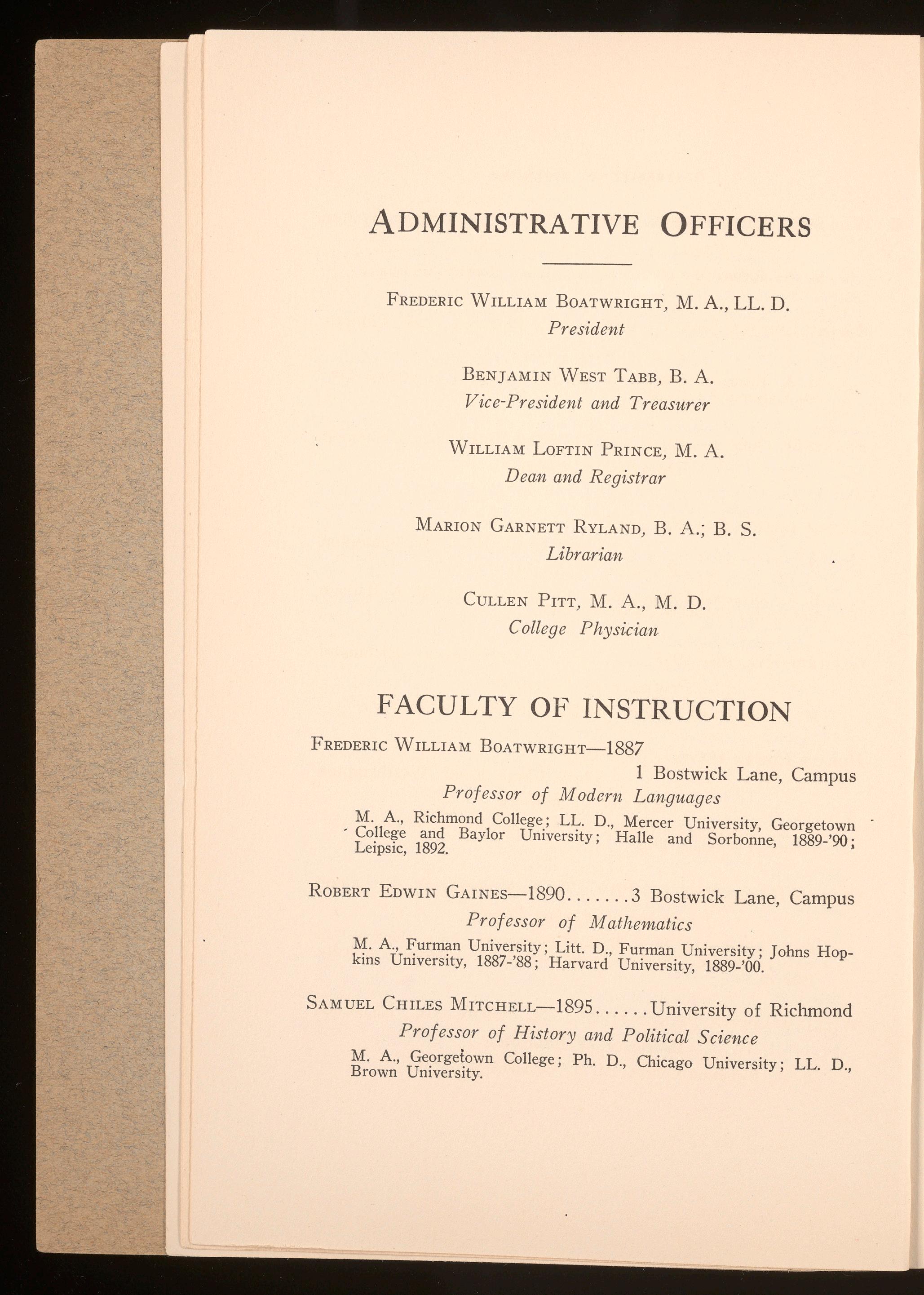
FREDERICWILLIAM BOATWRIGHT,M.A., LL. D. President
BENJAMIN WEST TABB, B. A. Vice-President and Treasurer
WILLIAM LOFTIN PRINCE, M. A. Dean and Registrar
MARION GARNETT RYLAND, B. A.; B. s. Librarian
CULLEN PITT, M. A., M. D. College Physician
FREDERICWILLIAM BoATWRIGHT-1887 1 Bostwick Lane, Campus Professor of Modern Languages
M. A., Richmond College; LL D., Mercer University, Georgetown · College and Baylor University; Halle and Sorbonne, 1889-'90; Leipsic, 1892.
ROBERT EDWIN GAINEs-1890 .. .... 3 Bostwick Lane, Campus Professor of Mathematics
M. A., Furman University; Litt. D., Furman University; Johns Hop- kins University, 1887-'88; Harvard University, 1889-'00.
SAMUEL CHILES MITCHELL-1895 ...... University of Richmond Professor of History and Political Science
M. A., Georgetown College; Ph. D., Chicago University; LL. D., Brown University.

WILLIAM ASBURYHARRis-1901 ............. 2 College Avenue Professor of Greek and Latin
M .A., Richmond College; Ph. D., Johns Hopkins University.
RoBERT EDWARDLovING-1908 ...... 2 Bostwick Lane, Campus Professor of Physics
M. A., Richmond College; Ph. D., Johns Hopkins University; Cornell University, 1919-'20.
FRANK M. DoBSON-1913 ...... 713 Byrd Park Court, Richmond Director of Athletics
HENRY BRANTLYHANDY-1914
Three Chopt Road, Westhampton Professor of English
B. A., Richmond College; M. A., Richmond College; M. A. Harvard University; Columbia University, 1915.
GARNETTRYLAND-1917 .............. University of Richmond Professor of Chemistry
M. A., Richmond College; Ph. D., Johns Hopkins University.
HORACEEDWIN HAYDEN,JR.-1919
Three Chopt Road, Westhampton Professor of Biology
A. B., Princeton University; M. A., University of Virginia; University of Virginia, 1910.
Cwmus HARRIS WILLis-1919 .. 304 N. Mulberry St., Richmond Professor of Applied Physics
B. S., Richmond College; B. S. in Engineering, Johns Hopkins University; Graduate Student in Physics, Johns Hopkins University, 1922-'23.
WILLIAM LOFTIN PRINCE-1920 ... 2423 Grove Ave., Richmond Professor of Education
B. A., Richmond College ; M. A., Columbia University.

James A. Bostwick, Professor of English
James Thomas, Jr., Professor of Philosophy
HAYNIE H. SEAY, JR.-1920 .... ..... University of Richmond Professor of Economics
B. A., Richmond College; M . A., Columbia University; Johns Hopkins University, 1917-'19; Princeton University, 1919-'20.
PAUL R. MERRIMAN-1920 . . . Three Chopt Road, Westhampton Professor of Botany
A. B ., Miami University; M. S., Cornell Universjty; Harvard University, 1912.
ROBERTCoLLINS AsTROP-1920
100 N. Crenshaw Ave., Richmond Professor of Psychology
A. B., Randolph-Macon College; M. A., University of Virginia; Columbia University, 1914-'15; Columbia University, 1923.
CLEMENT ORESTES MEREDITH-1920 ... University of Richmond Professor of German
A. B., Guilford College; A. B., Haverford College; Ph. D., Johns Hopkins University; Berlin, 1908-'10; American School of Philology at Rome, 1910.
EMIL' FRANCIS SAVERro-1922 ..... 3004 Floyd Ave., Richmond Professor of Romance Languages
A. B., College of Montana; M. A., ibid.; University of Chicago, 1914; Ph. D., University of Texas.
RoLVIX HARLAN-1922 ........... . ... University of Richmond Professor of Sociology and Social Ethics
A. B , George Washington University; M. A., ibid.; Ph. H., University of Chicago.
RALPH B. HARRIS-.-1923 ........ 3212 Patterson Ave., Richmond Professor of Business Administration
B S., University of Pennsylvania; M. A., University of Chicago.
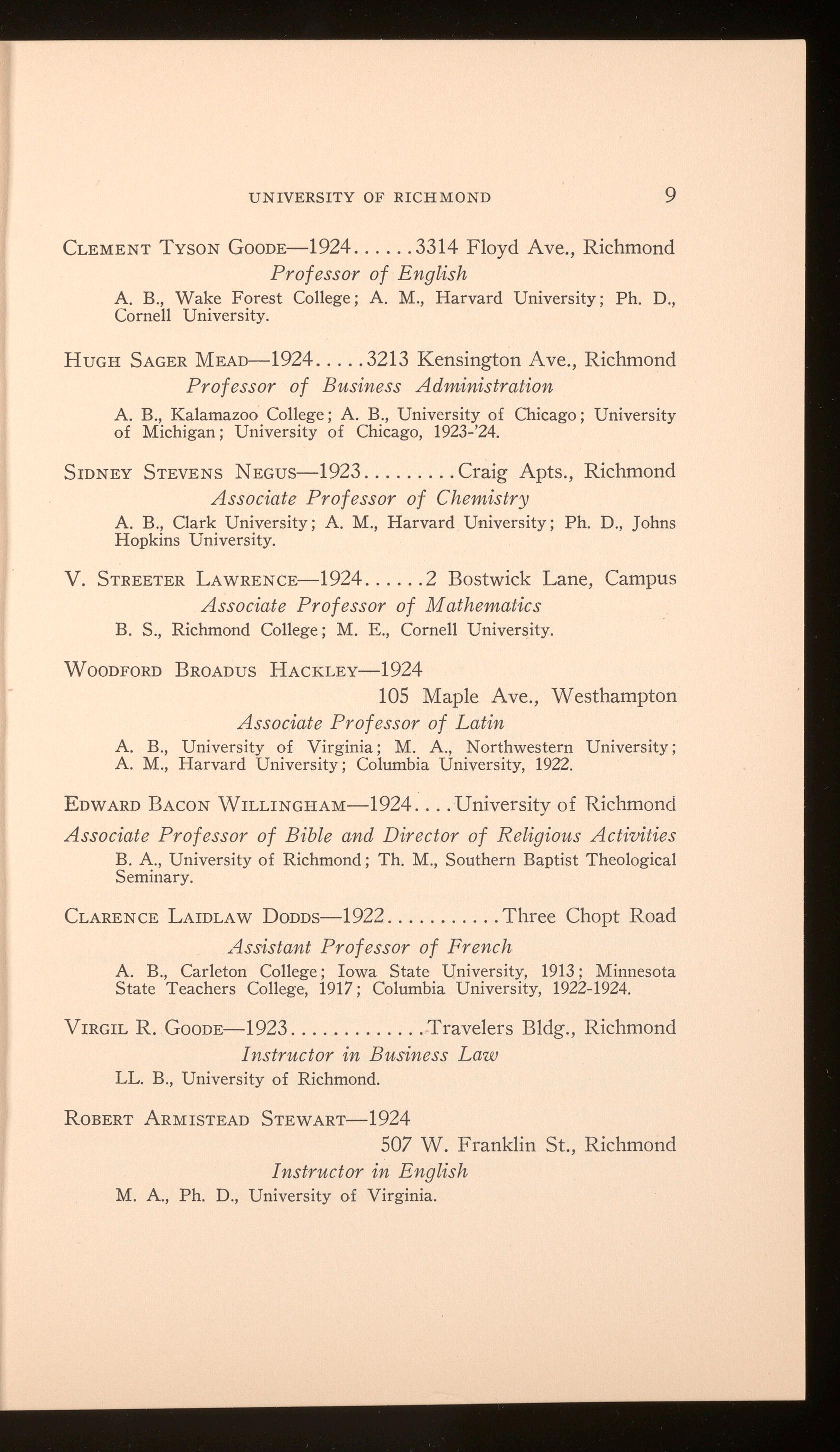
CLEMENT TYSON GooDE-1924 ...... 3314 Floyd Ave., Richmond Professor of English
A. B., Wake Forest College; A. M., Harvard University; Ph. D., Cornell University.
HuGH SAGERMEAD-1924 ..... 3213 Kensington Ave., Richmond Professor of Business Administration
A. B., Kalamazoo College; A. B., University of Chicago; University of Michigan; University of Chicago, 1923-'24.
SIDNEY STEVENS NEGUs-1923 ......... Craig Apts., Richmond Associate Professor of Chemistry
A. B., Clark University; A. M., Harvard University; Ph. D., Johns Hopkins University.
V. STREETERLAWRENCE-1924 .. . . .. 2 Bostwick Lane, Campus Associate Professor of Mathematics
B. S., Richmond College; M. E., Cornell University. WOODFORDBROADUSHACKLEY-1924
105 Maple Ave., Westhampton
Associate Professor of Latin
A. B., University of Virginia; M. A., Northwestern University; A. M., Harvard University; Columbia University, 1922.
EDWARDBACON\VILLINGHAM-1924 .... University of Richmond
Associate Professor of Bible and Director of Religious Activities
B. A., University of Richmond; Th. M., Southern Baptist Theological Seminary.
CLARENCELAIDLAW DoDDs-1922 ........... Three Chopt Road Assistant Professor of French
A. B., Carleton College; Iowa State University, 1913; Minnesota State Teachers College, 1917; Columbia University, 1922-1924.
VIRGIL R. GooDE-1923 ............. Travelers Bldg., Richmond Instructor in Business Law
LL. B., University of Richmond.
ROBERT ARMISTEAD STEWART-1924
507 W. Franklin St., Richmond Instructor in English
M. A., Ph. D., University of Virginia.
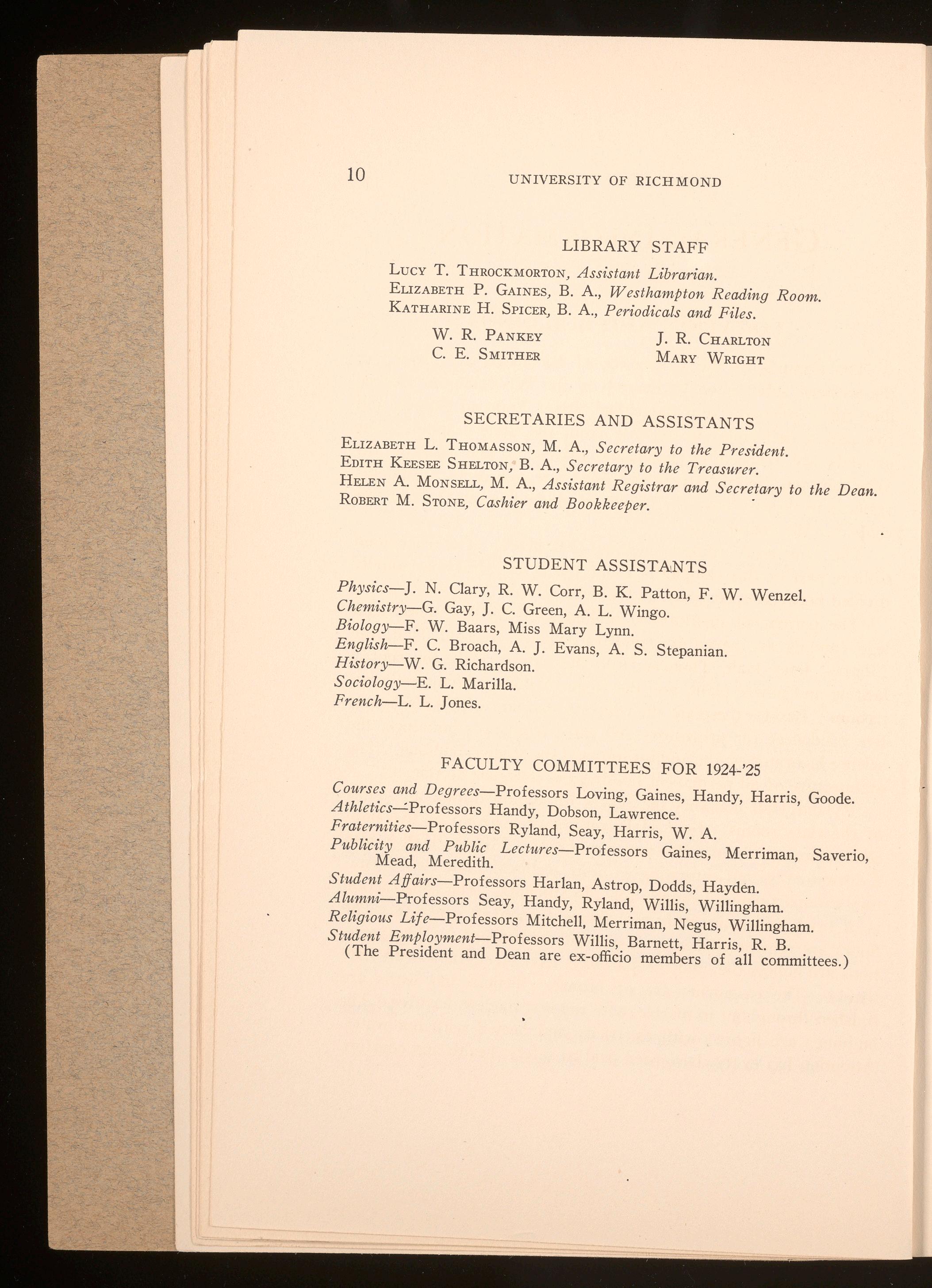
UNIVERSITY OF RICHMOND
Lucy T. THROCKMORTON,Assistant Librarian.
ELIZABETHP. GAINES, B. A., Westhampton Reading Room. KATHARINEH. SPICER,B. A., Periodicals and Files.
W.R. PANKEY
C. E. SMITHER J. R. CHARLTON MARY WRIGHT
ELIZABETHL. THOMASSON,M. A., Secretary to the President.
EDITH KEESEESHELTON,B. A., Secretary to the Treasiwer.
HELEN A. MoNSELL,M. A., Assistant Registrar and Secretary to the Dean.
ROBERTM STONE,Cashier and Bookkeeper. ·
Physics-]. N. Clary, R. W. Corr, B. K. Patton, F. W. Wenzel. Chemistry-G. Gay, J. C. Green, A. L. Wingo. Biology-F. W. Baars, Miss Mary Lynn. English-F. C. Broach, A. J. Evans, A. S. Stepanian. History-W. G. Richardson. Sociology-E. L. Marilla. French-L. L. Jones.
FACULTY COMMITTEES FOR 1924-'25
Courses and Degrees-Professors Loving, Gaines, Handy, Harris, Goode. Athletics-=-Professors Handy, Dobson, Lawrence. Fraternities-Professors Ryland, Seay, Harris, W. A. Publicity and Public Lectures-Professors Gaines, Merriman, Saverio, Mead, Meredith.
Student A.ff airs-Professors Harlan, Astrop, Dodds, Hayden. Alumni-Professors Seay, Handy, Ryland, Willis, Willingham. Religious Life-Professors Mitchell, Merriman, Negus, Willingham.
Student Employment-Professors Willis, Barnett, Harris, R. B. (The President and Dean are ex-officio members of all committees.)

The grounds of the University of Richmond are located in the western suburbs of Richmond on the Westhampton electric line, thirty minutes from the Broad Street Railroad Station and five and a half miles in air line from the State Capitol. The grounds are reached by handsome driveways and also by the Westhampton electric street car line, fare six cents. Students resident in the city have the benefit of student tickets, sold at five cents for the round trip.
The University campus includes 291 acres. The Richmond College part of this campus is about 150 acres, somewhat equally divided between open space and woodland.
The permanent institutional buildings on the Richmond College campus are seven in number, namely: Ryland Hall, the Library, Jeter Hall, Thomas H,all, the Brunet Hall, the central heating and power plant, and the Roger Millhiser Memorial gymnasium. Besides these are the concrete stadium, with 4,650 seats; five residences for professors and three temporary buildings, the science laboratories, the auditorium, and the student building. The architecture of all permanent buildings is collegiate Gothic.
Ryland Hall contains the offices of administration and most of the class rooms. Jeter Hall consists of a group of five noncommunicating dormitories under one roof. Thomas Hall is also a dormitory group consisting of four sections. The two dormitory groups furnish lodgings for 246 students. The construction is of brick and stone with steel frame encased in concrete. The floors are reinforced concrete, overlaid with cypress. The partitions are hollow tile, and the stairways have steel frame with slate treads. The casements are of bronze. Toilets and baths are finished throughout in marble, with the best modern fixtures. The buildings are lighted with electricity and heated with hot water. Attention has everywhere been paid to safety, health and comfort.
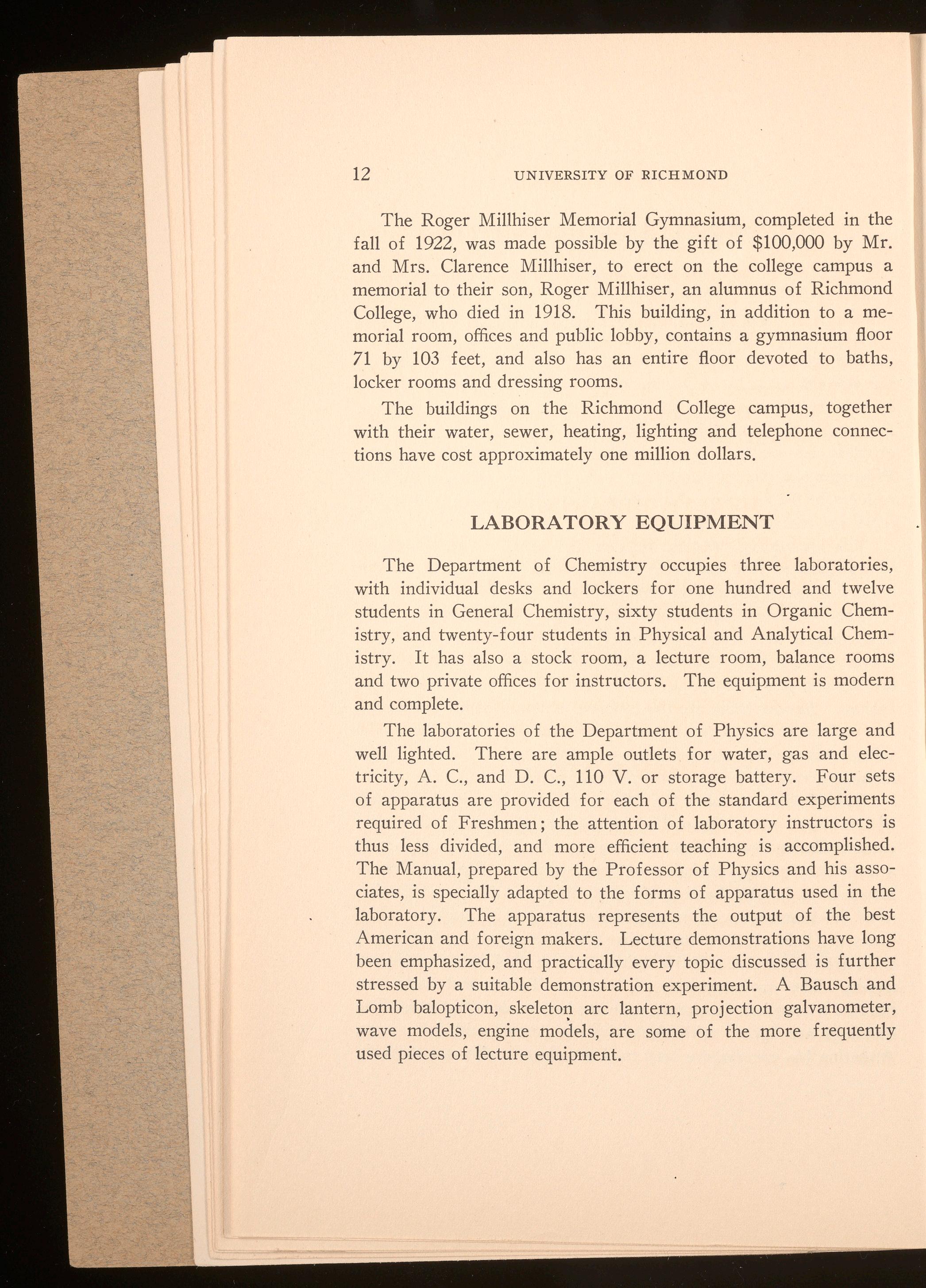
The Roger Millhiser Memorial Gymnasium, completed in the fall of 1922, was made possible by the gift of $100,000 by Mr. and Mrs. Clarence Millhiser, to erect on the college campus a memorial to their son, Roger Millhiser, an alumnus of Richmond College, who died in 1918. This building, in addition to a memorial room, offices and public lobby, contains a gymnasium floor 71 by 103 feet, and also has an entire floor devoted to baths, locker rooms and dressing rooms.
The buildings on the Richmond College campus, together with their water, sewer, heating, lighting and telephone connections have cost approximately one million dollars.
The Department of Chemistry occupies three laboratories, with individual desks and lockers for one hundred and twelve students in General Chemistry, sixty students in Organic Chemistry, and twenty-four students in Physical and Analytical Chemistry. It has also a stock room, a lecture room, balance rooms and two private offices for instructors. The equipment is modern and complete.
The laboratories of the Department of Physics are large and well lighted. There are ample outlets for water, gas and electricity, A. C., and D. C., 110 V. or storage battery. Four sets of apparatus are provided for each of the standard experiments required of Freshmen; the attention of laboratory instructors is thus less divided, and more efficient teaching is accomplished. The Manual , prepared by the Professor of Physics and his associates , is specially adapted to the forms of apparatus used in the laboratory. The apparatus represents the output of the best American and foreign makers. Lecture demonstrations have long been emphasized, and practically every topic discussed is further stressed by a suitable demonstration experiment. A Bausch and Lomb balopticon, skeleton arc lantern, projection galvanometer, wave models, engine models, are some of the more frequently used pieces of lecture equipment.

The Department of Biology has a large lecture room, a laboratory for beginning students, one for advanced students in Zoology, one for advanced students in Botany, a stock room, a library room, a dark room, and two professors' offices. It possesses thirty-six students' microscopes, five microscopes for advanced work, fifteen dissecting microscopes, microtomes, incubators, paraffin baths, microscope lamps, vivaria, and the necessary glassware and chemicals. The lecture room is equipped with a projectiscope and a microprojector. The department library contains a small working library, and a representative number of biological journals are on file.
Excellent provision is made for care of the health of all students resident on the campus. Dormitory students pay a medical fee of five dollars and receive in return the daily attention of the college physician and his assistants. Infirmary rooms are maintained to which students are removed whenever necessary. There is no extra charge for the use of infirmary rooms nor for the attendance of the physician's assistants who look after the needs of the sick. Fortunately the preventive measures in use are generally successful and there is but little sickness among students.
In 1917 Rev. W. Thorburn Clark and Mrs. Clark, of Richmond, donated two hundred dollars to be loaned to worthy students at the discretion of the president of the University. Recently Mr. Charles T. Bagby, of Baltimore, gave eight hundred dollars on similar conditions. The firm of Meyer Greentree, Inc., of Richmond, has this year given one thousand dollars to establish the "Meyer Greentree Loan Fund." These gifts meet a real need. They have already enabled several of the finest students in Richmond College to continue their work for a degree. The money is usually loaned in sums of fifty dollars to students who have made a good record in college and need some emergency assistance to finish the course.

The student self-government organization, known as the Student Council of Richmond College, was voluntarily established by the students themselves to further the best interests of the student body and of the College in general. It is vitally concerned with maintaining the honor system in the institution There is cordial co-operation between the Student Council and the constituted College authorities. Every matriculate of the College is a member of this organization.
Two literary societies, known as the Mu Sigma Rho and the Philologian, are maintained by the students. They are provided with attractive halls on the top floor of the Administration Building, where they hold weekly meetings for declamation, debate, and other literary exercises. Besides the joint oratorical contest and the joint debate held in the spring each society holds at least one public debate during the session. A generous rivalry is maintained between the two organizations by the joint offer of an orator's medal and a writer's medal, and among the individual members by the offer in each society of a medal for declamation or improvement in debate, and the best debater.
The literary societies hold membership in the Virginia State Inter-Collegiate Oratorical Association, which is composed of the societies of the leading colleges and universities of Virginia. The inter-collegiate oratorical contest is held annually in the late spring. Inter-collegiate debates are annually held between representatives of the College and representatives from other colleges in and out of Virginia.
The M esseng er.-A monthly magazine devoted to the development of literary activity among all the students of the University. In this periodical are published short stories, poems, essays, books reviews and editorials on questions of local academic interest .
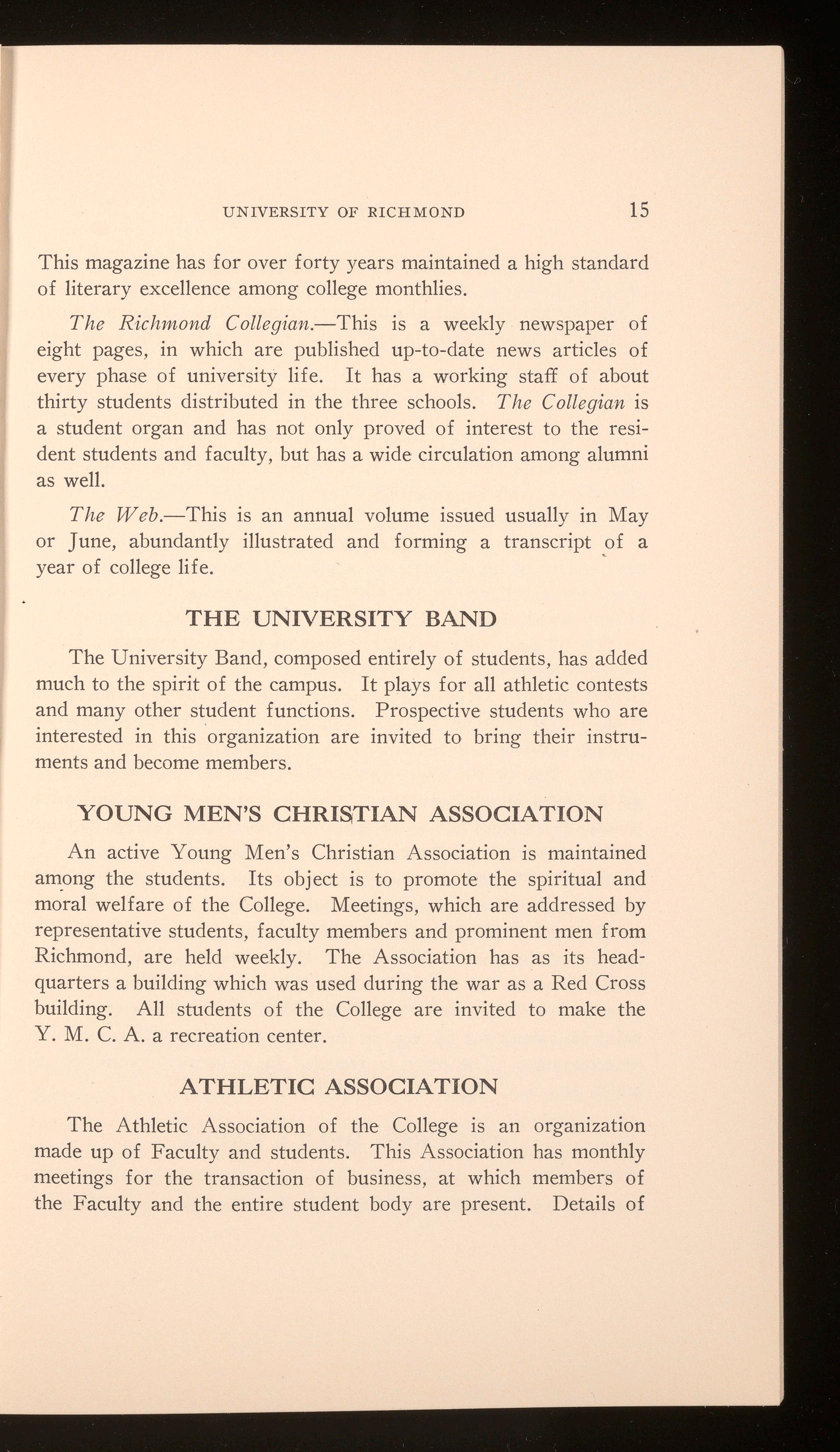
This magazine has for over forty years maintained a high standard of literary excellence among college monthlies.
The R-ichmond Collegian.-This is a weekly newspaper of eight pages, in which are published up-to-date news articles of every phase of university life. It has a working staff of about thirty students distributed in the three schools. The Collegian is a student organ and has not only proved of interest to the resident students and faculty, but has a wide circulation among alumni as well.
The Web.-This is an annual volume issued usually in May or June, abundantly illustrated and forming a transcript of a year of college life. •
The University Band, composed entirely of students, has added much to the spirit of the campus. It plays for all athletic contests and many other student functions. Prospective students who are interested in this organization are invited to bring their instruments and become members.
An active Young Men's Christian Association is maintained am_ong the students. Its object is to promote the spiritual and moral welfare of the College. Meetings, which are addressed by representative students, faculty members and prominent men from Richmond, are held weekly. The Association has as its headquarters a building which was used during the war as a Red Cross building. All students of the College are invited to make the Y. M. C. A. a recreation center.
The Athletic Association of the College is an organization made up of Faculty and students. This Association has monthly meetings for the transaction of business, at which members of the Faculty and the entire student body are present. Details of

management are entrusted to the Athletic Association, composed of students and professors, but general control is exercised by the Athletic Council, composed of representatives from the Trustees, Faculty, Alumni and Students.
I. THE TANNER MEDAL.-Founded by Colonel William E. Tanner, of Richmond, Va., in honor of his parents, John F. and Harriet L. Tanner, is given to the most proficient graduate in the Department of Greek.
II. THE JAMES D. CRUMP PRIZE.-Founded by the gentleman whose name it bears-is a prize of twenty dollars in gold, given for excellence in Course 2 in Mathematics. It is awarded in part on the regular class work and in part on extra work.
III. THE J. TAYLORELLYSONMEDAL IN HrsTORY.-Lieutenant-Governor J. Taylor Ellyson, of Richmond, established in 1912 a prize to be awarded to the student in the Department of History and Political Science, who shall present the best piece of original investigation in Virginia or Southern History.
IV. The 0. H. Berry & Co. Medal for the best graduate in the department of English has been endowed by Mr. Charles T. Norman, president of the company, and is awarded annually.
V. Mr. Charles T. Norman has also endowed a valuable 0. H. Berry & Co. Medal to be awarded annually to the best graduate in the department of Business Administration.
VI. In 1924 Mr. Jacob Billikopf, of Philadelphia, a distinguished alumnus of Richmond College, established for the three academic years of 1923-'24, 1924-'25 and 1925-'26 a prize of seventy-five dollars in gold to be awarded to the advanced student ~oing best work for the year in the field of history, political science or economics. The prize is awarded by a faculty committee of which Dr. S. C. Mitchell is chairman.
In 1920 a group of students assisted by faculty members founded a local society-Chi Eta Upsilon-for the recognition of

superlative attainment in scholarship, athletics, literary endeavor, and social leadership. Emphasis was also placed on character. In 1921 Chi Eta Upsilon was merged into the national organization, Omicron Delta Kappa, an honor society of like aims and ideals.
Elections to Omicron Delta Kappa are held twice a year, and a formal announcement is made before the entire student body at a designated chapel period.
The elections of 1924 were:
F. C. BROACH,1925, Tulsa, Okla.
S. W. CHAPPELL,1926, Richmond, Va.
G. F. CooK, 1925, Washington, Va.
D. M. MILLER, 1926, Lynchburg, Va.
K. A. PATE, 1924, Rutherford, Tenn.
D. T. RATCLIFFE,1924, Richmond, Va.
J. P. SADLER,1924, Richmond, Va.
1{ F. SNEAD,1925, Richmond, Va.
J. U. TATUM, 1926, Richmond, Va.
Students have easy access to all the advantages afforded by the various city and suburban churches, with their Bible classes and Sunday schools. Prayer meetings conducted by the students them~elves are held once, or oftener, every week. On Sundays, at 7 :15 P. M., Richmond College and Westhampton College unite in a Vesper Service for praise and prayer and a brief spiritual message.
For twenty minutes ( 11 :00 to 11 :20) each day, Monday to Friday inclusive, all classes are suspended for chapel assembly. Exercises are conducted by the President, Dean, or some other member of the Faculty; from time to time specially invited speakers may be heard on educational, civic, and religious themes. Attendance is required of all students in the College unless specially excused. One absence is allowed each week.
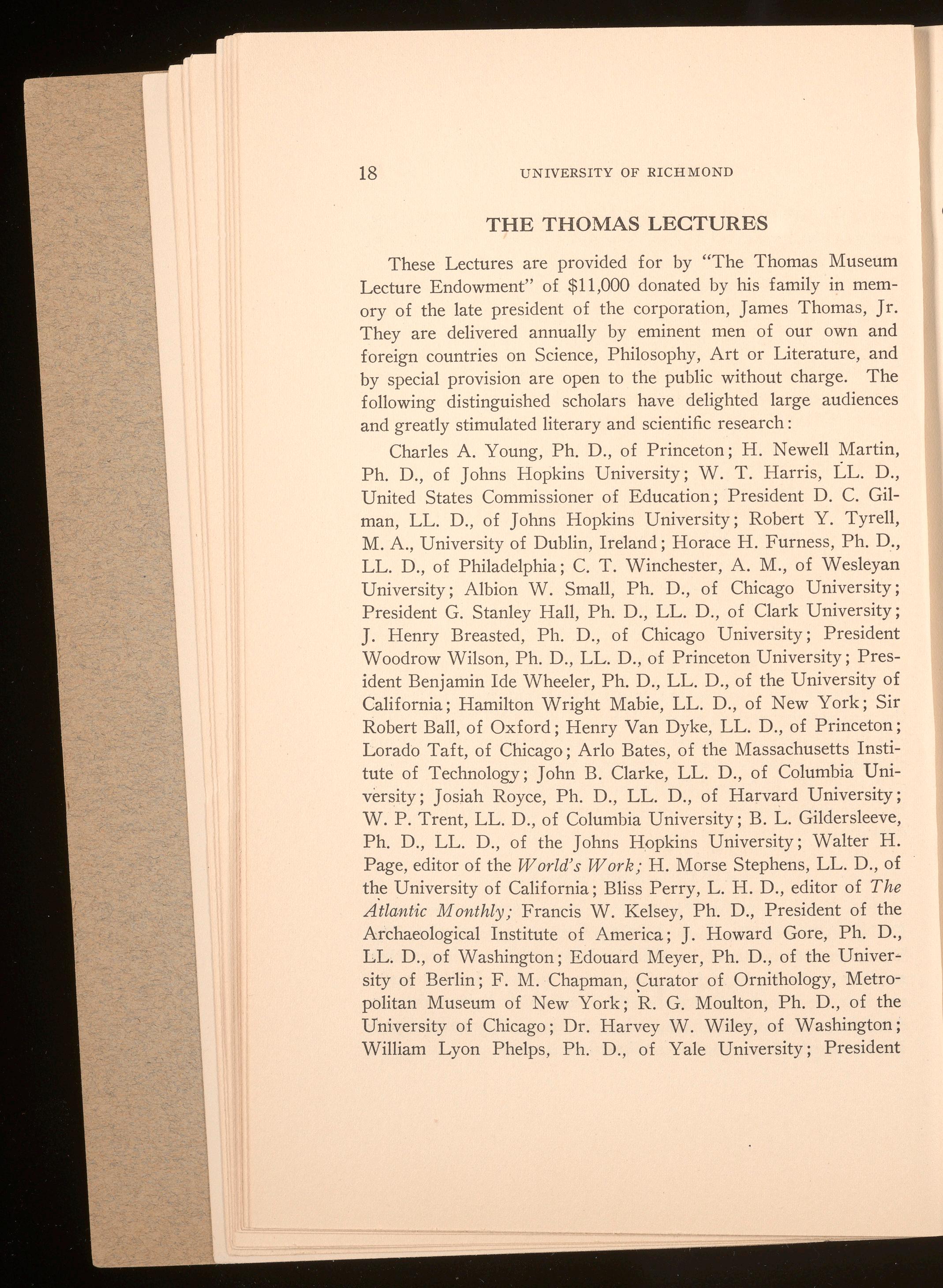
These Lectures are provided for by "The Thomas Museum Lecture Endowment" of $11,000 donated by his family in memory of the late president of the corporation, James Thomas, Jr. They are delivered annually by eminent men of our own and foreign countries on Science, Philosophy, Art or Literature, and by special provision are open to the public without charge. The following distinguished scholars have delighted large audiences and greatly stimulated literary and scientific research: Charles A. Young, Ph.D., of Princeton; H. Newell Martin, Ph. D., of Johns Hopkins University; W. T. Harris, LL. D., United States Commissioner of Education; President D. C. Gilman, LL. D., of Johns Hopkins University; Robert Y. Tyrell, M.A., University of Dublin, Ireland; Horace H. Furness, Ph. D., LL. D., of Philadelphia; C. T. Winchester, A. M., of Wesleyan University; Albion W. Small, Ph. D., of Chicago University; President G. Stanley Hall, Ph. D., LL. D., of Clark University; J. Henry Breasted, Ph. D., of Chicago University; President Woodrow Wilson, Ph.D., LL. D., of Princeton University; President Benjamin Ide Wheeler, Ph. D., LL. D., of the University of California; Hamilton Wright Mabie, LL. D., of New York; Sir Robert Ball, of Oxford; Henry Van Dyke, LL. D., of Princeton; Lorado Taft, of Chicago; Ario Bates, of the Massachusetts Institute of Technology; John B. Clarke, LL. D., of Columbia University; Josiah Royce, Ph. D., LL. D., of Harvard University; W. P. Trent, LL. D., of Columbia University; B. L. Gildersleeve, Ph. D., LL. D., of the Johns Hopkins University; Walter H. Page, editor of the World's Work; H. Morse Stephens, LL. D., of t~e University of California; Bliss Perry, L. H. D., editor of The Atlantic Monthly; Francis W. Kelsey, Ph . D., President of the Archaeological Institute of America; J. Howard Gore, Ph. D., LL. D., of Washington; Edouard Meyer, Ph. D., of the University of Berlin; F. M. Chapman, Curator of Ornithology, Metropolitan Museum of New York; R. G. Moulton, Ph. D., of the University of Chicago; Dr. Harvey W. Wiley, of Washington; William Lyon Phelps, Ph. D., of Yale University; President
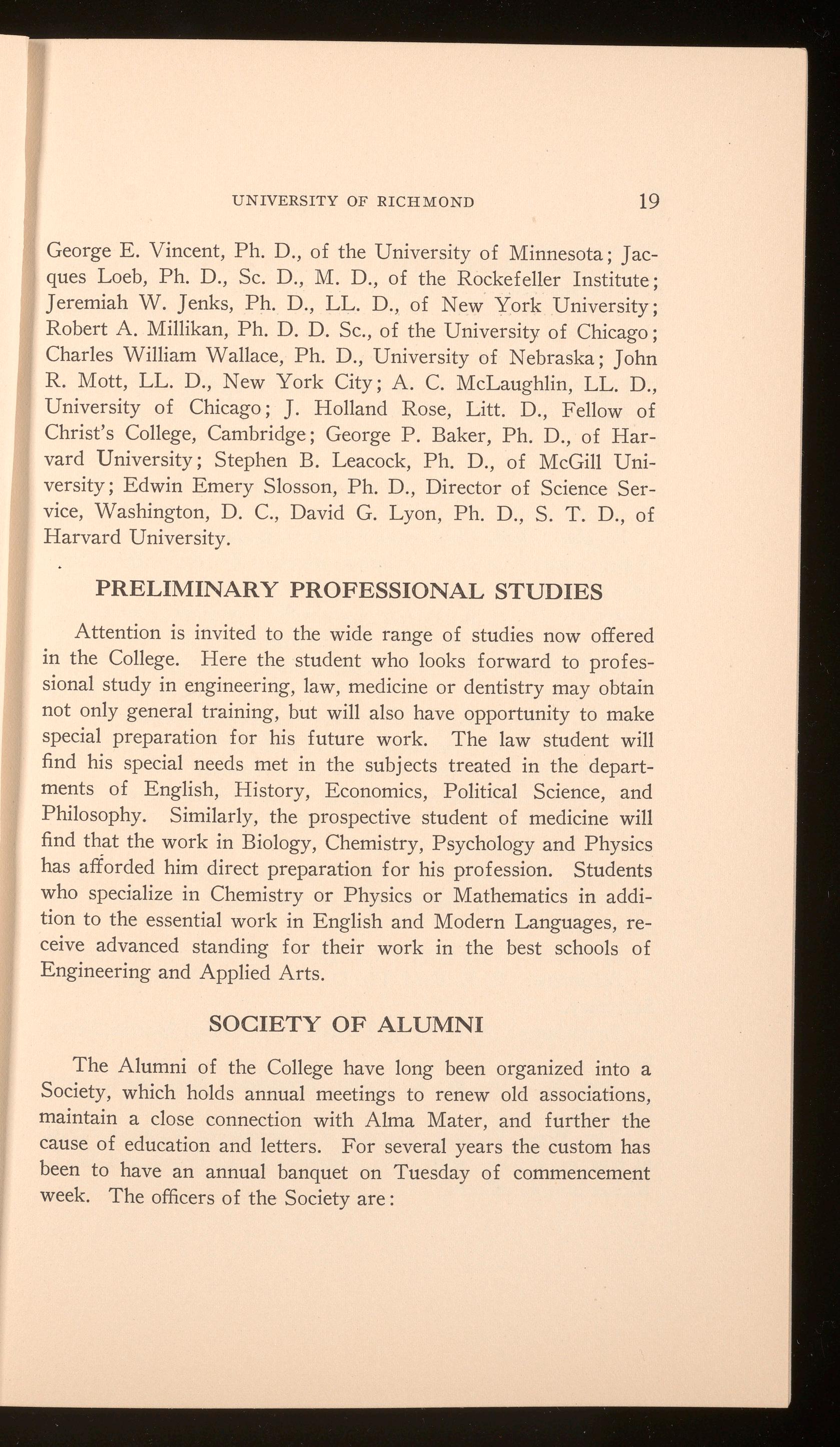
George E. Vincent, Ph.D., of the University of Minnesota; Jacques Loeb, Ph. D., Sc . D., M D., of the Rockefeller Institute; Jeremiah W Jenks, Ph. D., LL. D , of New York University; Robert A. Millikan, Ph. D. D. Sc., of the University of Chicago; Charles William Wallace, Ph. D., University of Nebraska; John R. Mott, LL. D., New York City; A. C. McLaughlin, LL. D., University of Chicago; J Holland Rose, Litt. D., Fellow of Christ's College, Cambridge; George P. Baker, Ph. D., of Harvard University; Stephen B. Leacock, Ph. D., of McGill University; Edwin Emery Slosson, Ph. D., Director of Science Service, Washington, D. C., David G. Lyon, Ph. D., S. T. D., of Harvard University
Attention is invited to the wide range of studies now offered in the College. Here the student who looks forward to professional study in engineering, law , medicine or dentistry may obtain not only general training, but will also have opportunity to make special preparation for his future work. The law student will find his special needs met in the subjects treated in the departments of English, History, Economics, Political Science, and Philosophy. Similarly, the prospective student of medicine will find that the work in Biology, Chemistry, Psychology and Physics has afforded him direct preparation for his profession. Students who specialize in Chemistry or Physics or Mathematics in addition to the essential work in English and Modern Languages, receive advanced standing for their work in the best schools of Engineering and Applied Arts.
The Alumni of the College have long been organized into a Society, which holds annual meetings to renew old associations, maintain a close connection with Alma Mater, and further the cause of education and letters. For several years the custom has been to have an annual banquet on Tuesday of commencement week. The officers of the Society are:

President
M. SMITH, JR First Vice-President
CAMDEN
Third Vice-President W. L. PRINCE
Secrdary
Degree men are members of the Society without election, and all former students are eligible for election. The annual fee is $1.00.
In May, 1898, there was organized in Louisville a -Chapter of the General Society of Alumni, which is known as the "Kentucky Association of Richmond College Alumni." The present officers are Dr. S. E. Woody, Louisville, President; Dr. W. 0. Carver, Louisville, Secretary and Treasurer.
On February, 1899, the alumni resident in Norfolk, Va., and vicinity organized a "Norfolk Chapter of Richmond College Alumni." The chapter holds annual meetings in February. The present officers are Joseph A. Leslie, Nor folk, President; Burnley Lankford, Esq., Norfolk, Secretary and Treasurer.
In April, 1903, there was organized in Newport News, Va., a "Peninsula Chapter of Richmond College Alumni." The chapter holds annual meetings.
During the session of 1905-'06 alumni chapters were organized in Richmond, Baltimore, Lynchburg and Roanoke. The officers are :
Richmond: President, W. T. Luck; secretary, B. W. Mahon. Baltimore: E. E. Reid, Ph. D., President; W. Hugh Bagby, Secretary.
Lynchburg: A. R. Long, President; H. Duval Martin, Secretary.
Roanoke: Dr. W. B. Foster, President; Miss Stella Pace, Secretary.
The West Virginia Chapter was organized October, 1910, at Hinton, W. Va., with J. W. Mitchell, M. L. Wood, and W. L. Richardson as officers.
In May, 1916, a New York Chapter was organized at the Waldorf-Astoria with twenty-nine members. The officers of this chapter are:
JESSE READ TAYLOR .• • President
CHARLES MARSHALL GRAVES
HENRY K. ELLYSON , JR
CuRTIS LEE LAWS ...
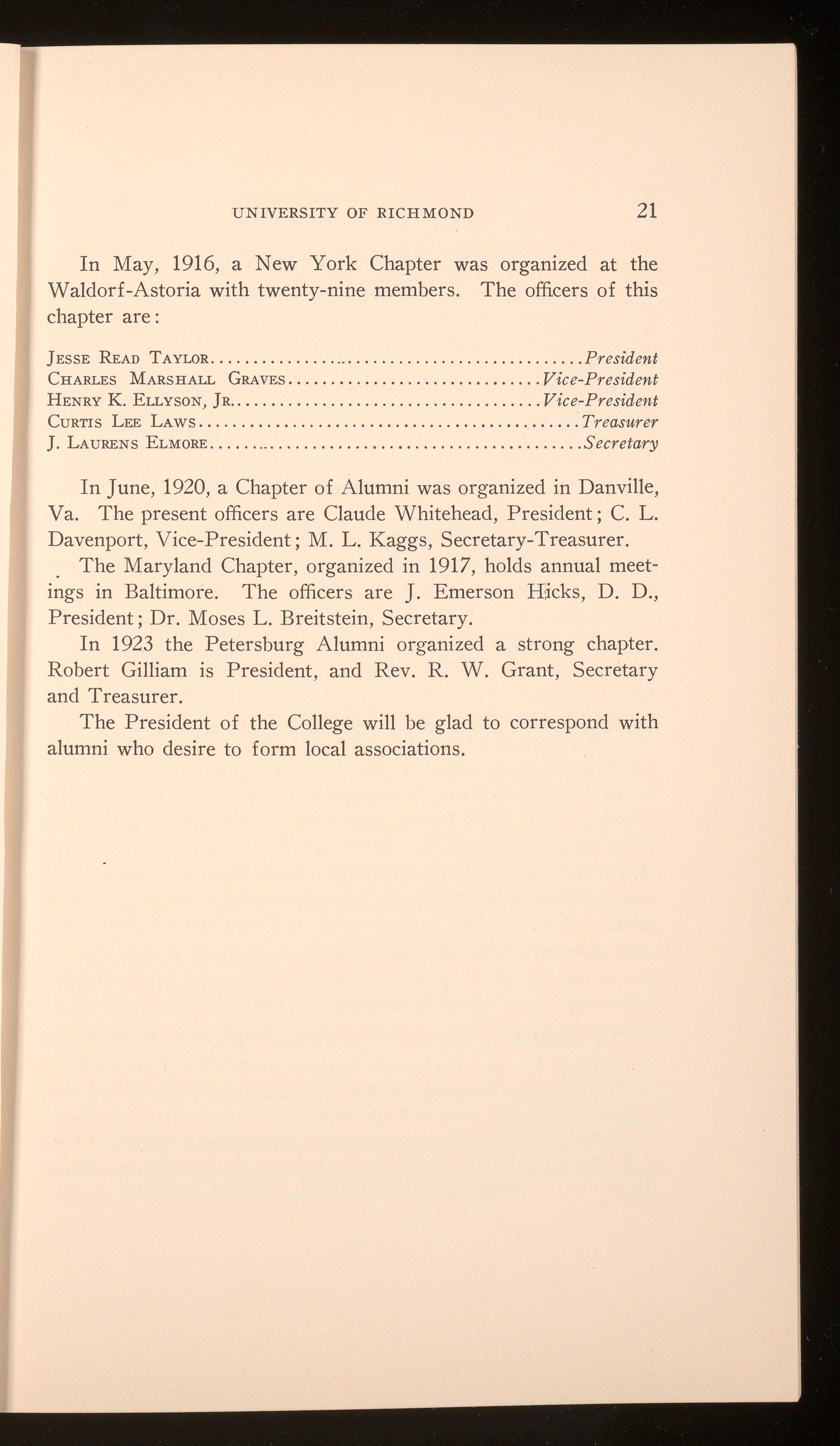
Vice-President
Vice-President
Treasurer J. LAURENS ELMORE
Secretary
In June, 1920, a Chapter of Alumni was organized in Danville, Va. The present officers are Claude Whitehead, President; C. L. Davenport , Vice-President; M. L. Kaggs, Secretary-Treasurer. . The Maryland Chapter, organized in 1917, holds annual meetings in Baltimore. The officers are J. Emerson Hicks, D D., President; Dr. Moses L. Breitstein, Secretary.
In 1923 the Petersburg Alumni organized a strong chapter. Robert Gilliam is President , and Rev. R. W. Grant, Secretary and Treasurer.
The President of the College will be glad to correspond with alumni who desire to form local associations.
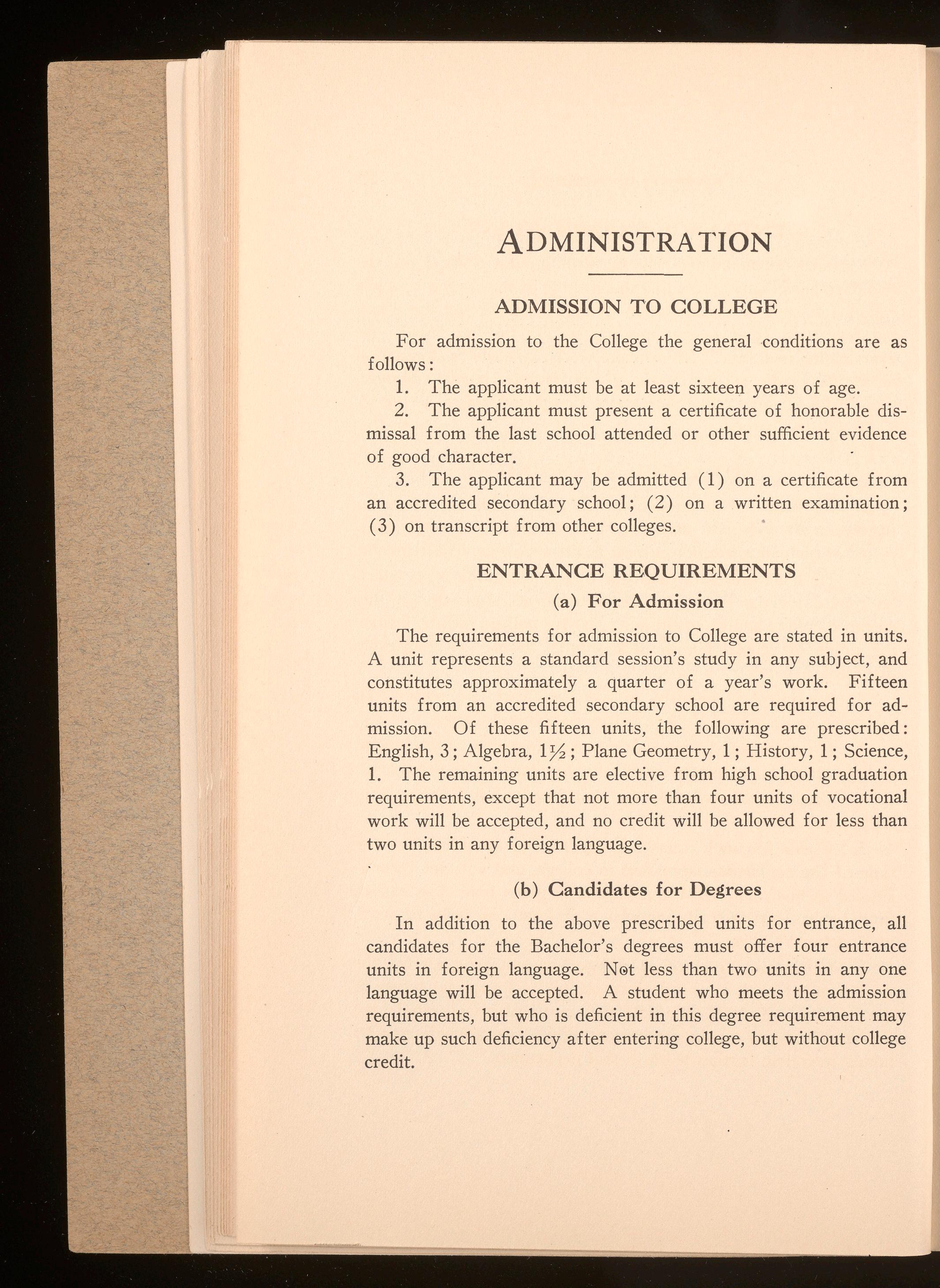
For admission to the College the general conditions are as follows:
1. The applicant must be at least sixteen years of age.
2. The applicant must present a certificate of honorable dismissal from the last school attended or other sufficient evidence of good character.
3. The applicant may be admitted ( 1) on a certificate from an accredited secondary school; (2) on a written examination; ( 3) on transcript from other colleges.
The requirements for admission to College are stated in units. A unit represents a standard session's study in any subject, and constitutes approximately a quarter of a year's work. Fifteen units from an accredited secondary school are required for adm1ss10n. Of these fifteen units, the following are prescribed: English, 3; Algebra, 11/z; Plane Geometry, 1; History, 1; Science, 1. The remaining units are elective from high school graduation requirements, except that not more than four units of vocational work will be accepted, and no credit will be allowed for less than two units in any foreign language.
In addition to the above prescribed units for entrance, all candidates for the Bachelor's degrees must offer four entrance units in foreign language. N0t less than two units in any one language will be accepted. A student who meets the admission requirements, but who is deficient in this degree requirement may make up such deficiency after entering college, but without college credit.

Entrance examinations will be held at the College on the two days immediately preceding the opening of the session. Application for such an examination should be made to the Dean not less than four weeks previous to the time at which the examination is desired. All candidates who take their examination on the days indicated will be charged no fee; for special examinations held on days other than those designated above, a fee of $2.00 will be charged.
A candidate for admission to advanced standing from an institution of collegiate rank may receive credit for work completed at such an institution subject to the following requirements:
1. He must present a catalogue of the institution from which he comes, together with an official certificate showing (a) his entrance credits at that institution; (b) his college record, including grade of scholarship in each subject taken; ( c) honorable dismissal.
2. A student is required to spend at least two sessions in residence in Richmond College before receiving a degree.
3. · He must satisfy the entrance requirements of Richmond College, using his advanced credits for this purpose if necessary.
4. Credit is allowed only for work equivalent to courses in Richmond College.
5. Credit for such courses is regarded as provisional at the time of the applicant's admission to college, and will not be considered as final, nor will the applicant be given final class rating, until he has satisfactorily completed at least one term of work in Richmond College.
6. Certificates from other colleges are not accepted for the final required work in any department except by special action of the Faculty. Students who hold such certificates may satisfy the final requirements of any department either by examination or by taking in course further work in that department.

All academies or high schools listed as accredited by the State Departments of Education of their respective States are recognized by the College as accredited schools. A certificate from the principal of such a school, filled out on the form provided by the College, is accepted as sufficient evidence of the completion of the courses reported therein.
High school students who contemplate entering College should obtain from the College this Certificate of Admission blank, have the same filled out by their principal , and forward it to the Dean during vacation
Matriculation begins Wednesday, September 16th. Classes meet for organization Friday, September 18th. Every applicant for admission, upon arriving at the College, should report promptly at the Dean's office. If he has been a student at any other college, he should present a detailed certificate of work accomplished there, as well as a statement in regard to his character. If he comes from an academy or high school , he should bring with him, in case he has not already sent it, an admission certificate duly filled out and signed by the principal of the school he last attended. Admi ssion certificates should be in the hands of the Dean, for reference to the proper committee, during the summer.
When the question of preparation for college has been settled affirmatively, the student in consultation with the Committee on Courses and Degrees decides upon a course of study and fills out the matriculation card. After this has been approved by the Dean it should be presented to the Treasurer of the College, who, upon the payment of the required fees, will deliver to the student his registration cards and record his name as a regular matriculate.
Students who fail to complete their matriculation by 12 :00 o'clock, noon, of the third day of the session, September the 20th, will be charged an extra fee of $2.00 for delayed matriculation.
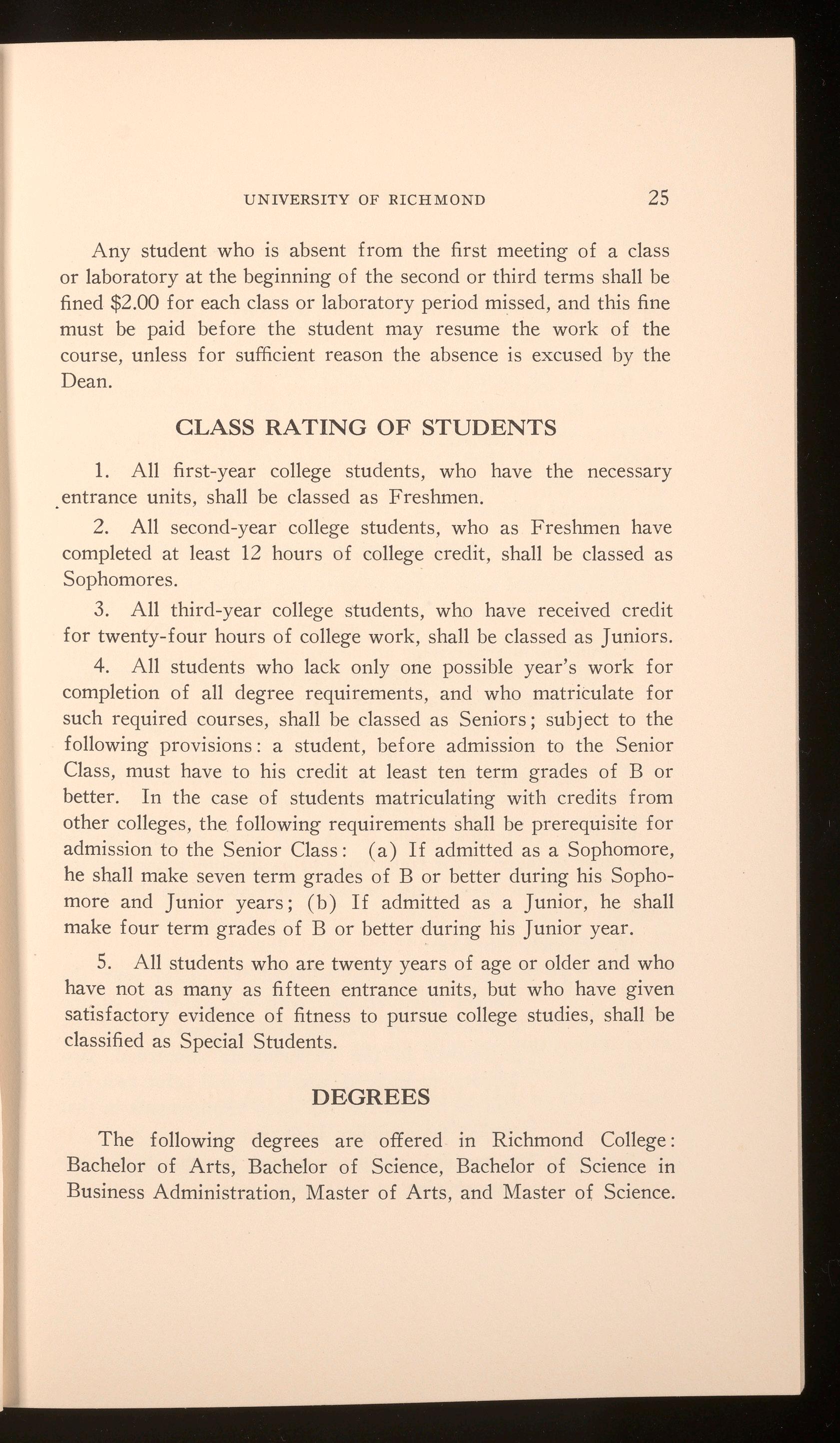
Any student who is absent from the first meeting of a class or laboratory at the beginning of the second or third terms shall be fined $2.00 for each class or laboratory period missed, and this fine must be paid before the student may resume the work of the course, unless for sufficient reason the absence is excused by the Dean.
1. All first-year college students, who have the necessary . entrance units, shall be classed as Freshmen.
2. All second-year college students, who as Freshmen have completed at least 12 hours of college credit, shall be classed as Sophomores.
3. All third-year college students, who have received credit for twenty-four hours of college work, shall be classed as Juniors.
4. All students who lack only one possible year's work for completion of all degree requirements, and who matriculate for such required courses, shall be classed as Seniors; subject to the following provisions : a student, before admission to the Senior Class, must have to his credit at least ten term grades of B or better. In the case of students matriculating with credits from other colleges, the following requirements shall be prerequisite for admission to the Senior Class : (a) If admitted as a Sophomore, he shall make seven term grades of B or better during his Sophomore and Junior years; (b) If admitted as a Junior, he shall make four term grades of B or better during his Junior year.
5. All students who are twenty years of age or older and who have not as many as fifteen entrance units, but who have given satisfactory evidence of fitness to pursue college studies, shall be classified as Special Students.
The following degrees are offered in Richmond College : Bachelor of Arts, Bachelor of Science, Bachelor of Science in Business Administration, Master of Arts, and Master of Science.
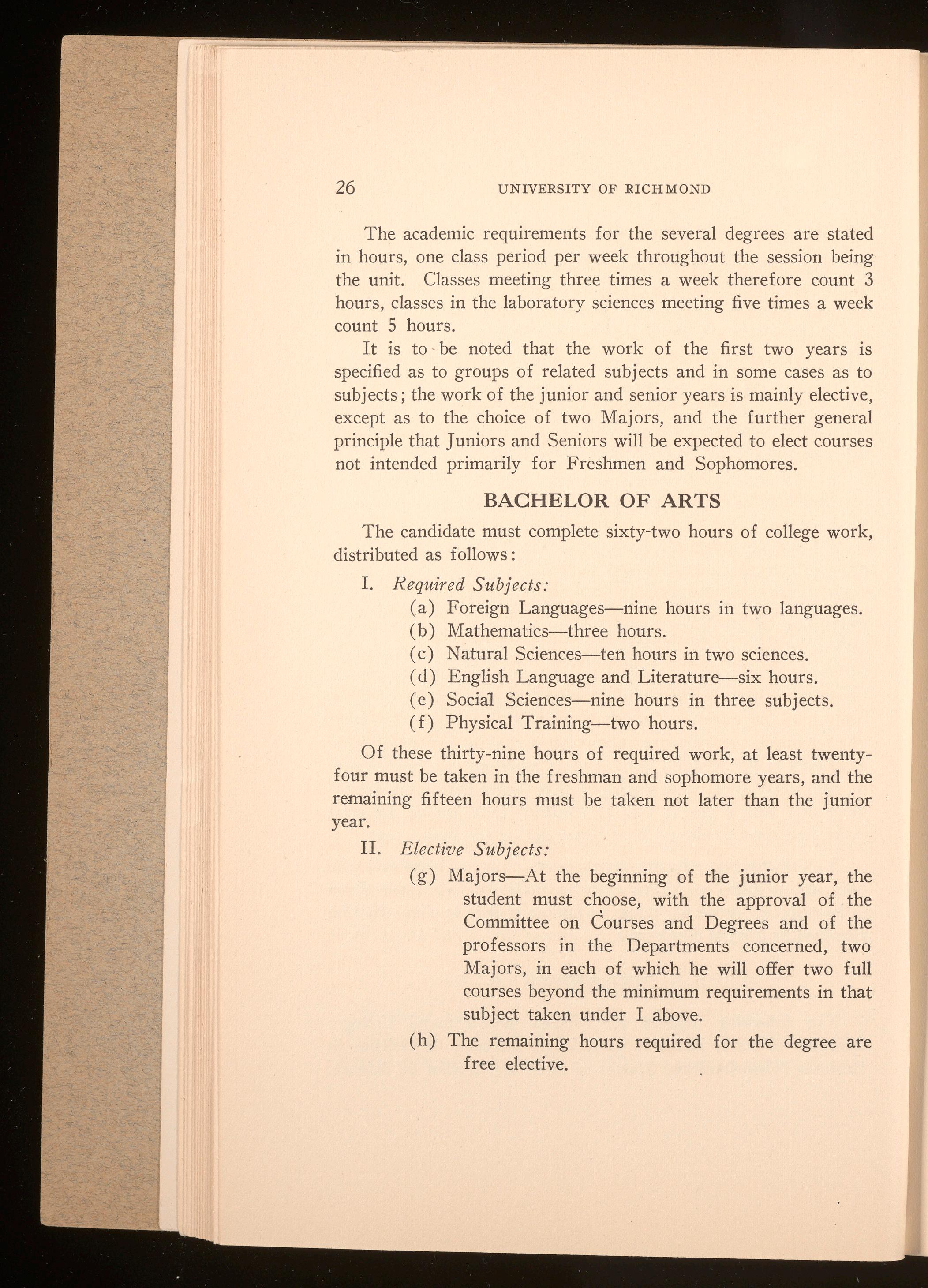
The academic requirements for the several degrees are stated in hours, one class period per week throughout the session being the unit. Classes meeting three times a week therefore count 3 hours, classes in the laboratory sciences meeting five times a week count 5 hours.
It is to - be noted that the work of the first two years is specified as to groups of related subjects and in some cases as to subjects; the work of the junior and senior years is mainly elective, except as to the choice of two Majors, and the further general principle that Juniors and Seniors will be expected to elect courses not intended primarily for Freshmen and Sophomores.
The candidate must complete sixty-two hours of college work, distributed as follows:
I. Required Subjects:
(a) Foreign Languages-nine hours in two languages.
(b) Mathematics-three hours.
( c) Natural Sciences-ten hours in two sciences.
( d) English Language and Literature-six hours.
( e) Socia1 Sciences-nine hours in three subjects.
(f) Physical Training-two hours.
Of these thirty-nine hours of required work, at least twentyfour must be taken in the freshman and sophomore years, and the remaining fifteen hours must be taken not later than the junior year.
II. Elective Subjects:
(g) Majors-At the beginning of the junior year, the student must choose, with the approval of the Committee on Courses and Degrees and of the professors in the Departments concerned, two Majors, in each of which he will offer two full courses beyond the minimum requirements in that subject taken under I above.
(h) The remaining hours required for the degree are free elective.
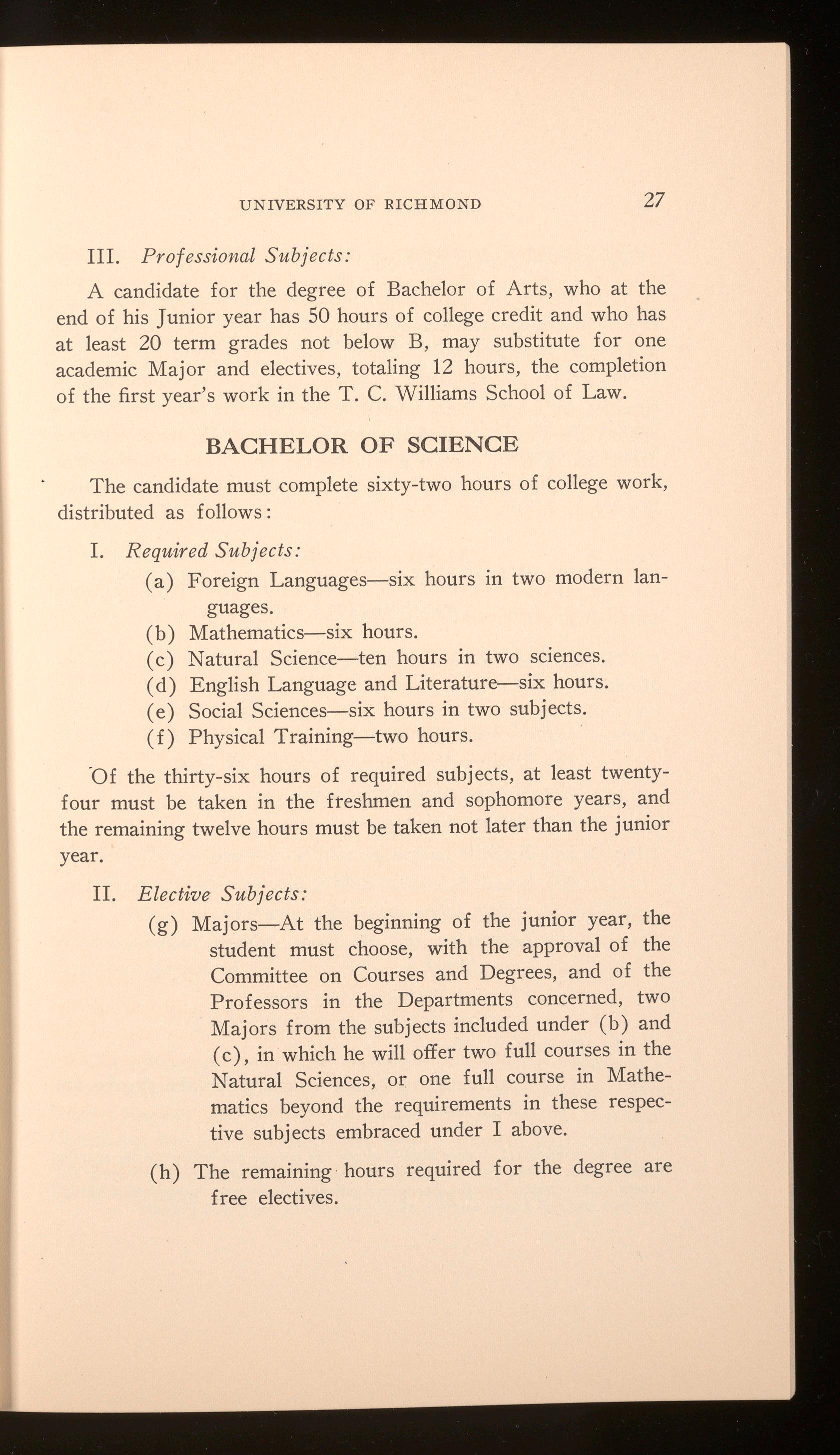
III. Professional Subjects:
A candidate for the degree of Bachelor of Arts, who at the end of his Junior year has SOhours of college credit and who has at least 20 term grades not below B, may substitute for one academic Major and electives, totaling 12 hours, the completion of the first year's work in the T. C. Williams School of Law.
The candidate must complete sixty-two hours of college work, distributed as follows :
I. Required Subjects:
(a) Foreign Languages-six hours in two modern languages.
(b) Mathematics-six hours.
( c) Natural Science-ten hours in two sciences.
( d) English Language and Literature-six hours.
(e) Social Sciences-six hours in two subjects.
( f) Physical Training-two hours.
Of the thirty-six hours of required subjects, at least twentyfour must be taken in the freshmen and sophomore years, and the remaining twelve hours must be taken not later than the junior year.
II. Elective Subjects:
(g) Majors-At the beginning of the junior year, the student must choose, with the approval of the Committee on Courses and Degrees, and of the Professors in the Departments concerned, two Majors from the subjects included under (b) and ( c), in which he will offer two full courses in the Natural Sciences, or one full course in Mathematics beyond the requirements in these respective subjects embraced under I above.
(h) The remaining hours required for the degree are free electives.

III. Professional Subjects:
A candidate for the degree of Bachelor of Science, who at the end of his Junior year has SOhours of college credit and who has at least 20 term grades not below B, may substitute for one academic Major and electives, totaling 12 hours, the completion of the first year's work in a standard School of Medicine* ·or the completion of the first and second years' work in a standard School of Dentistry. He may also substitute for the second course in Mathematics, stipulated above, a course in a third Natural Science.
The candidate must complete sixty-two hours of college work, distributed as follows :
I. Required .Subjects:
(a) Modern Foreign Languages-six hours.
(b) Mathematics-three hours.
( c) Natural Sciences-five hours.
( d) English Language and Literature-six hours.
( e) Social Sciences-nine hours in other Departments than those included under ( f) .
( f) Economics and Business Administration-twentyone hours.
(g) Physical Training-two hours.
II. Elective Subjects:
(h) The remaining hours required for the degree are free electives.
*The premedical student should shape his cours.e according to the specific requirements of the medical school for which he is preparing. Among the recent requirements of the stronger medical schools are Analytical Chemistry, two units of Latin, and the ability to read German and French.

I. The candidate must previously have graduated from a standard college on a course of study substantially equivalent in extent and thoroughness to the requirements for the B. A. and B. S. degrees in the University of Richmond.
II. Candidates for graduate degrees must make application to • the Committee on Graduate Studies and secure the approval of this committee in order to be admitted as a student of this institution.
III. The course of study required for the degree of Master of Arts shall be:
(A) One major subject carrying a credit of. .......... 5 hours
(B) One minor subject carrying a credit of. .......... .4 hours
( C) Two courses intended for Juniors and Seniors ..... 6 hours
Of the 15 hours required for the Master of Arts degree the first 9 hours, namely the Major and Minor subjects, must be chosen from the graduate courses in the departments mentioned above, and should be in two departments closely allied to each other.
IV. The requirements for the degree of Master of Science shall be the same as those for the degree of Master of Arts, with the additional restriction that the Major and Minor courses must be taken in Science and Mathematics.
V. While due regard will be paid to the needs and preferences of the individual student, the course of study in every case must have the approval of the Committee on Graduate Studies.
The following courses are suggested to students contemplating the study of Pharmacy: Physics, five hours; Biology, five hours ; English, six hours; Mathematics, three hours; General Chemistry, five hours; Quanitative and Qualitative Analysis, five hours; electives from these or other approved subjects, six hours. By arrangement with the School of Pharmacy, Medical College

of Virginia, the student who has passed the courses indicated, and has completed two years of work in the School of Pharmacy, may receive from the Medical College of Virginia the degree of Bachelor of Science in Pharmacy.
The deportment of a Christian gentleman is the standard to which every student is expected to conform. All appropriate means are used to develop and confirm a sense of personal honor and sacred regard for truth, as upon these rests the best reliance for good conduct. A few plain and reasonable rules are prescribed, and each matriculate must pledge himself to obey them.
1. Occupants of rooms will be held responsible for the good order of their rooms, as well as for any damage or defacement they may sustain. Changes from one room to another may be allowed by the Dean , but must not be made without his previous consent
2. A resident student desiring to leave the premises during the hours when, by the schedule of recitation, he should be in his classes, shall get permission from the Dean. Any student desiring to be absent from college must get the Dean's permit in writing and exhibit to each of his professors.
3
. If a student destroy, deface, or in any way damage college property, or aid and abet others in so doing, he shall, within twenty-four hours report the fact to the Dean. Students will be charged pro rata for all damages not individually accounted for.
4. No clubs or societies shall be formed unless the Faculty, on application made, approve the design of such association, the rules by which it proposes to be governed, and the hours of meeting.
5. Resident students desiring to board elsewhere than on the college premises must first obtain the approval of the Dean. No boarding houses can be approved whose meal hours do not conform to the college schedule.

In the observance of these rules and in all matters not specially mentioned, the deportment of a gentleman and a student is the standard to which every one is expected to conform. His sense of honor is the main reliance, and his word in matters touching his own conduct will be called for at the discretion of the Dean or President. In matriculating students, the right is reserved to .require the immediate withdrawal from college of any student whenever the faculty decides that such action is desirable.
No credit will be given for a course if the student has been absent more than three times during a term except (I) that four additional absences will be allowed if such absences are due to the students being away from the college in some representative capacity and (2) that absences due to sickness will be excused upon presentation of a physician's certificate. In all cases of absence for any cause whatsoever, a student will be held responsible for the worli of the class which is gone over in his absence, and may be required to take special examination on such work. Students are warned not to be absent from class except in case of real emergency. A student who absents himself for trivial reasons in the early part of the term may have such emergencies later which will cause him to lose credit for the course.
A student is required to take at least twelve hours of scholastic work each week, and is not allowed to take more than eighteen hours. Under exceptional circumstances, this limitation may be removed with the permission of the Dean.
If a student desires to make a change in his course of study he should make his application in person to the Dean, who will advise him in the matter. No student is permitted either to drop a study or to take up a study without the advice and approval of the Dean.
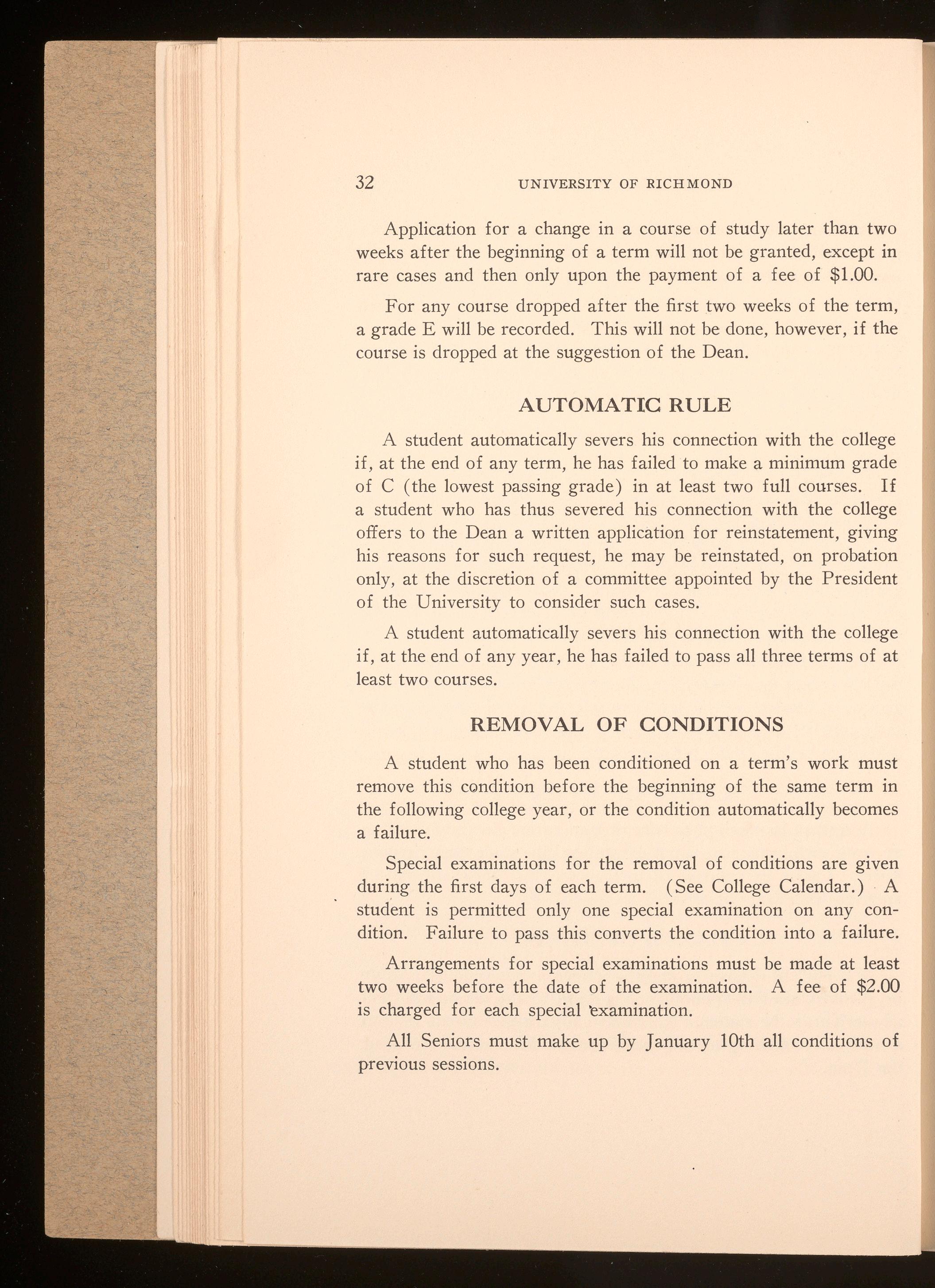
Application for a change in a course of study later than two weeks after the beginning of a term will not be granted, except in rare cases and then only upon the payment of a fee of $1.00.
For any course dropped after the first two weeks of the term, a grade E will be recorded. This will not be done, however, if the course is dropped at the suggestion of the Dean.
A student automatically severs his connection with the college if, at the end of any term, he has failed to make a minimum grade of C ( the lowest passing grade) in at least two full courses. If a student who has thus severed his connection with the college offers to the Dean a written application for reinstatement, giving his reasons for such request, he may be reinstated, on probation only, at the discretion of a committee appointed by the President of the University to consider such cases.
A student automatically severs his connection with the college if, at the end of any year, he has failed to pass all three terms of at least two courses.
A student who has been conditioned on a term's work must remove this condition before the beginning of the same term in the following college year, or the condition automatically becomes a failure.
Special examinations for the removal of conditions are given during the first days of each term. ( See College Calendar.) A student is permitted only one special examination on any condition. Failure to pass this converts the condition into a failure.
Arrangements for special examinations must be made at least two weeks before the date of the examination. A fee of $2.00 is charged for each special 'examination.
All Seniors must make up by January 10th all conditions of previous sessions.

A Senior may not make up by an examination a deficiency on more than one subject taken in the Senior year, and this examination may not be given until the end of the third term.
If, at the end of the fall or winter term, a Senior has been conditioned on as many as two subjects, he can not remain a member of the Senior Class without special action of the Faculty.
To the parent or guardian is sent, at the end of each of the three terms, a record of the student's class and examination standing, with such other information as may be deemed important. Whenever it may seem desirable more frequent reports · are sent. By prompt and judicious attention on the part of those to whom they are addressed, these reports may be made of great value in promoting improvement and sustaining a just discipline.
The standing of students in classes and in examination is indicated as follows : Students making a passing grade in any study are divided into three groups, designated by the letters, A, B, C, respectively. The letter A opposite a student's name indicates that his work for the term, including examination, has been of excellent quality (95-100%); B, that it has been good (85-94%); C, that it has been of passing grade, ( 75-84 % ) ; D, ( 65-7 4 % ) , indicates that his work has been unsatisfactory, and that he is conditioned on the subject for the term. In some subjects the student may remove such condition by good work in the other two terms. Grade E indicates failure.
Besides frequent oral and written tests, there are held in every class three general written examinations at the close of the fall, winter, and spring terms, respectively. Recitations and lectures are suspended during the examination period. The valuation of examination papers is equitably combined with the average of the student's class standing for the term. If this average is of C grade or higher, the student receives credit; if the average is of A or B

grade, the student passes with distinction. A condition ( D) may be removed by special examination.
All candidates for College honors of any kind are expected to maintain at least the grade of C in their classes. This grade is expected of every student who wishes to appear before the public in a representative capacity.
Scholarships established in Richmond Colleg e shall be used under the following regulations :
1. A major scholarship becomes available for use when not less than two thousand five hundred dollars has been paid into the College treasury.
2. Scholarships established since January 1, 1908, are open to use in either Richmond or Westhampton Colleges.
3. A major scholarship pays the annual tuition of the holder. This fee is at present one hundred and twenty-five dollars , which is therefore the present annual value of a scholarship.
4. Recipients of scholarships must meet the usual entrance requirements that are demanded of students who pay tuition.
5. Donors· of scholarships who wish to nominate students to receive the benefit of their scholarships are informed that it is a rule of the College to make its appointment for one year at a time, and then repeat the appointment as often as may be needful and desirable
6. Donors of scholarships are requested to nominate beneficiaries by July 1st preceding the opening of the session when the scholarship is to be used, and to notify the President of the College of the nomination. If the donor has reported no nomination by September 1st, the College will appoint a beneficiary for the current session.

7. It is sometimes desirable to divide a scholarship and to appoint two persons each to enjoy the benefits of a minor scholarship. In such case the holder of a minor scholarship pays half of the tuition fee, or $31.25 for each half session.
8. Reports of students' class and examination standing are mailed at regular intervals to parents or guardians, and a transcript of a beneficiary's report will be mailed to the donor of a scholarship, provided request is made at the Dean's office.
The committee in charge has general instruction , in making award of all Aid Funds, to give the preference:
I. To applicants already at College, who have maintained a · good standing, both in character and study.
II. To other fully prepared applicants who shall present satisfactory testimonials from the school last attended, or from other persons who have had opportunity to judge, certifying to health, attainments, habits of study and moral character.
III. To those of either class who give reasonable assurance that they will complete a course of study leading to one of the degrees of the College
The recipients of aid are expected to prove, as students, not only above censure in all respects, but actively helpful to the College by example and by earnest work.
1. The President of the University has general oversight and control of athletics, and is authorized to forbid any features in these exercises which endanger the health or morals of the participants.
2. Each team is allowed four trips from College, provided that these four trips do not involve being away from College more than seven days, and that no one trip shall require more than

three days' absence from College duties. At least one day before the departure of any team the coach, through the manager, must furnish the Dean of the College a list of the men who will compose the team. All proposed games must have the approval of the President before engagements are made.
3. Athletic teams are permitted to engage in contests away from Richmond only with >teams from other institutions of learning.
Richmond College holds membership in the Virginia-North Carolina Inter-Collegiate Athletic Conference, and members of all teams are expected to conform to the following by-laws of the Conference :
Section l. No student shall play in this Conference who is not bona fide. A bona fide student is one who is regularly pursuing a course of at least twelve hours of work per week in the college at which he is matriculated, and who shall have offered for college entrance at least fifteen Carnegie units made up from those subjects announced in the current catalogue of the college at which the student is matriculated as accepted for entrance.
Section 2. No student who has attended any standard college for any part of any session, and thereafter enters a college of this Conference, shall be eligible for participation in intercollegiate athletics until he has been in residence one college year. A college year shall be construed to mean enrollment as a bona fide student for twelve consecutive months beginning with the date of his matriculation.
Section 3. No student shall play in this Conference during the college year unless he has matriculated for the current session on or before October 1st. No student returning to a college from which he has withdrawn may participate in athletic contests until he has completed a college year from the date of his withdrawal.
Section 4. No student shall play in this Conference who has participated in intercollegiate contests for four college years, irrespective of the branch of sport.
Section 5. No student shall play in this Conference who has participated in part of a baseball game as a member of a team in organized baseball. Organized baseball shall be construed to mean the leagues classified as Majors, Class AA, Class A, Class B, Class C and Class D of the National Association of Professional Baseball Clubs.
Section 6. No student shaH play in this Conference who receives from other than those on whom he is naturally dependent for financial support money, or the equivalent of money, such as board and lodgings, etc., unless the source and character of these gifts or payments to him shall
be approved by the President of this Conference. This shall not apply in the matter of tuition scholarships.
Section 7. No student shall be eligible for a college team unless he is in good scholastic standing at his college, as determined by the faculty of that institution.
Section 8. No student shall be eligible for membership on any college team who has lost his class standing (nine college hours for Freshmen, twelve for Sophomores and Juniors) because of deficiency in Scholarship or because of college discipline, until after one year from the time at which he lost his class standing, unless in the meantime he shall have been restored to his former class standing by action of his college faculty.
Section 9. In all games played by teams representing colleges in this Conference the foregoing eligibility rules shall be binding, whether the opposing teams represent colleges in the Conference or not.

It will be noticed that the first five items are the same for all students. Other expenses vary according to taste and financial ability of students.
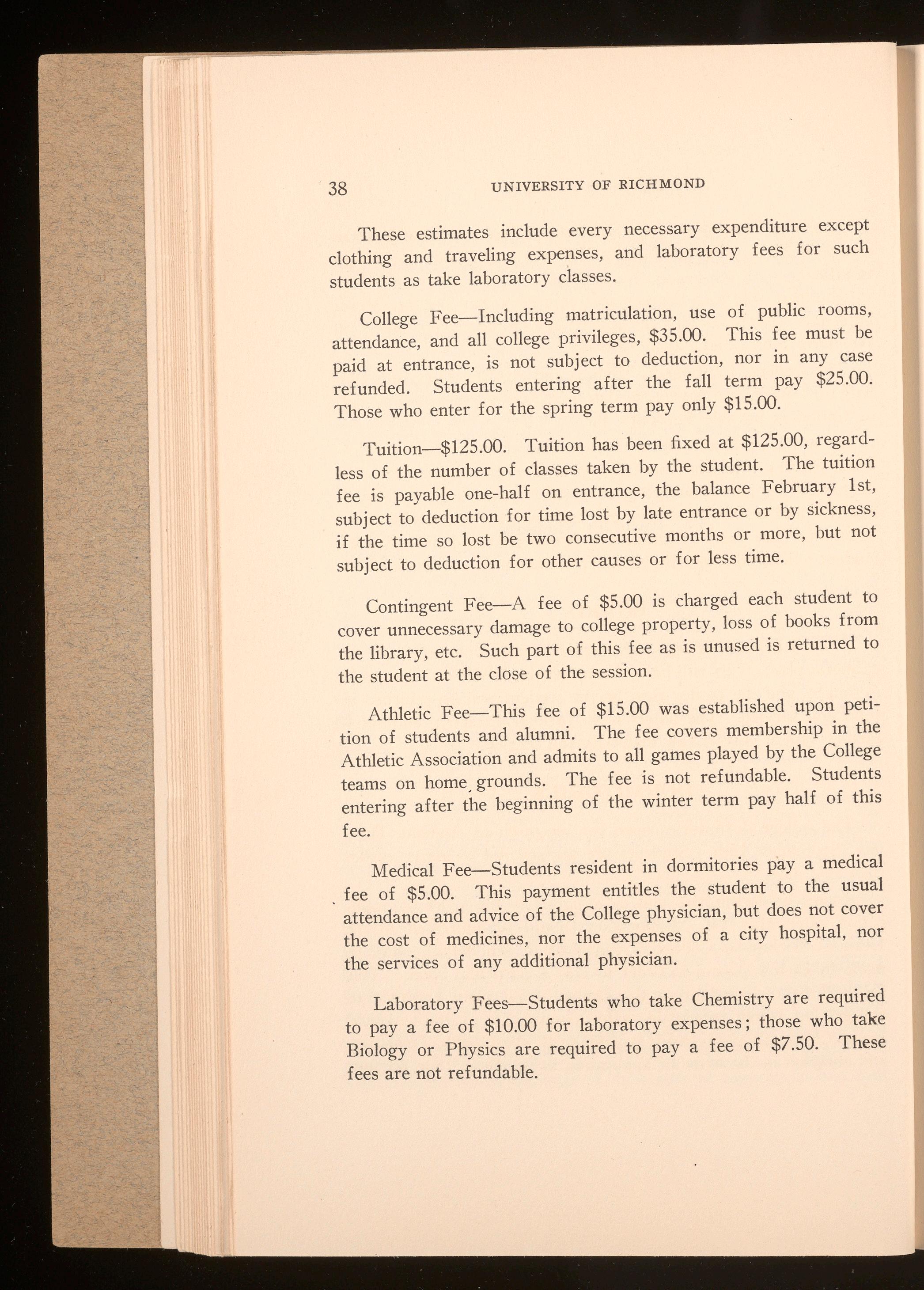
These estimates include every necessary expenditure except clothing and traveling expenses, and laboratory fees for such students as take laboratory classes.
College Fee-Including matriculation, use of public rooms, attendance, and all college privileges, $35.00. This fee must be paid at entrance, is not subject to deduction, nor in any case refunded. Students entering after the fall term pay $25.00. Those who enter for the spring term pay only $15.00.
Tuition-$125.00. Tuition has been fixed at $125.00, regardless of the number of classes taken by the student. The tuition fee is payable one-half on entrance, the balance February 1st, subject to deduction for time lost by late entrance or by sickness, if the time so lost be two consecutive months or more, but not subject to deduction for other causes or for less time.
Contingent Fee-A fee of $5.00 is charged each student to cover unnecessary damage to college property, loss of books from the library, etc. Such part of this fee as is unused is returned to the student at the close of the session.
Athletic Fee-This fee of $15.00 was established upon petition of students and alumni. The fee covers membership in the Athletic Association and admits to all games played by the College teams on home_ grounds. The fee is not refundable. Students entering after the beginning of the winter term pay half of this fee.
Medical Fee-Students resident in dormitories pay a medical . fee of $5.00. This payment entitles the student to the usual attendance and advice of the College physician, but does not cover the cost of medicines, nor the expenses of a city hospital, nor the services of any additional physician.
Laboratory Fees-Students who take Chemistry are required to pay a fee of $10.00 for laboratory expenses; those who take Biology or Physics are required to pay a fee of $7 50. These fees are not refundable.

Diploma Fees-For every Bachelor's Diploma awarded, the charge is $5.00. For a Master's Diploma and Hood, the charge is $10.00.
Students who take degrees are required to pay for the Degree Diplomas. No honors are announced at Commencement unless all fees have been satisfactorily settled.
The College, Contingent, Medical and Athletic Fees, and onehalf of Tuition, are payable at date of entrance. The second half of tuition is payable February 1st.
In order to finance in a business-like manner their publica• tions, literary societies, and other general organizations, the students have adopted a budget to cover all expenses of these organ. izations, and to this fund they ask each student to contribute ten dollars for the year. This money is collected and disbursed by student officials through the Student Government Association.
Since 1919 the College refectory has been conducted on the cafeteria plan. This will be continued during 1925-'26. No profit is sought, and the money paid by the student will be returned in food and service. The object is to furnish attractive and satisfactory fare at cost of raw materials and service.
The college dormitories open for reception of students Tuesday, September 15th. Students are advised not to arrive earlier than this date.
Rooms in dormitories will be assigned in the order of application after May 1st. Application should be addressed to the Dean of Richmond College. A deposit of ten dollars must be made by each applicant in order to hold a particular room. This fee will be deducted from the student's bill upon entrance to college, but is not refundable after August 1st of the sessional year. Checks should be made payable to B. West Tabb, Treasurer, and enclosed in the letter of application to the Dean. On account

of the increase in attendance it is important that students who wish to live in the dormitories make early application for rooms.
Students furnish their own rooms. A limited supply of second hand furniture is offered for sale at the college by the Y. M. C. A. The Y. M. C. A. will also undertake to secure the lowest rates on complete outfits of furniture from city merchants, so that new students can purchase promptly and with little inconvenience. Small articles such as pillows, blankets, sheets and towels should be brought from home. Single iron bedsteads are used.
The prices below include the rent of room for nine months, light, heat, water and servant's attendance. Dormitories are closed for repairs during the Christmas and Spring vacation. All rooms are provided with wardrobe closets, built into the wall. It is understood that a single occupant of any room intended for two students shall be responsible for the full rent of the room. In case two students are permitted to occupy a room intended for one student, or three a room for two students, the minimum charge for each occupant is fifty dollars. No student is allowed to sub-let his room, take another student in with him, or move from one room to another without permission from the Dean.
Room rent for the nine months varies from $50 to $60 for each of the two occupants in a double, and from $50 to $70 for a single room.
Ministers of the Gospel of all denominations, and young men duly approved by their churches as candidates for the ministry, are admitted free of charge f~r tuition. They pay all other fees.
The Education Board of the Virginia Baptist General Association will render further assistance to worthy young men recommended by churches which contribute to the Board, and accepted after examination. For further information on this matter ad-

dress Mr. Frank T. Crump, Corresponding Secretary, Education Board, Law Building, Richmond, Va.
Students need not keep money about their persons or in their rooms , but may, without expense, deposit it for safe-keeping with an officer of the College. Some students open an account with one of the city banks, and this plan is strongly commended by the College authorities.

BIBLICAL HISTORY AND LITERATURE
ASSOCIATE PROFESSOR WILLINGHAM
The aim of these courses is to put the student into possession of a first-hand working knowledge of the Bible, and to create an interest in Biblical and religious study, thus opening the way for a permanent interest in the prosecution of these vital themes. The Bible text is used as the basis for class work and discussion.
1. OLD TESTAMENT HISTORY AND LITERATURE:
(a) History of the Hebrews to the Disruption of the Kingdom; the origin of the Hebrews, their relation to other Semitic peoples, their early religious and political institutions ; and the character and contents of the historical books.
(
b) History of the Hebrews from the Disruption of the Kingdom to the Restoration; the relation of the Hebrews to other nations of the period; and the rise and development of prophecy.
( c) History of the Restoration and subsequent times ; the Hebrew Wisdom Literature as seen in Job, Proverbs and Ecclesiastes. The rise, development, and final forms of lyric poetry among the Hebrews, with studies of representative foi;ms.
Three hours a week. Credit, three hours.
2. NEW TESTAMENT HISTORY AND LITERATURE:
(a) A brief survey of the Persian, Greek. Jewish, and Roman ages; the world into which Jesus came; currents of life and thought; the social, ethical, and religious conditions, and preparations for Christianity.

(
b) An historical and synoptic study of the life of Jesus; topical studies of various phases of Jesus' teachings, together with their social and ethical implications with reference to problems of to-day.
( c) Study of the thought and life of the Apostolic Age as presented or reflected in the book of Acts and the Epistles; Paul's life and letters, and his influence upon his times; and the development of early Christian institutions and customs.
Three hours a week. Credit, three hours.
3. MODERN CHURCH PROBLEMS:
(a) Problems of education in the local church including the principles and ideals of the Sunday school and also the co-ordination and unification of all the teaching and training activities of the church as a whole.
( b) A study of modern church management with a discussion of the principles of efficient organization and their application to churches of various types.
( c) A brief study of the social principles of Jesus with application to the responsibilities of the church to the community and to the task of world evangelization.
Three hours a week. Credit, three hours.
PROFESSOR HAYDEN
PROFESSOR MERRIMAN
1. ELEMENTARY BIOLOGY:
(a) General Botany ( first part). A study of plant cells and protoplasm, and of a series of representative plant types.
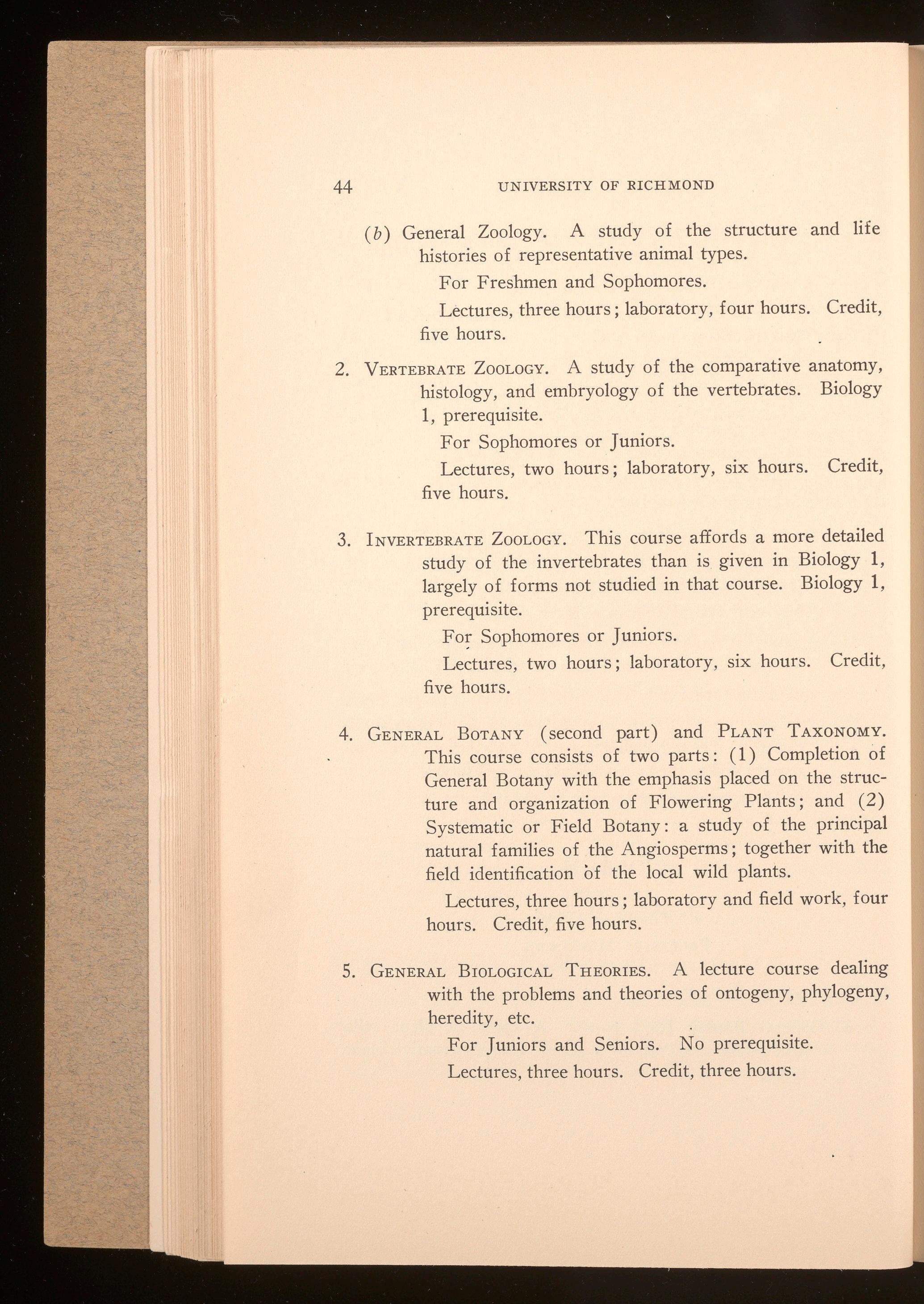
( b) General Zoology. A study of the structure and life histories of representative animal types.
For Freshmen and Sophomores.
Lectures, three hours; laboratory, four hours. Credit, five hours.
2. VERTEBRATEZooLOGY. A study of the comparative anatomy, histology, and embryology of the vertebrates. Biology 1, prerequisite.
For Sophomores or Juniors.
Lectures, two hours; laboratory, six hours. Credit, five hours.
3. INVERTEBRATEZooLOGY. This course affords a more detailed study of the invertebrates than is given in Biology 1, largely of forms not studied in that course. Biology 1, prerequisite.
Fo: Sophomores or Juniors.
Lectures, two hours; laboratory, six hours. Credit, five hours.
4. GENERAL BOTANY (second part) and PLANT TAXONOMY. This course consists of two parts : ( 1) Completion of General Botany with the emphasis placed on the structure and organization of Flowering Plants; and (2) Systematic or Field Botany: a study of the principal natural families of the Angiosperms; together with the field identification of the local wild plants.
Lectures, three hours; laboratory and field work, four hours. Credit, five hours.
5. GENERALBIOLOGICALTHEORIES. A lecture course dealing with the problems and theories of ontogeny, phylogeny, heredity, etc.
For Juniors and Seniors. No prerequisite.
Lectures, three hours. Credit, three hours.
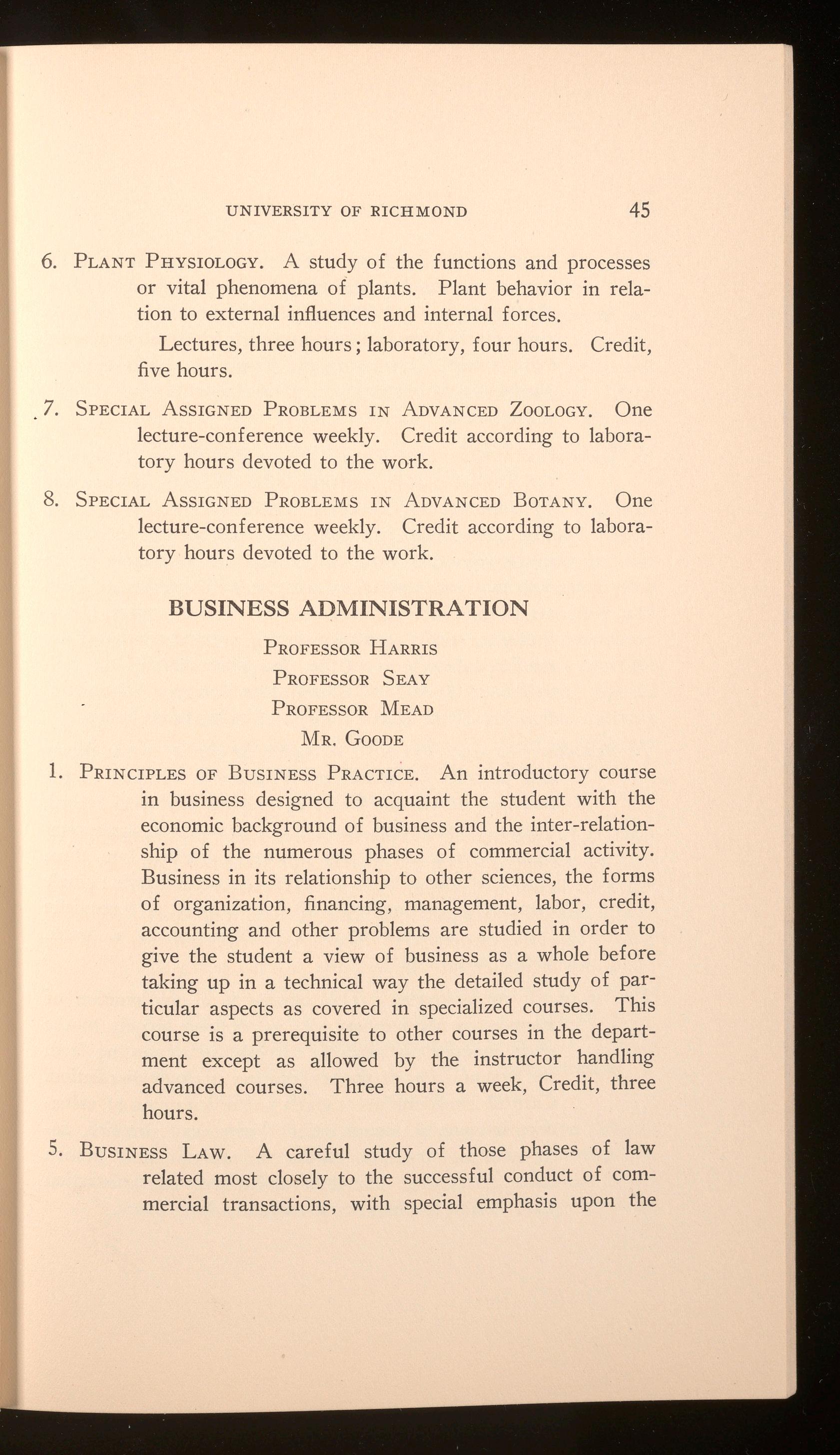
PLANT PHYSIOLOGY. A study of the functions and processes or vital phenomena of plants. Plant behavior in relation to external influences and internal forces.
Lectures, three hours; laboratory, four hours. Credit, five hours.
7. SPECIAL ASSIGNEDPROBLEMSIN ADVANCEDZooLOGY. One lecture-conference weekly. Credit according to laboratory hours devoted to the work.
8. SPECIAL ASSIGNEDPROBLEMSIN ADVANCEDBOTANY. One lecture-conference weekly. Credit according to laboratory hours devoted to the work.
PROFESSORHARRIS
PROFESSORSEAY
PROFESSORMEAD
MR. GooDE
1. PRINCIPLES OF BUSINESS PRACTICE. An introductory course in business designed to acquaint the student with the economic background of business and the inter-relationship of the numerous phases of commercial activity. Business in its relationship to other sciences, the forms of organization, financing, management, labor, credit, accounting and other problems are studied in order to give the student a view of business as a whole before taking up in a technical way the detailed study of particular aspects as covered in specialized courses. This course is a prerequisite to other courses in the department except as allowed by the instructor handling advanced courses. Three hours a week, Credit, three hours.
5. BUSINESS LAw. A careful study of those phases of law related most closely to the successful conduct of commercial transactions, with special emphasis upon the
6.

principles of contracts, agency, sales, negotiable instruments, partnership and corporation law, and carriers. Attention is given throughout the course to business papers and forms common to each kind of corpmercial relationship. Not open to Freshmen. Prerequisite, Business Administration 1. Three hours a week. Credit, three hours.
study of the transportation problem of the United States, starting with the early history and development and carrying it through the present era. The course deals primarily with railroad transportation, taking up other forms of transportation largely in the way they supplement or compete with railroads. Railroad capitalization, inter-railroad relations, rates, classifications, carrier contracts and government control are studied carefully from the viewpoints both of the railroads and the public. Prerequisite Business Administration 1. Three hours a week. Credit, three hours.
7. ELEMENTARYAccouNTING. A beginning course in the theory and practice of accounts. Practice is devoted to the handling of various books of original and final record, financial statements, their construction and interpretation. The work of the course is divided into three phases as it applies to the forms of organization : single ownership, partnership and corporation. Prerequisite Business Administration 1. Three hours a week. Credit, three hours.
8. ADVANCEDAccouNTING. This course is a continuation of Elementary Accounting. It is confined largely to the more complex problems of corporation accounting from the organization of the corporation through dissolution. Careful consideration is given tq the questions of valuation in general, depreciation theory and practice, receiverships, financial statement, analysis and branch house accounting. Prerequisite, Business Administration 1, 7. Three hours a week. Credit, three hours.
9.

THIRD YEAR AccOUNTING. A continuation course for those who expect to follow the accounting profession. The course is confined largely to the study of special accounting problems as met in particular fields of business and public administration. Part of the session will be devoted to the subject of cost accounting. Open only to Juniors and Seniors. Prerequisite, Business Administration 1, 5, 7 and 8. Economics 1 and 2. Three hours a week. Credit, three hours.
10. EcoNOMIC GEOGRAPHYAND FOREIGNTRADE. The first half of the year is devoted to Economic Geography. Here a study is made of the basic materials entering into our economic life. Emphasis is placed on the relationship of natural environment to economic development and the place of the basic commodities in world commerce. The second half of the year is devoted to a practical study of the foreign trade of the United States. Special attention is here given to the organization for overseas trade and to the peculiar conditions affecting different markets. Prerequisite, Business Administration 1, Economic 1. Three hours a week. Credit, three hours.
11. MARKETING. This course covers the general field of marketing, including the advertising and distribution of economic goods. The various methods of distribution are taken up separately, such as wholesale, retail, and directto-consumer distribution. The principles of advertising are given careful attention as this business now plays such an important part in the development of markets and the distribution of economic goods. Special problems will be given dealing with the marketing of Virginia products. Prerequisite, Business Administration 1. Three hours a week. Credit, three hours.
12. LIFE INSURANCE. This course is composed of two phases: the principles of insurance and insurance salesmanship. The first deals with the underlying principles upon which life insurance is built and operated together with

the study of risks and rate determination. The second takes up the selling of insurance, especially to meet the needs of those expecting to go into the life il).surance business. In this phase of the course, however, the uses for and application of insurance are carefully studied and analyzed, which is valuable to laymen as well as insurance men. Open only to Juniors and Seniors. Three hours a week. Credit, three hours.
13. LABORPROBLEMS. This course covers the subject of labor in its various aspects, both historical and current. Special attention is given to the relations of capital and labor including the problem of trade unions, personnel management, welfare work, and the effects of the development of industrialism upon labors' position. Prerequisite, Business Administration 1, Economics 1. Three hours a week. Credit, three hours.
14. CORPORATIONFINANCE. This course is designed to meet the needs especially of those who plan to enter corporate administrative work. It covers the more advanced phases of legal and economic problems of the corporate form of organization, with special emphasis upon the problems of financing corporations. Prerequisites, Business Administration 1, 5, 7. Economics 1 and 2. Three hours a week. Credit, three hours.
For other course included in the department see Department of Economics and Department of Mathematics.
ASSOCIATEPROFESSORNEGUS
1. GENERAL CHEMISTRY. An introduction to the phenomena, methods, principles, history and practical applications of the science of Chemistry. Prerequisite, High School Physics.
Three hours of class and four hours of laboratory work a week. Credit, five hours.

2. ORGANICCHEMISTRY . A general introductory course in the Chemistry of the compounds of carbon. Prerequisite, Chemistry 1.
Two hours of class and three hours of laboratory work a week. Credit, three hours.
3. ANALYTICALCHEMISTRY.
(a) Qualitative Analysis. The course is developed from the modern physical chemistry standpoint, with emphasis on the theoretical basis of analytical methods. Prerequisites, Chemistry 1 and Physics 1.
Two hours of class and nine hours of laboratory work a week for the first half year. Credit, two and one-half hours.
( b) Elementary Quantitative Analysis . The fundamental principles of gravimetric and volumetric analysis with extended practice in the solution of problems. Prerequisites, Chemistry 1 and Physics 1.
One hour of class and ten to twelve hours of laboratory work a week for the second half year. Credit two and one-half hours.
4. PHYSIOLOGICALCHEMISTRY . The chemistry of body processes with especial reference to nutrition and metabolism. Prerequisite, Chemistry 2. This course is given in alternate years with Chemistry 6, and will be offered in 1925-1926.
Two hours of class and nine hours of laboratory work a week for the second half year. Credit, two and onehalf hours.
5. ADVANCEDQUANTITATIVEANALYSIS. Select and commercial methods of analysis involving somewhat difficult and skillful manipulation. Prerequisite, Chemistry 3.
One hour of class and twelve hours of laboratory work a week for the first half year. Credit, two and one-half hours.

6. PHYSICALCHEMISTRY. An introduction to the main generalizations and theories of Chemistry. Prerequisites, Chemistry 1, Mathematics 1 and Physics 1.
This course is given in alternate years with Chemistry 4 and will not be offered in 1925-1926. Three hours of class and six hours of laboratory work a week for the second half year. Credit, two and one-half hours.
7. ADVANCEDORGANICCHEMISTRY. A systematic study ·of the main classes of organic compounds. In the laboratory the methods of organic synthesis and of organic analysis are studied. In special cases the laboratory work may be varied to suit the needs or intentions of the student. Prerequisites, Chemistry 2 and 3.
One hour of class and twelve hours of laboratory work a week for the second half year. Credit, two and one-half hours.
PROFESSORWILLIS ASSOCIATEPROFESSORLAWRENCE
1. ENGINEERINGDRAWING. This course includes the fundamentals of drawing as applied to Engineering. During the first term especial emphasis will be given to lettering and the use of instruments. In the second term the work will consist of orthographic projections and working drawings. Problems in isometric and perspective projection will be t<!-kenup during the third term.
Four hours drafting room weekly. Credit, two hours. Text: "Engineering Drawing," by French.
2. GENERALSURVEYING. This course gives the principles of surveying and the solution of practical problems. Applications of intersection, resection and the methods of computation will be taken up in the class room and applied

in field problems. The use of instruments will be taught by field problems.
One hour lecture, two hours field work weekly, first half year. Credit, one hour.
3. HIGHWAYSURVEYING. This course will consist of topographic and earth work computations with particular attention to the problems met in highway engineering. Field problems in profiles 1 cross-sections, and contour mapping will be studied. Earthwork problems on grades and fills will be considered with reference to highway engineering.
One hour lecture, two hours field work weekly, second half year. Credit, one hour.
1 PRINCIPLESOF ECONOMICS. This is the basic course in the theory and teachings of Economics and is required as prerequisite to all courses in this department, and for the degree of B. S. in Business Administration. The underlying theories of Economics are developed by reference to specific conditions. (Not open to first year students except upon permission from the head of this department.) Three hours a week. Credit, three hours.
2. MONEYANDBANKING. During the first term a study is made of the history and problems of money and banking. The second term is devoted to bank accountancy. Regular banking sets are used in order to familiarize the student with the functions of each department. Attention is also given to the analysis of business financial statements as a basis for granting credit. The third term consists in main of a thorough study of the Federal Reserve System. In addition the main features
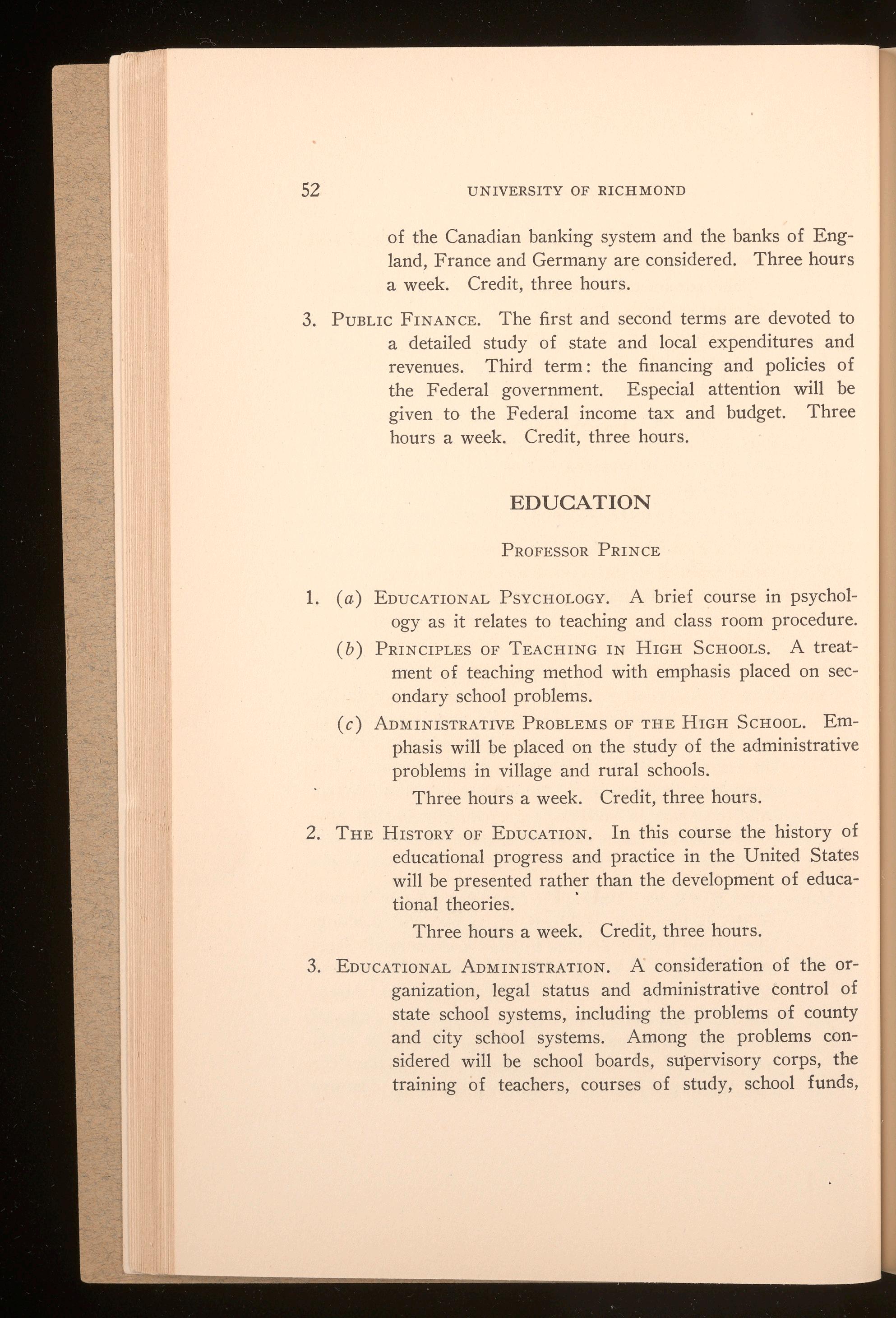
UNIVERSITYOF RICHMOND
of the Canadian banking system and the banks of England, France and Germany are considered. Three hours a week. Credit, three hours.
3. PUBLIC FINANCE. The first and second terms are devoted to a detailed study of state and local expenditures and revenues. Third term : the financing and policies of the Federal government. Especial attention will be given to the Federal income tax and budget. Three hours a week. Credit, three hours.
1. (a) EDUCATIONALPSYCHOLOGY.A brief course in psychology as it relates to teaching and class room procedure.
( b) PRINCIPLESOF TEACHING IN HIGH SCHOOLS. A treatment of teaching method with emphasis placed on secondary school problems.
(c) ADMINISTRATIVEPROBLEMSOF THE HIGH ScHOOL. Emphasis will be placed on the study of the administrative problems in village and rural schools.
Three hours a week. Credit, three hours.
2. THE HISTORYOF EDUCATION. In this course the history of educational progress and practice in the United States will be presented rather than the development of educational theories. ·
Three hours a week. Credit, three hours.
3. EDUCATIONALADMINISTRATION. A consideration of the organization, legal status and administrative control of state school systems, including the problems of county and city school systems. Among the problems considered will be school boards, supervisory corps, the training of teachers, courses of study, school funds,

buildings and equipment, records and reports, textbooks, special types of education, and the like.
The administrative organization of Virginia will be emphasized in this course.
Three hours a week. Credit, three hours.
Note: Open only to Juniors and Seniors, who have had Psychology 1.
1. COMPOSITIONANDRHETORIC. The elements of writing. Constant practice in the several forms of discourse. Selections from literature for illustration and example. Parallel reading; individual conferences. Three hours a week throughout the year, in sections. Prerequisite for all other courses of the department.
2. SURVEYOF LITERATURE. The literature of America from the early settlements to the present time. Sectional developments, types, relationships with contemporary English literature, men, and productions. Extensive parallel reading; weekly themes. Three hours a week throughout the year, in sections. Prerequisite for all other courses in literature in the department.
3. THE ENGLISH NOVEL. A rapid survey of prose fiction in England before the novel proper. The greater novelists and types of the novel from Defoe to Conrad. Lectures, wide reading, critiques. Three hours a week throughout the year. (Omitted 1925-26)
4. OLD ENGLISH. Anglo-Saxon grammar and phonology. Readings in West Saxon prose; Beowulf. Three hours a week throughout the year. Required ( or course 9) for major work in the department. Recommended for seniors and graduates. (At Westhampton 1925-26)

5. ENGLISH DRAMA.
(a) The development of English drama from the beginnings, through the early types, to Shakespeare and his contemporaries, and the decline to the closing of the theatres in 1642. Lectures, wide reading, reports. Three· hours a week, first and second terms.
( b) English drama from 1660 to the present time, with emphasis on the Restoration and Victorian periods. Lectures, wide reading, reports. Three hours a week, third term.
6. NINETEENTH CENTURYPoETRY. English poetry from approximately 1775 to 1914. Studies in the poetry of Wordsworth, Coleridge, Byron, Shelley, Keats, and Browning and Tennyson, with some attention to such figures as Burns, Scott, Arnold, Mrs. Browning, Rossetti, Morris, and Swinburne. Reports on the minor figures. Lectures and class discussions. Three hours a week throughout the year.
7. ADVANCEDCOMPOSITION.
(a) Ex POSITION. Instruction and practice in short expository articles, in essay writing, and in criticism. Reading in current periodical literature. Frequent conferences. Three hours a week, first term. Required ( or b) for major work in the department.
(b) THE SHORT STORY. Technique of the short story. Exercises in the elements of the type; finished short stories. Class room instruction, copious reading, individual conferences. Three hours a week, second term. Required ( or a) for major work in the department.
( c) Personal direction and supervision, for mature students, in advanced writing. Admission to the course by consent of the instructor. One hour credit. Third term.

8. THE CLASSICALREGIME. English literature, exclusive of drama and the novel, from 1660 to about 1775. Studies in Milton, Dryden, Addison and Steele, Swift, Pope, Gray, Goldsmith, and Johnson, with some notice of the minor writers. Lectures, extensive reading, critiques. ( Omitted 1925-26)
9. CHAUCER. An introductory study to Middle English. Close reading of some of the Canterbury Tales, from the linguistic standpoint primarily, preparatory to an appreciative reading and study of other works of Chaucer and of the period. Three hours a week throughout the year. Required ( or course 4) for major work in the department. Recommended for seniors and graduates.
10. SHAKESPEARE. Intensive study of a few plays, comprehensive reading and study of others. Emphasis mainly upon linguistic and literary values. Lectures and recitations. Three hours a week throughout the year.
GERMAN
PROFESSORMEREDITH
ASSOCIATEPROFESSORHACKLEY
1. ELEMENTARYGERMAN. A beginning course for those students who have never studied German or whose preparation is inadequate for more advanced work. It includes Elementary Grammar and Composition; special training in pronunciation and simple conversation Germon; the reading of simple texts in class and assigned parallel. Three hours a week. Credit, three hours when followed by German 2.
2. INTRODUCTIONTO GERMAN LITERATURE. Open to students who have taken Course 1 or its equivalent. It includes a review of German forms, a more careful study of

syntax, drill in pronunciation based on texts read, the reading of modern prose and dramatic works in class and as assigned parallel.
The following authors will be read : Heyse, Von Hillern, Storm, Wildenbruch, Baumbach, Jensen. Three hours a week. Credit, three hours.
3. ADVANCEDCouRSE. Open to students who have completed Course 2, or its equivalent. Emphasis is placed on literature. Literary periods and movements are studied. Much outside reading is assigned on which reports are made.
The work of the year will centre about the following authors: Keller, Riehl, Freytag, Gerstacker, Hauff, Zschokke, Heyse, Wildenbruch. Three hours a week. Credit, three hours.
4. Prerequisite, Course 3 or its equivalent. Lectures and readings on the classical period of German literature, with especial attention to the lives and works of the three dominant figures. One term will be devoted to Lessing, one to Goethe, and one to Schiller. Three hours a week. Credit, three hours.
5. SCIENTIFIC GERMAN. Such a course will be offered if there is an adequate demand for it.
PROFESSORHARRIS
1. FoR BEGINNERS. This class begins with the alphabet, and is occupied in securing a thorough knowledge of forms, a working vocabulary, and the fundamental points of syntax. From the beginning of the course exactness will be insisted upon. To enter this course some knowledge of Latin is prerequisite. Three hours a week. Credit, three hours when followed by Greek 2.

2. HOMER. This class will read Homer, from which selections will be taken, and will take up such other authors as the needs of the class may indicate. Special attention will be paid to forms and inflections. There will be weekly exercises in grammar and composition. As the student advances, translation at sight will be emphasized. For Freshmen and Sophomores. Three hours a week. Credit, three hours.
3. (a) PLATO, (b) LYSIAS. This class will be subject to change as the needs of the students may indicate. Half of the year is devoted to Plato and the other half to Lysias. There will be weekly exercises in composition throughout the year. Work will be assigned for private reading on which the student will be examined. As opportunity offers there will be conferences on Greek life, mythology, history, literature and art. At all times an effort will be made to lead the student into a keener appreciation of the genius of the Greeks, and to cultivate a sense for their · literary standards. For Sophomores and Juniors. Three hours a week. Credit, three hours.
4. (a) THUCYDIDES,(b) DEMOSTHENES,(c) THE DRAMA. In this class the work will center around Thucydides, Demosthenes, and the Drama. Work will also be assigned for private reading, and English will be put into Greek, either as a set exercise or at dictation. This course will be made as general as is consistent with thoroughness. There will be lectures on literature, grammar and rhetoric. For Juniors and Seniors. Three hours a week. Credit, three hours.
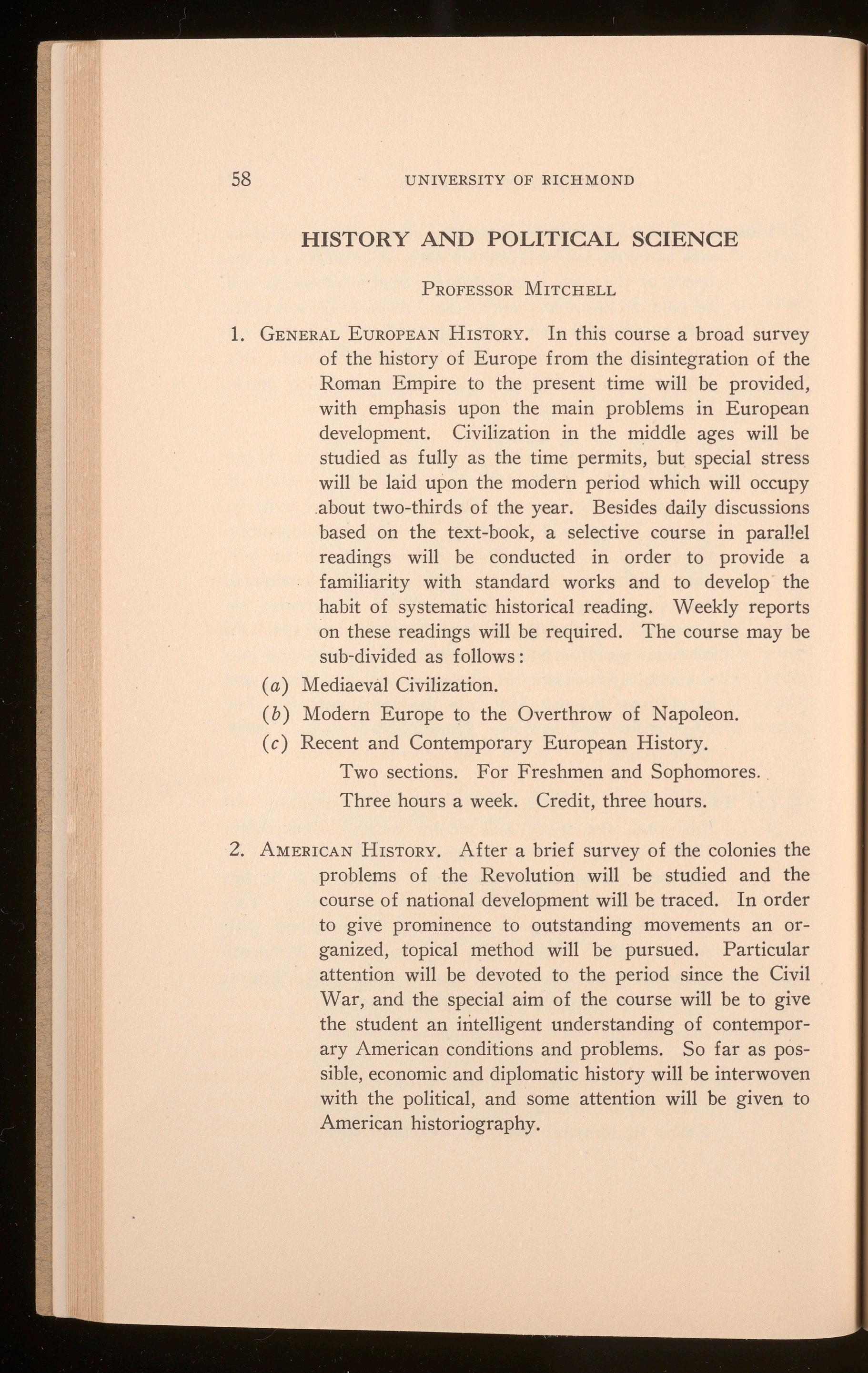
1. GENERALEUROPEANHISTORY. In this course a broad survey of the history of Europe from the disintegration of the Roman Empire to the present time will be provided, with emphasis upon the main problems in European development. Civilization in the middle ages will be studied as fully as the time permits, but special stress will be laid upon the modern period which will occupy .about two-thirds of the year. Besides daily discussions based on the text-book, a selective course in parallel readings will be conducted in order to provide a familiarity with standard works and to develop the habit of systematic historical reading. Weekly reports on these readings will be required. The course may be sub-divided as follows :
(a) Mediaeval Civilization.
( b) Modern Europe to the Overthrow of Napoleon.
( c) Recent and Contemporary European History. Two sections. For Freshmen and Sophomores. Three hours a week. Credit, three hours.
2. AMERICANHISTORY. After a brief survey of the colonies the problems of the Revolution will be studied and the course of national development will be traced. In order to give prominence to outstanding movements an organized, topical method will be pursued. Particular attention will be devoted to the period since the Civil War, and the special aim of the course will be to give the student an intelligent understanding of contemporary American conditions and problems. So far as possible, economic and diplomatic history will be interwoven with the political, and some attention will be given to American historiography.

Lectures, text-book assignments, class discussions, parallel readings and individual topics.
For Sophomores and Juniors.
Three hours a week. Credit, three hours.
3. MoDERN BRITISH HISTORY. This course will begin with the establishment of the Tudor dynasty in 1485 and will trace modern British history in its imperial and international as well as its domestic phases. In view of their important bearing upon American political institutions, the outstanding features of English constitutional development will receive special attention. Considerable time will be devoted to the period since the overthrow of Napoleon in order to provide an understanding of the many complicated problems of the nineteenth and twentieth centuries.
Text-book work with supplemental lectures, class discussions and parallel readings.
For Juniors and Seniors.
Three hours a week. Credit, three hours.
4. EUROPE SINCE 1789. A somewhat comprehensive study of the last century and a quarter will be made in this course. Students interested in recent European history and movements will profit by taking this class. The year will be divided between:
(a) THE FRENCH REVOLUTIONANDNAPOLEON. This portion of the work will cover one-third of the session.
(b) THE NINETEENTHANDTWENTIETHCENTURY. An effort will be made in the six months assigned for this part of the course to give careful attention to the formation of national states, to the spread of popular government, to the enormous economic changes of the last hundred years, to the eastern problem, and to the questions arising out of European expansion with Asia and Africa. For Juniors and Seniors. This course will be especially
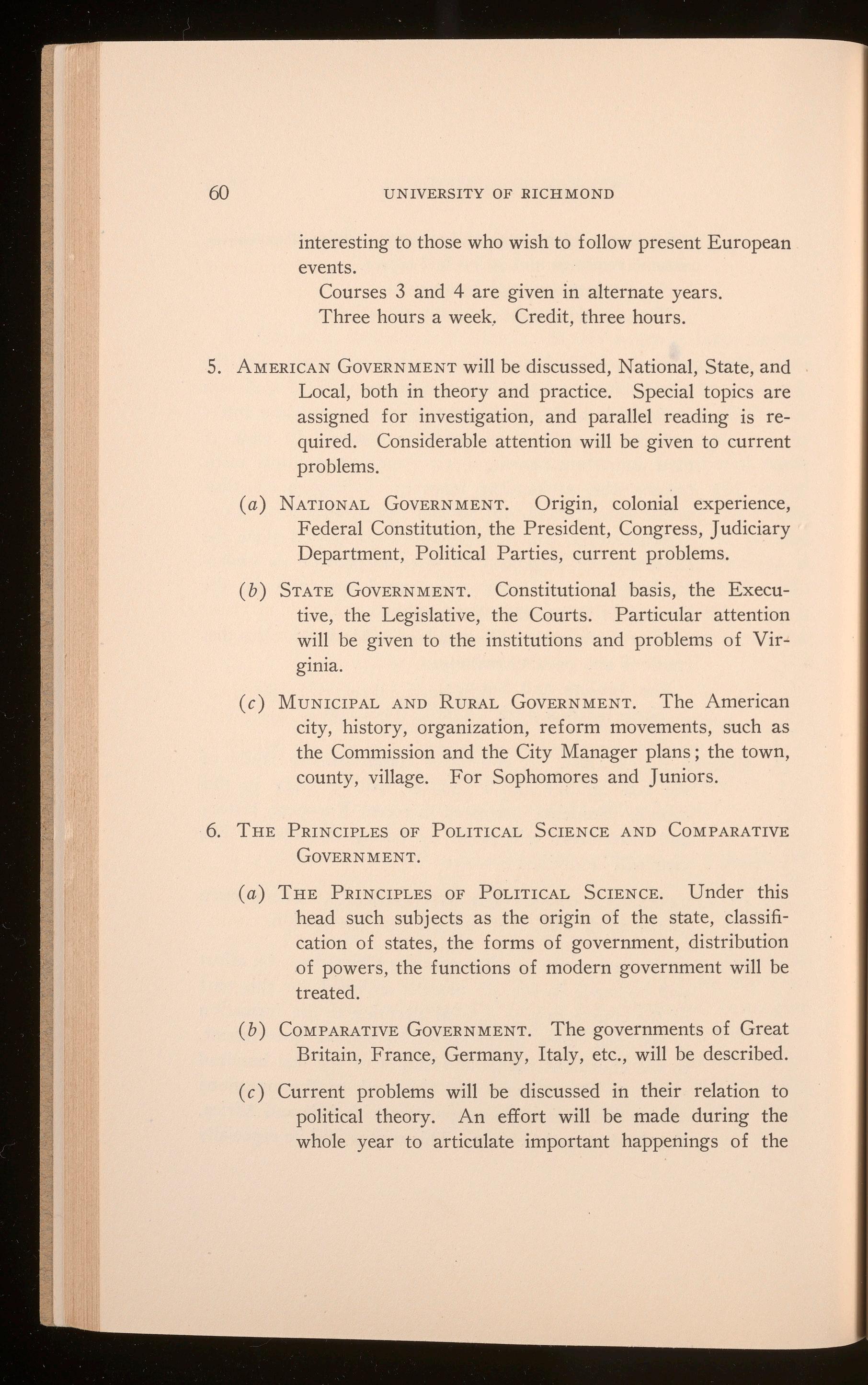
interesting to those who wish to follow present European events.
Courses 3 and 4 are given in alternate years. Three hours a week, Credit, three hours.
5. AMERICANGovERNMENTwill be discussed, National, State, and Local, both in theory and practice. Special topics are assigned for investigation, and parallel reading is required. Considerable attention will be given to current problems.
(a) NATIONAL GOVERNMENT. Origin, colonial experience, Federal Constitution, the President, Congress, Judiciary Department , Political Parties, current problems.
(
b) STATE GovERNMENT. Constitutional basis, the Executive, the Legislative, the Courts. Particular attention will be given to the institutions and problems of Virgm1a.
(c) MUNICIPAL AND RURAL GOVERNMENT. The American city, history, organization, reform movements, such as the Commission and the City Manager plans; the town, county, village. For Sophomores and Juniors.
6. THE PRINCIPLES OF POLITICAL SCIENCE AND COMPARATIVE GOVERNMENT.
(a) THE PRINCIPLES OF POLITICAL SCIENCE. Under this head such subjects as the origin of the state, classification of states, the forms of government, distribution of powers, the functions of modern government will be treated.
(b) COMPARATIVEGOVERNMENT.The governments of Great Britain, France, Germany, Italy, etc., will be described.
( c) Current problems will be discussed in their relation to political theory. An effort will be made during the whole year to articulate important happenings of the
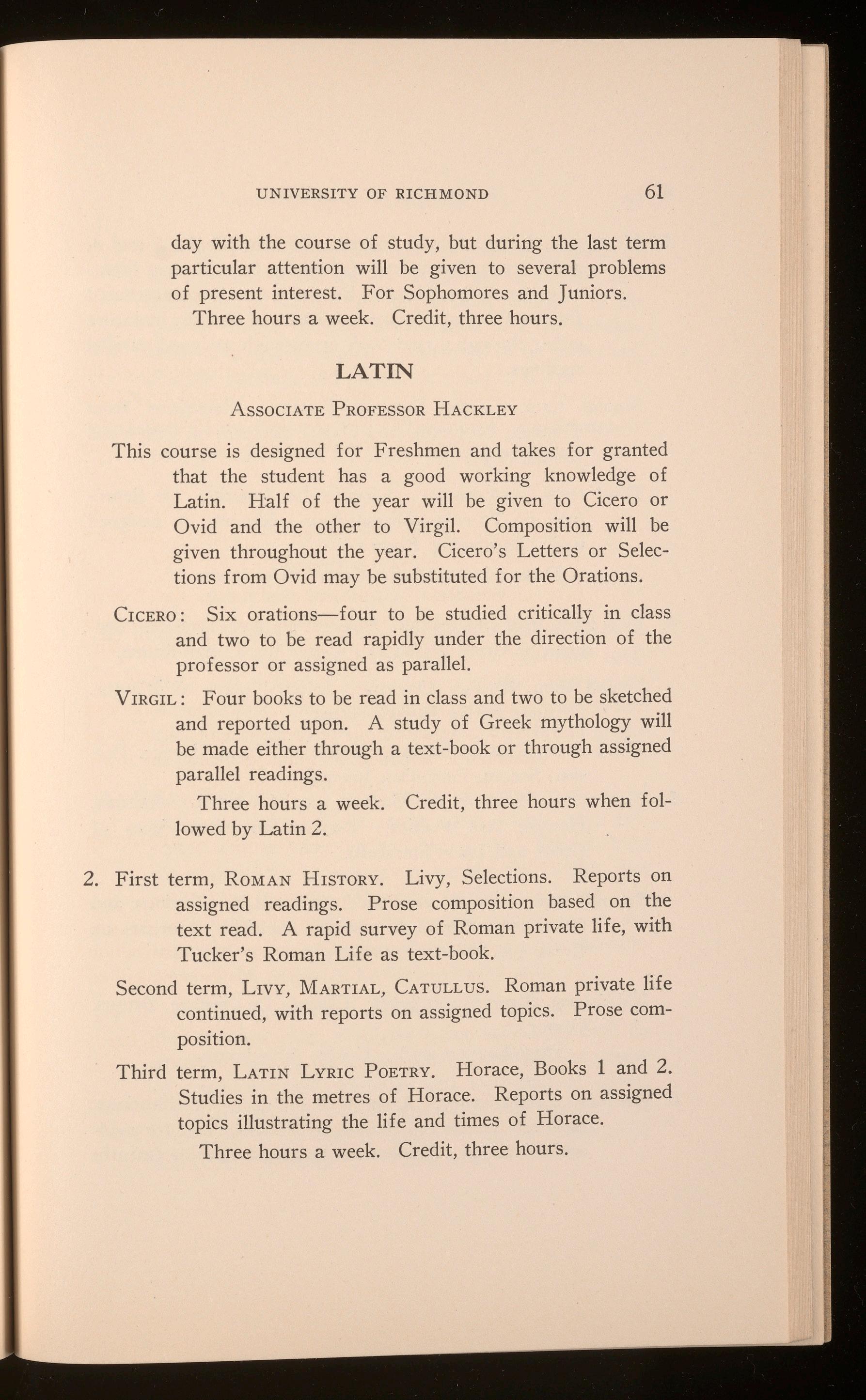
day with the course of study, but during the last term particular attention will be given to several problems of present interest. For Sophomores and Juniors.
Three hours a week. Credit, three hours.
This course is designed for Freshmen and takes for granted that the student has a good working knowledge of Latin. Half of the year will be given to Cicero or Ovid and the other to Virgil. Composition will be given throughout the year. Cicero's Letters or Selections from Ovid may be substituted for the Orations.
CICERO: Six orations-four to be studied critically in class and two to be read rapidly under the direction of the professor or assigned as parallel.
VIRGIL: Four books to be read in class and two to be sketched and reported upon. A study of Greek mythology will be made either through a text-book or through assigned parallel readings.
Three hours a week. Credit, three hours when followed by Latin 2.
2. First term, RoMAN HISTORY. Livy, Selections. Reports on assigned readings. Prose composition based on the text read. A rapid survey of Roman private life, with Tucker's Roman Life as text-book.
Second term, LIVY, MARTIAL,CATULLUS.Roman private life continued, with reports on assigned topics. Prose composition.
Third term, LATIN LYRIC POETRY. Horace, Books 1 and 2. Studies in the metres of Horace. Reports on assigned topics illustrating the life and times of Horace.
Three hours a week. Credit, three hours.
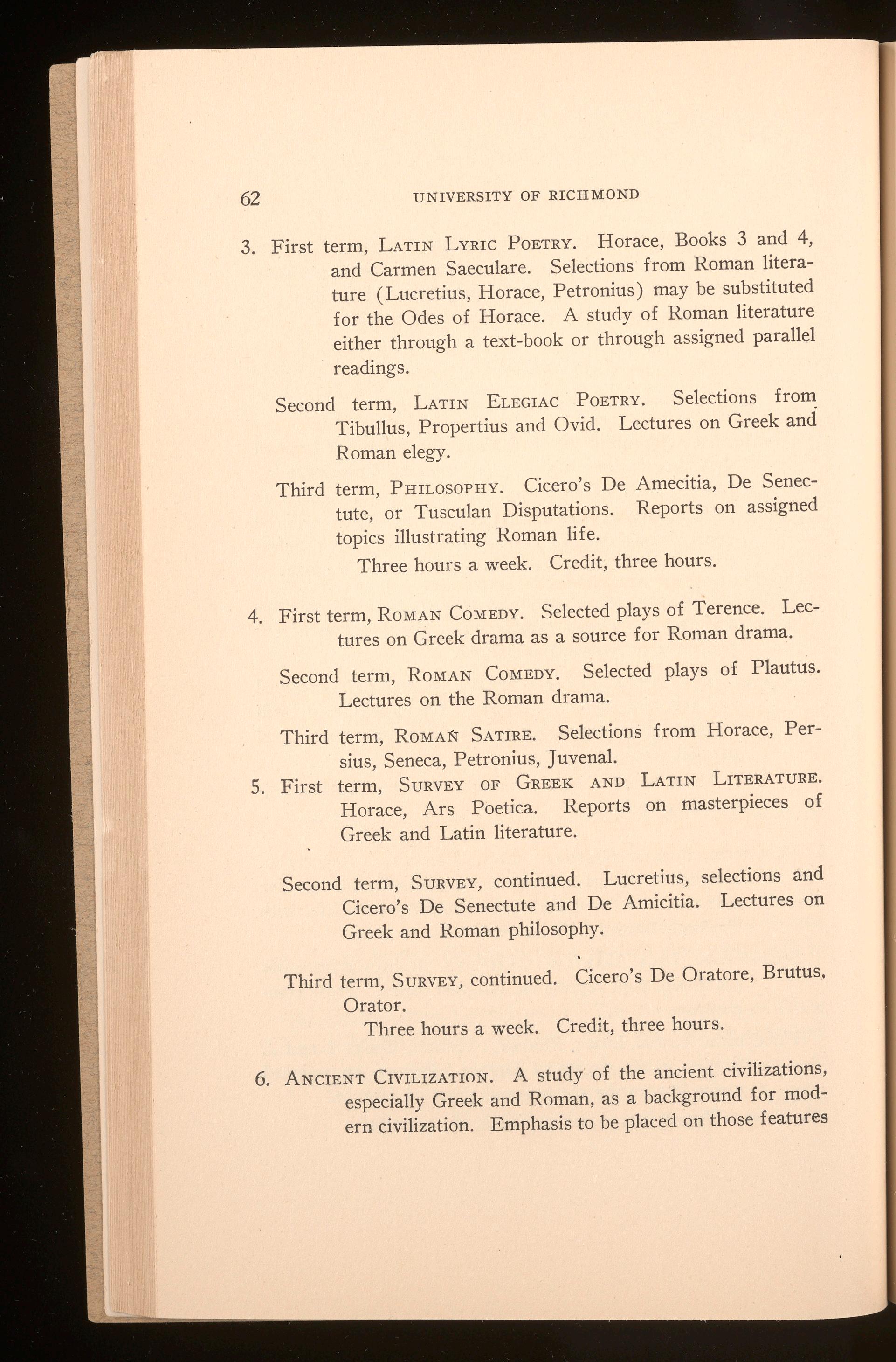
3. First term, LATIN LYRIC PoETRY. Horace, Books 3 and 4, and Carmen Saeculare. Selections from Roman literature ( Lucretius, Horace, Petronius) may be substituted for the Odes of Horace. A study of Roman literature either through a text-book or through assigned parallel readings.
Second term, LATIN ELEGIAC PoETRY. Selections fro~ Tibullus, Propertius and Ovid. Lectures on Greek and Roman elegy.
Third term, PHILOSOPHY. Cicero's De tute, or Tusculan Disputations. topics illustrating Roman life.
Amecitia, De SenecReports on assigned
Three hours a week. Credit, three hours.
4. First term, ROMANCOMEDY. Selected plays of Terence. Lectures on Greek drama as a source for Roman drama.
Second term, ROMAN COMEDY. Selected plays of Plautus. Lectures on the Roman drama.
Third term, ROMAN SATIRE. Selections from Horace, Persius, Seneca, Petronius, Juvenal.
5. First term, SuRVEY OF GREEK AND LATIN LITERATURE. Horace, Ars Poetica. Reports on masterpieces of Greek and Latin literature.
Second term, SURVEY,continued. Lucretius, selections and Cicero's De Senectute and De Amicitia. Lectures on Greek and Roman philosophy.
Third term, SURVEY,continued. Cicero's De Oratore, Brutus, Orator.
Three hours a week. Credit, three hours.
6. ANCIENT CIVILIZATION. A study of the ancient civilizations, especially Greek and Roman, as a background for modern civilization. Emphasis to be placed on those features

of ancient life which have had the greatest influence on the progress of the world-in the case of Greece, personal liberty, intellectual and esthetic culture; in the case of Rome, political organization and the development of a world empire. Text-book to be prescribed. Parallel readings and papers on assigned topics.
7. ADVANCEDLATIN COMPOSITION.One hour a week throughout the year. Required for Latin major in addition to Latin 1, 2, 3, 4.
ASSOCIATEPROFESSORLAWRENCE
1. (a) COLLEGEALGEBRA. A course designed to follow the work of a good high school, beginning with quadratic equations, and including such subjects as the progressions, permutations and combinations, mathematical induction, binominal theorem, inequalities, logarithms, theory of equations, and infinite series. First term.
( b) SouD GEOMETRY. A brief study of certain portions of plane geometry will be made, after which solid geometry will be taken up and completed. The work in plane geometry is not given merely for review, but rather for the sake of certain methods of proof, and particularly for calling the student's attention to the interrelation of groups of theorems, and the development of the subject as a whole. Second term.
(c) PLANE TRIGONOMETRY.The subject is approached from ·the practical side, problems being solved at first by graphic methods, and afterwards computed by means of trigonometrical formulas and mathematical tables. After the interest of the student is thus secured, the remainder of the time is devoted to the development of analytical trigonometry. Third term.
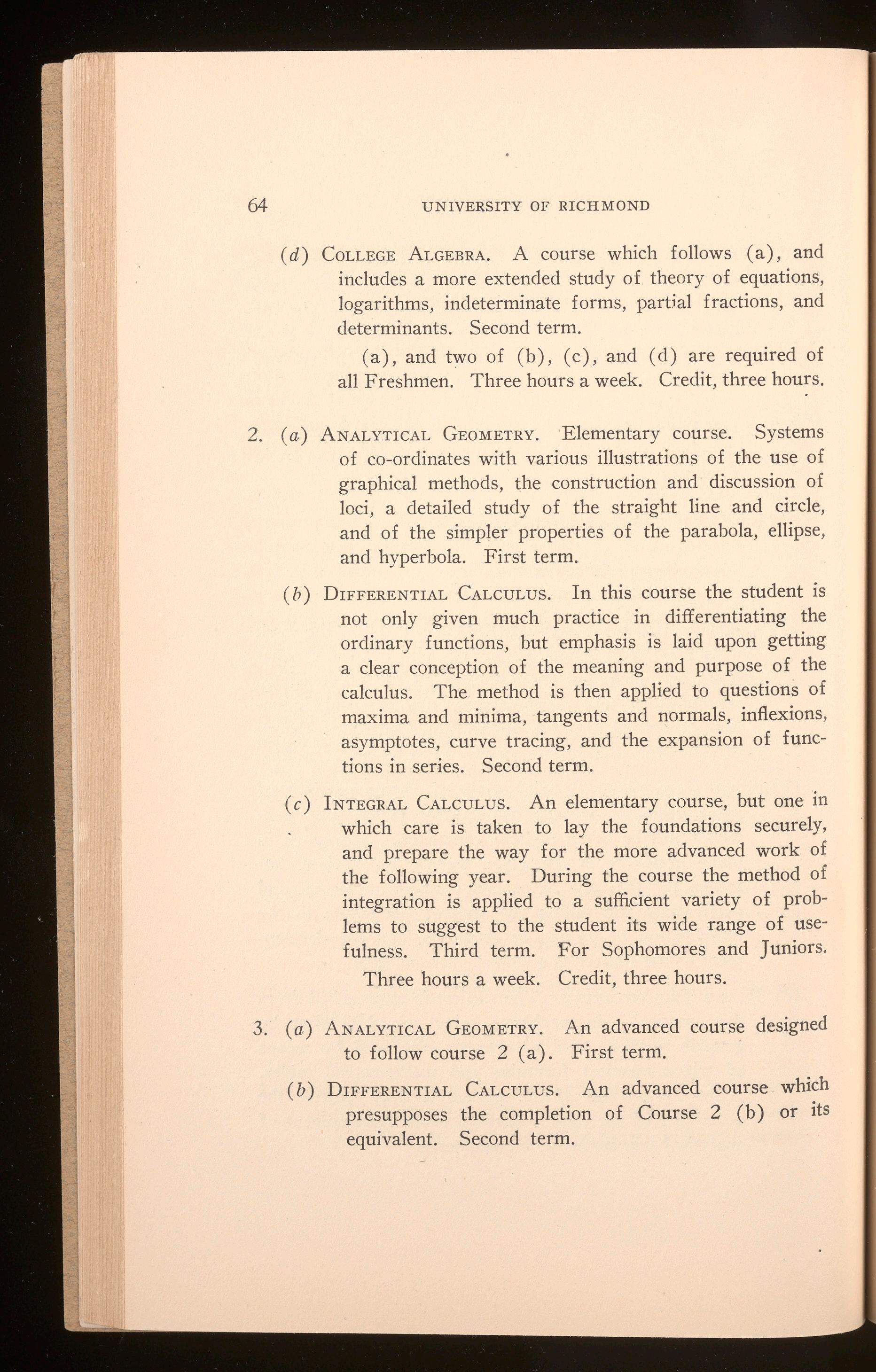
( d) COLLEGEALGEBRA. A course which follows (a), and includes a more extended study of theory of equations, logarithms, indeterminate forms, partial fractions, and determinants. Second term.
(a), and two of (b), (c), and (d) are required of all Freshmen. Three hours a week. Credit, three hours.
2. (a) ANALYTICALGEOMETRY. Elementary course. Systems of co-ordinates with various illustrations of the use of graphical methods, the construction and discussion of loci, a detailed study of the straight line and circle, and of the simpler properties of the parabola, ellipse, and hyperbola. First term.
( b) DIFFERENTIALCALCULus. In this course the student is not only given much practice in differentiating the ordinary functions, but emphasis is laid upon getting a clear conception of the meaning and purpose of the calculus. The method is then applied to questions of maxima and minima, tangents and normals, inflexions, asymptotes, curve tracing, and the expansion of functions in series. Second term.
( c) INTEGRALCALCULus. An elementary course, but one in which care is taken to lay the foundations securely, and prepare the way for the more advanced work of the following year. During the course the method of integration is applied to a sufficient variety of problems to suggest to the student its wide range of usefulness. Third term. For Sophomores and Juniors.
Three hours a week. Credit, three hours.
3. (a) ANALYTICALGEOMETRY. An advanced course designed to follow course 2 (a). First term.
( b) DIFFERENTIALCALCULus. An advanced course which presupposes the completion of Course 2 (b) or its equivalent. Second term.
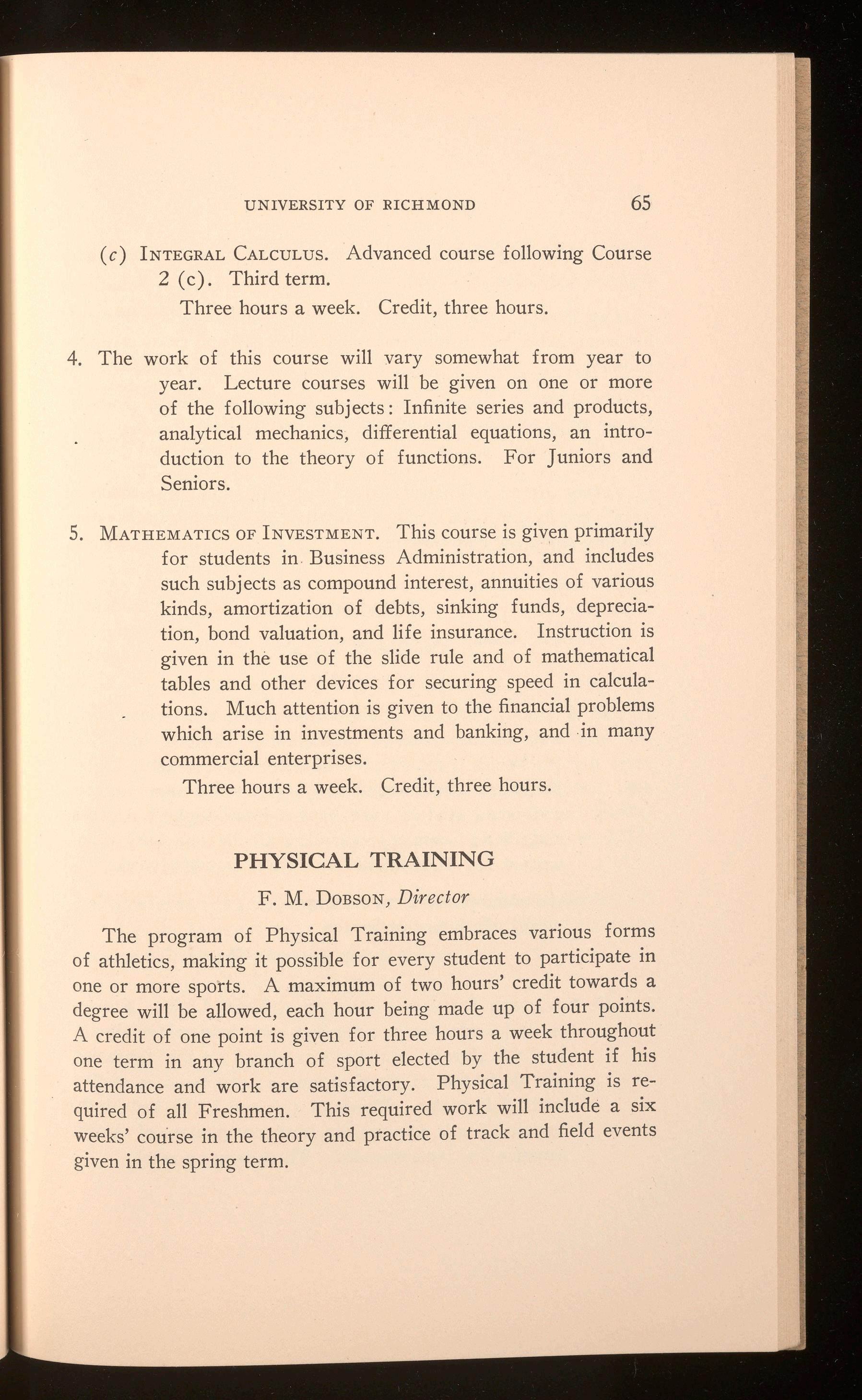
( c) INTEGRALCALCULus. Advanced course following Course 2 ( c). Third term.
Three hours a week. Credit, three hours.
4. The work of this course will vary somewhat from year to year. Lecture courses will be given on one or more of the following subjects: Infinite series and products, analytical mechanics, differential equations, an introduction to the theory of functions. For Juniors and Seniors.
5. MATHEMATICSOFINVESTMENT.This course is given primarily for students in Business Administration, and includes such subjects as compound interest, annuities of various kinds, amortization of debts, sinking funds, depreciation, bond valuation, and life insurance. Instruction is given in the use of the slide rule and of mathematical tables and other devices for securing speed in calculations. Much attention is given to the financial problems which arise in investments and banking, and in many commercial enterprises.
Three hours a week. Credit, three hours.
F. M. DOBSON,Director
The program of Physical Training embraces various forms of athletics, making it possible for every student to participate in one or more sports. A maximum of two hours' credit towards a degree will be allowed, each hour being made up of four points. A credit of one point is given for three hours a week throughout one term in any branch of sport elected by the student if his attendance and work are satisfactory. Physical Training is required of all Freshmen. This required work will include a six weeks' cou·rse in the theory and practice of track and field events given in the spring term.

The following forms of athletics will be given from which students may elect for credit:
Fall Term: Football ( varsity, scrub, second and class teams), informal basket-ball, tennis, track and volley ball and cross-country runnmg.
Winter Term: Basket-ball ( varsity, second and class teams), indoor track ( varsity and class), informal and class volley ball, boxing, wrestling, swimming, and indoor baseball.
Spring Term : Baseball (varsity, second and class teams), track ( varsity and class), tennis ( varsity and college leagues) and required work for Freshmen.
1. (a) GENERALPHYSICS. This course covers in an elementary way the fundamental principles of Physics, including Mechanics, Properties of Matter, Heat, Sound, Light, Electricity and Magnetism. For admission to this course the student must have a knowledge of Algebra and Plane Geometry equivalent to the necessary preparation for Mathematics 1. Three hours a week.
( b) A laboratory course to accompany 1 (a) ; two periods a week, two hours each.
For Freshmen and Sophomores. Credit, five hours.
2. (a) ADVANCEDPHYSICS. Mechanics, Heat, Light. Fundamental principles are recalled and their wider significance is shown. Emphasis is placed on the discussion and derivation of physical laws as expressed in mathematical formulae. Physics 1 (a) and 1 (b) and Mathematics 1 are prerequisite, and completion of Mathematics 2 is recommended. Three hours a week.

(
b) An advanced laboratory course dealing with the subjects treated in Course 2 (a) ; two periods a week, two hours each.
For Sophomores and Juniors. Credit, five hours.
3. (a) ADVANCEDPHYSICS. Electricity and Magnetism. The fall term will be devoted to a study of electrostatics and magnetism. Special attenution will be given to the electrical theory of matter, and its bearing on the general phenomena of electricity. The remainder of the course wi!l be devoted to the study of direct current circuits and machinery. Physics 1 (a) and 1 (b) and Mathematics 1 are prerequisite. Three hours a week.
(
b) An advanced laboratory course based on the topics .treated in course 3 (a) ; two periods a week, two hours each.
For Sophomores and Juniors. Credit, five hours.
4. (a). ADVANCEDPHYSICS. Alternating Currents. The fall term will be devoted to the study of alternating current notation and circuits. During the winter term the theory of radio will be studied. In the spring term the more important types of alternating current machines will be considered. Physics 1 and 3, and Mathematics 1 and 2 are prerequisite. (Not given in 19251926.)
( b) An advanced laboratory course based on the topics treated in course 4 (a) ; two periods a week, two hours each. Credit, five hours.
For Juniors and Seniors.

UNIVERSITYOF RICHMOND
PSYCHOLOGY
PROFESSORAsTROP
1. A CouRSE FOR BEGINNERS. A study of the consciousness of the normal adult human being in all its phases and 3: practical application of the theories of general psychology to the needs of every day life.
(a) First term, PHYSIOLOGICALPSYCHOLOGY.A study of the relation of mind and body showing the dependence of conscious life as we know it upon the nervous system.
(b) Second term, ANALYTICALPSYCHOLOGY.An analysis of the simpler conscious processes such as sensation, perception, memory, and imagination.
(
c) Third term, SYNTHETIC PsYCHOLOGY. A constructive study of theories concerning the more complex phases of mind, such as conception, judgment, reasoning, will, emotion, language and intellect.
Not open to Freshmen. Three hours a week. Credit, three hours.
2. A CouRSE FORADVANCEDSTUDENTS. An application of the theories and principles of general psychology to special conditions of human life. A detailed study of practical results obtained by psychology in specialized fields.
(a) First half-year, APPLIED PSYCHOLOGY.An analysis of the mainsprings of human action that make for efficiency and inefficiency, happiness and unhappiness. An exposition of the methods employed by psychology to foster , modify, or suppress these motives for the welfare of the individual and groups of individuals. The application of psychological laws to management, industry, commerce, law, social work, medicine, and education.
(b) Second half-year, VocATIONAL PSYCHOLOGY. A study of the history of man's efforts to gage human personal-

ity and measure human intelligence. A review of obsolete standards for the appraisal of mental ability in the individual, • passing quickly to a consideration of general psychological tests, psychographic methods, special vocational tests, and the technique of the measurement of mind.
Prerequisite, Psychology 1. This course alternates with Psychology 3. Three hours a week. Credit, three hours.
3. A COURSEFOR ADVANCEDSTUDENTS. A general survey of some of the historical and contemporary theories and problems of psychology and a comparative study of certain fields of psychology, with a course in abnormal psychology.
(a) First half-year, COMPARATIVEPSYCHOLOGY.A contrast between the orthodox dualism of psychology and the more modern viewpoint of behaviorism, the motorattitude theory, and the psycho-somatic slant. A study of genetic psychology both phylogenetically and ontogenetically, involving a comparison of the animal and child mind. A study of the psychology of religions.
( b) Second half-year, ABNORMALPSYCHOLOGY.A comprehensive treatment of the various aberrations of mind, from normal illusions to insanity, with clinics at neighboring institutions for the insane.
Prerequisite, Psychology 1. This course alternates with Psychology 2. To be given in 1926-'27. Three hours a week. Credit, three hours.

UNIVERSITYOF RICHMOND
PROFESSORHA~DY
A course of one year in the principles and practice of Public Speaking is offered. The training of students in accuracy of thought, in correctness of expression, and in ease of delivery will be stressed. Practical speaking necessary for successful accomplishment is the aim of this instruction.
In addition to oral practice there will be wide reading and critical study of examples of the various forms of public speechdeliberative, forensic, occasional, etc.
Fall Term: A study of the general principles of Public Speaking. Voice Correction. Reading aloud with emphasis upon proper breathing. Daily practice in the delivery of short memorized selections.
Winter Term: The oration as a form. Analytical study of a number of modern-orations as to structure, style and diction. Writing of two original orations and delivery of them before the class.
Spring Term: Other forms of Public Address. Extempore and Impromptu Speaking. Special types of short talks necessary in the social world of today. · Not open to Freshmen. Three hours a week. Credit, three hours.
PROFESSORSAVERIO
ASSISTANTPROFESSORDODDS
French
1. ELEMENTARYFRENCH. A course for students with little or no knowledge of French. It is conducted, as far as possible, in French and consists of : Careful pronunciation ; fluency in reading; drill in conversation; dictation; study of elementary grammar and composition.
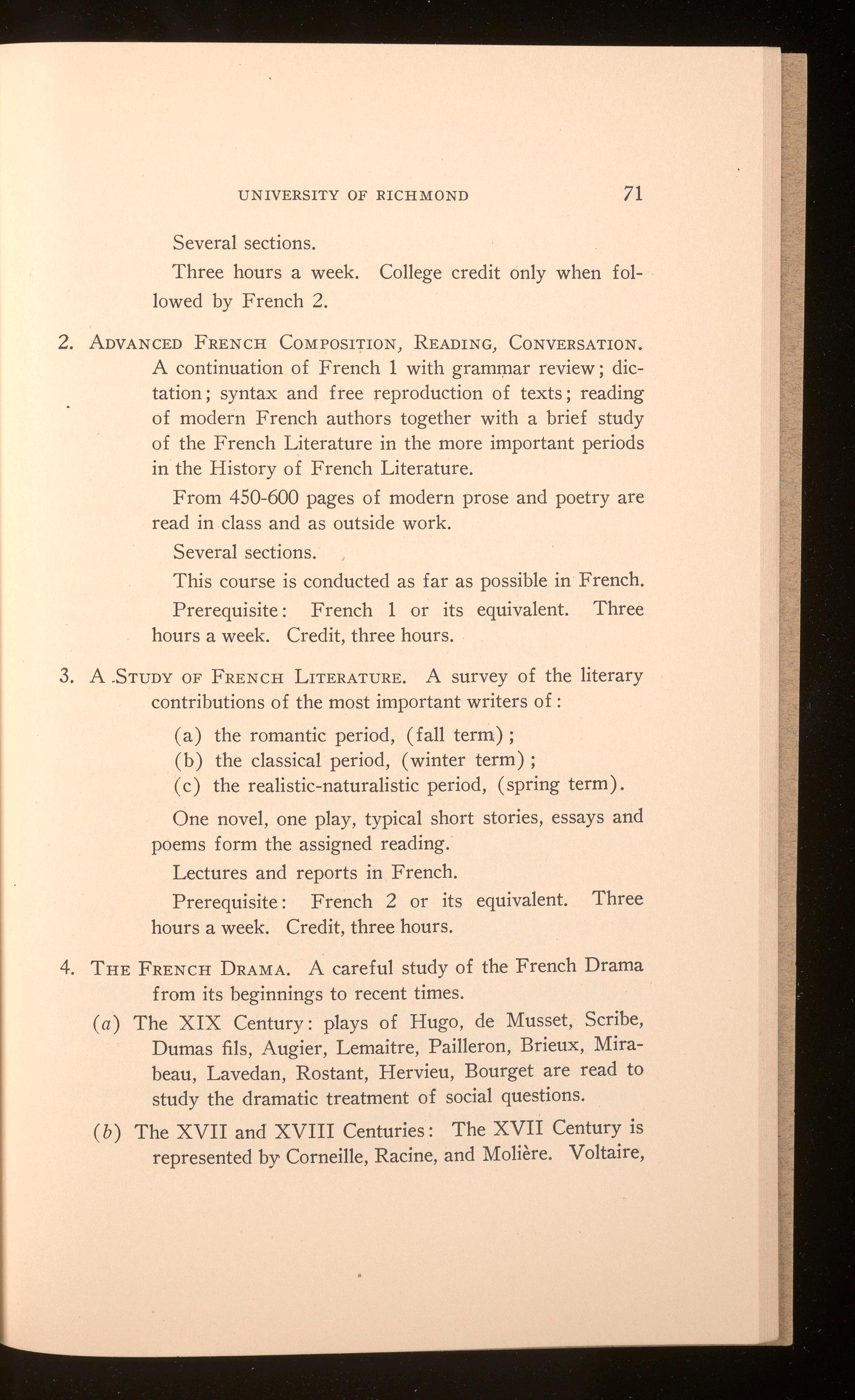
Several sections.
Three hours a week. College credit only when followed by French 2.
2. ADVANCEDFRENCH COMPOSITION,READING,CONVERSATION.
A continuation of French 1 with grammar review; dictation; syntax and free reproduction of texts; reading of modern French authors together with a brief study of the French Literature in the more important periods in the History of French Literature.
From 450-600 pages of modern prose and poetry are read in class and as outside work.
Several sections.
This course is conducted as far as possible in French.
Prerequisite: French 1 or its equivalent. Three hours a week. Credit, three hours.
3. A .STUDYOF FRENCH LITERATURE. A survey of the literary contributions of the most important writers of:
(a) the romantic period, (fall term);
( b) the classical period, ( winter term) ;
( c) the realistic-naturalistic period, ( spring term).
One novel, one play, typical short stories, essays and poems form the assigned reading.
Lectures and reports in French.
Prerequisite : French 2 or its equivalent. Three hours a week. Credit, three hours.
4. THE FRENCH DRAMA. A careful study of the French Drama from its beginnings to recent times .
(a) The XIX Century: plays of Hugo, de Musset, Scribe, Dumas fils, Augier, Lemaitre, Pailleron, Brieux, Mirabeau, Lavedan, Rostant, Hervieu, Bourget are read to study the dramatic treatment of social questions.
(
b) The XVII and XVIII Centuries: The XVII Century is represented by Corneille, Racine, and Moliere. Voltaire,

( for the XVIII Century) gives the student tragedy; while selections are studied from Regnard, Lesage, Marivau, and Beaumarchais to illustrate the French Comedy.
General text: Le theatre en France, par L. Petit deJulleville.
( c) Dramatic Literature before the XVII Century.
General text: Le theatre en France, par L. Petit de Julleville.
Prerequisite: French 3 or its equivalent.
Conducted in French. Three hours a week. Credit, three hours. ( Given in alternate years.)
5. THE FRENCH NovEL. Detailed study of the most important writers of fiction from Chateaubriand to the present time. Representative novels will be studied in class. Collateral rea<ling; reports in French.
Prerequisite: French 3 or its equivalent.
Conducted in French. Three hours a week. Credit, three hours. ( Given in alternate years.)
6. THE FRENCH NOVEL FROM ROUSSEAUTO CHATEAUBRIAND. Representative novels will be studied in class. Lectures, reports, collateral reading.
Prerequisite : French 3 or its equivalent.
Conducted in French. Three hours a week. Credit, three hours. ( Given in alternate years.)
7. HISTORICALFRENCH GRAMMAR. It deals with the essential principles of linguistic growth; the history of the sounds of French together with the external history of French language.
Prerequisite: French 2 or its equivalent. Knowledge of Latin is desirable. Three hours a week. Credit, three hours.

8. THE TEACHINGOF MODERNLANGUAGES.This course is intended especially for seniors who intend to teach modern languages. It is open to all students , however, with a prerequisite of one year of modern language with college credit. It cannot be counted as a modern language requirement for a degree or diploma unless the student majors in modern languages.
(a) PHONETICS. A description of French, German or Spanish sounds with practice in their pronunciation. (Fall term.)
(
b) METHODSAND BooKs. A discussion of the methods now used in teaching modern languages especially of the direct method and of its application in secondary schools; and a critical study of text-books used in the teaching of modern languages (French, German, Spanish), in this country.
Two hours a week. Credit, two hours.
1. ELEMENTARYSPANISH. A course for students with little or no knowledge of Spanish . It is conducted almost entirely in Spanish and consists of : careful pronunciation; fluency in reading; drill in conversation; dictation; study of elementary grammar and simple composition. Several sections.
Three hours a week. College credit ( 3 hours) only when followed by Spanish 2.
2 ADVANCEDSPANISH COMPOSITION,READING , CONVERSATION. A continuation of Spanish 1 with grammar review; dictation; composition; free reproduction of texts; the general character of Spanish Literature in the more important periods, will be studied. From 450 -600 pages of modern prose and poetry are read in class and as outside work.

This course is conducted as far as possible in Spanish.
Prerequisite: Spanish 1 or its equivalent. Three hours a week. Credit, three hours.
3. SPANISH LITERATUREOF THE XVIII AND XIX CENTURIES. A general survey of modern Spanish literature; and detailed study of the modern Spanish drama and novel. Collateral reading; reports in Spanish.
Prerequisite: Spanish 2 or its equivalent. Conducted in Spanish. Three hours a week. Credit, three hours.
4. SPANISH LITERATUREOF THE XVI ANDXVII CENTURIES. A detailed study of the life and writings of: Cervantes; Lope de Vega, Calderon.
Collateral _reading; reports in Spanish.
Prerequisite: Spanish 3 or its equivalent. Conducted in Spanish. Three hours a week. Credit, three hours.
5. CdMMERCIALSPANISH. This course deals with commercial correspondence; reading of articles dealing with LatinAmerica. Constant practice in writing and speaking to give the student a wide commercial vocabulary.
Text: Commercial Spanish, by C. F. McHale.
Prerequisite: Spanish 1 or its equivalent. Three hours a week. Credit, three hours.
6. ADVANCEDCOMMERCIALSPANISH. A continuation of Spanish 5; its aim is to study fairly exhaustively the practice of trading in operation in Latin-American countries; to study carefully Spanish commercial· documents and business transactions.
Collateral reading (Newspapers and Journals in Spanish).
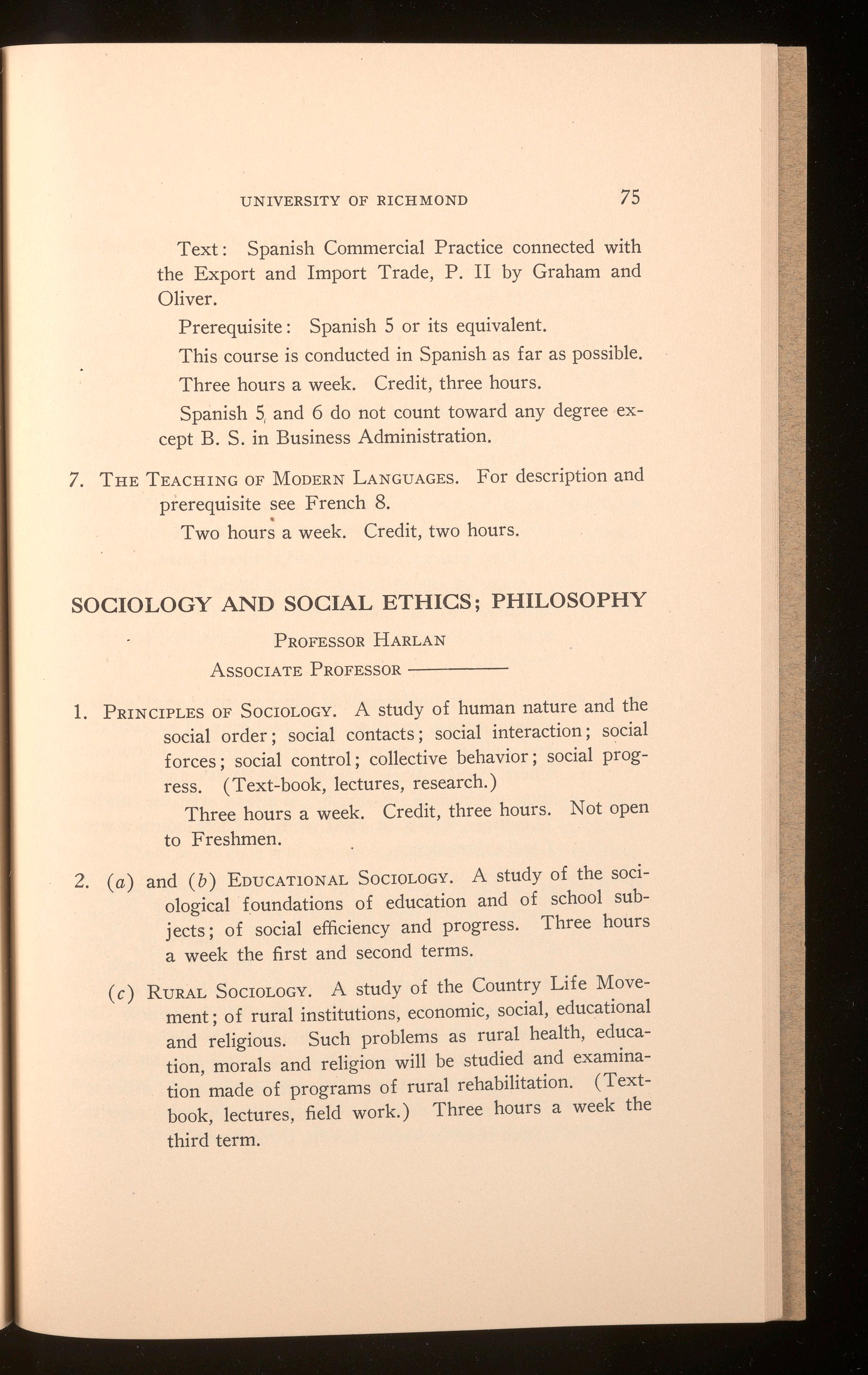
UNIVERSITYOF RICHMOND 75
Text: Spanish Commercial Practice connected with the Export and Import Trade, P. II by Graham and Oliver.
Prerequisite : Spanish 5 or its equivalent.
This course is conducted in Spanish as far as possible.
Three hours a week. Credit, three hours.
Spanish 5, and 6 do not count toward any degree except B. S. in Business Administration.
7. THE TEACHINGOF MODERNLANGUAGES.For description and prerequisite see French 8.
Two hours a week. Credit, two hours.
PROFESSORHARLAN
ASSOCIATEPROFESSOR-----
1. PRINCIPLESOF SocIOLOGY. A study of human nature and the social order ; social contacts ; social interaction ; social forces; social control; collective behavior; social progress. ( Text-book, lectures, research.)
Three hours a week. Credit, three hours. Not open to Freshmen.
2. (a) and (b) EDUCATIONALSocIOLOGY. A study of the sociological foundations of education and of school subjects; of social efficiency and progress. Three hours a week the first and second terms.
(c) RURAL SocIOLOGY. A study of the Country Life Movement; of rural institutions, economic, social, educational and religious. Such problems as rural health, education, morals and religion will be studied and examination made of programs of rural rehabilitation. (Textbook, lectures, field work.) Three hours a week the third term.
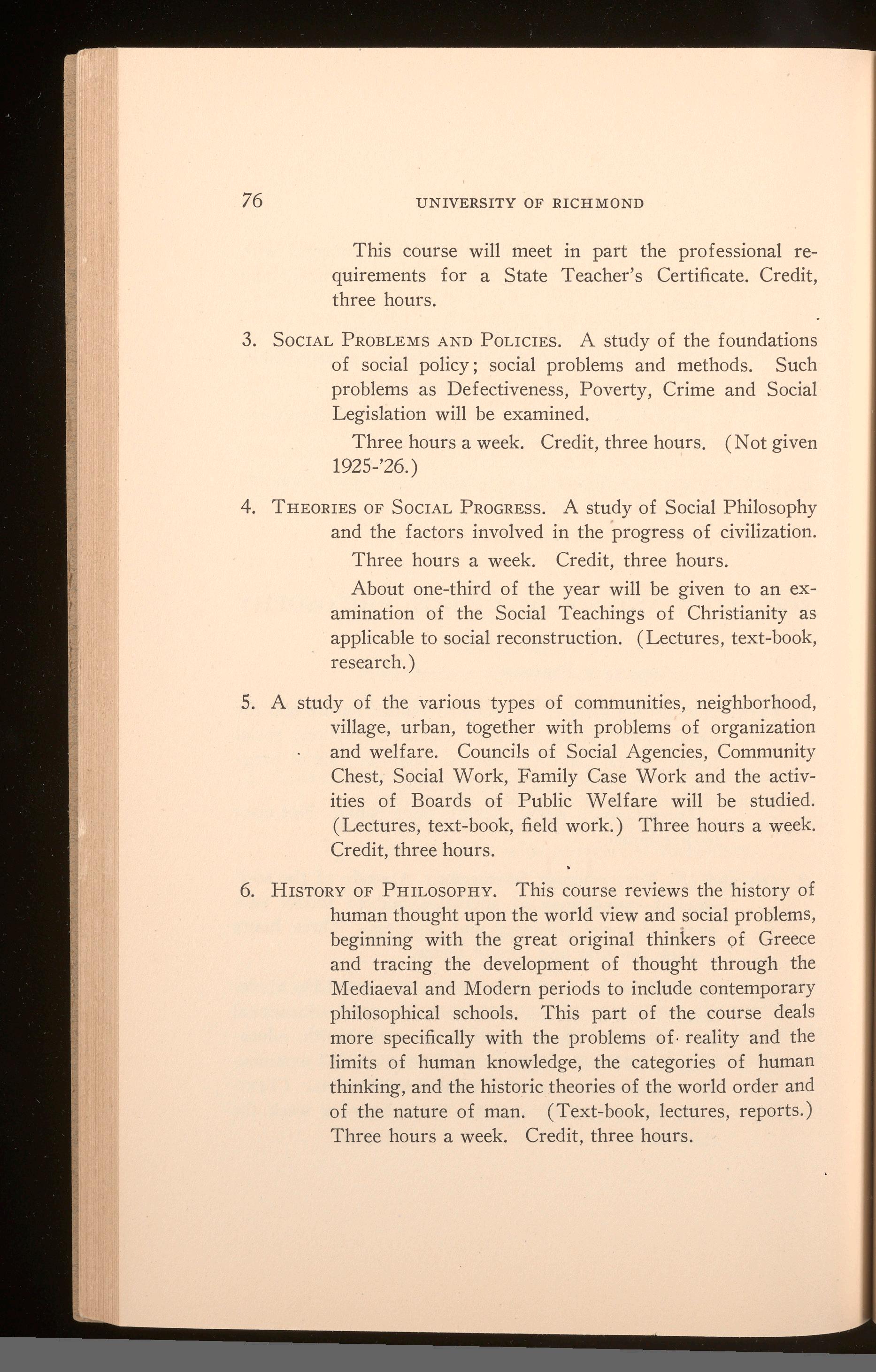
This course will meet in part the professional requirements for a State Teacher's Certificate. Credit, three hours.
3. SocIAL PROBLEMSAND PoucIEs. A study of the foundations of social policy; social problems and methods. Such problems as Defectiveness, Poverty, Crime and Social Legislation will be examined.
Three hours a week. Credit, three hours. (Not given 1925-'26.)
4. THEORIESOF SocIAL PROGRESS.A study of Social Philosophy and the factors involved in the progress of civilization.
Three hours a week. Credit, three hours.
About one-third of the year will be given to an examination of the Social Teachings of Christianity as applicable to social reconstruction. (Lectures, text-book, research.)
5. A study of the various types of commumtles, neighborhood, village, urban, together with problems of organization and welfare. Councils of Social Agencies, Community Chest, Social Work, Family Case Work and the activities of Boards of Public Welfare will be studied. ( Lectures, text-book, field work.) Three hours a week. Credit, three hours.
6. HISTORYOF PHILOSOPHY. This course reviews the history of human thought upon the world view and social problems, beginning with the great original thinkers of Greece and tracing the development of thought through the Mediaeval and Modern periods to include contemporary philosophical schools. This part of the course deals more specifically with the problems of-reality and the limits of human knowledge, the categories of human thinking, and the historic theories of the world order and of the nature of man. (Text-book, lectures, reports . ) Three hours a week. Credit, three hours.
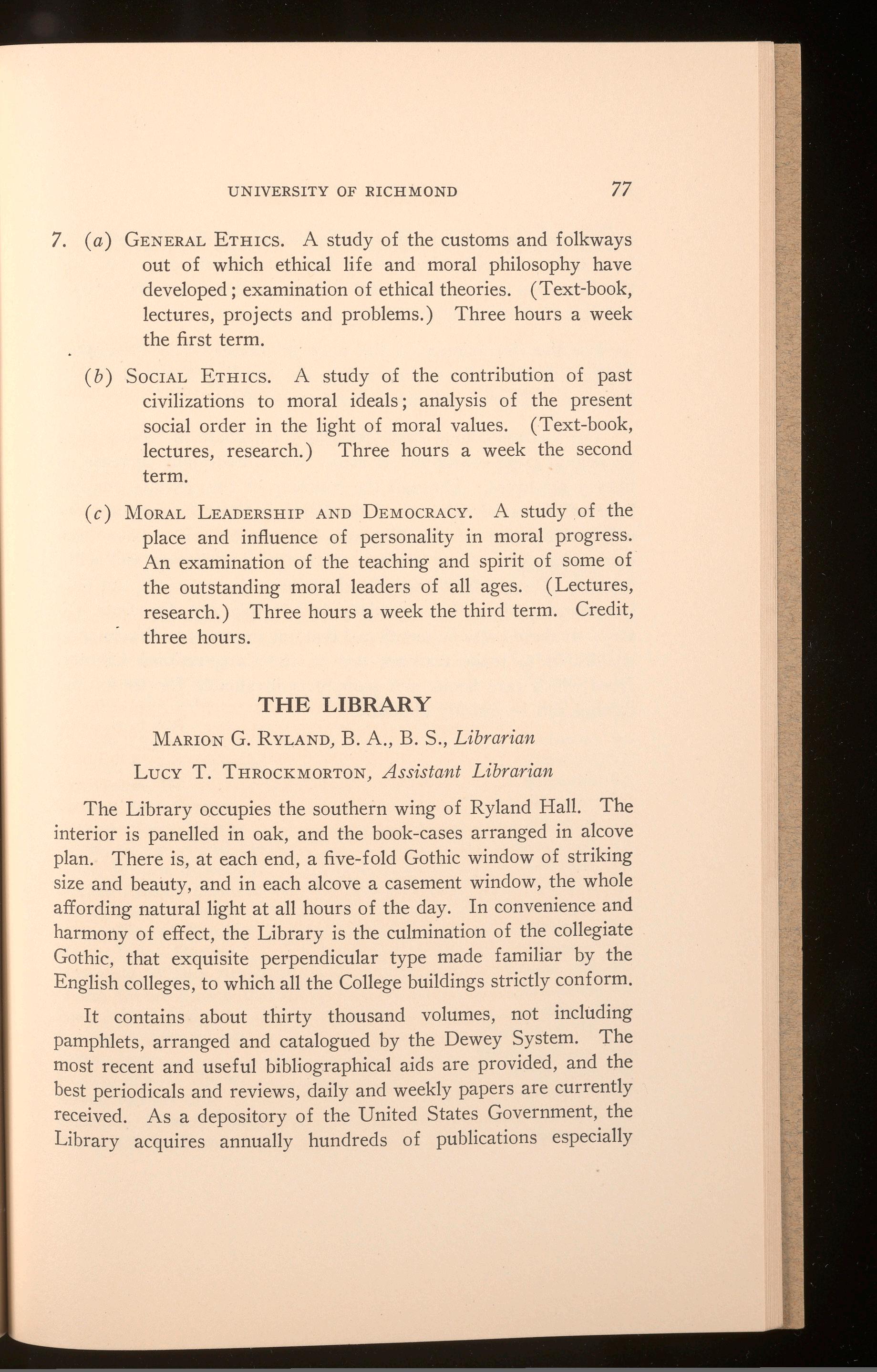
7. (a) GENERALETHICS. A study of the customs and folkways out of which ethical life and moral philosophy have developed; examination of ethical theories. (Text-book, lectures, projects and problems.) Three hours a week the first term.
( b) SOCIAL ETHICS. A study of the contribution of past civilizations to moral ideals; analysis of the present social order in the light of moral values. (Text-book, lectures, research.) Three hours a week the second term.
( c) MoRAL LEADERSHIPAND DEMOCRACY.A study of the place and influence of personality in moral progress. An examination of the teaching and spirit of some of the outstanding moral leaders of all ages. (Lectures, research.) Three hours a week the third term. Credit, three hours.
MARIONG. RYLAND,B. A., B. S., Librarian
Lucy T. THROCKMORTON,Assistant Librarian
The Library occupies the southern wing of Ryland Hall. The interior is panelled in oak, and the book-cases arranged in alcove plan. There is, at each end, a five-fold Gothic window of striking size and beauty, and in each alcove a casement window, the whole affording natural light at all hours of the day. In convenience and harmony of effect, the Library is the culmination of the collegiate Gothic, that exquisite perpendicular type made familiar by the English colleges, to which all the College buildings strictly conform.
It contains about thirty thousand volumes, not including pamphlets, arranged and catalogued by the Dewey System. The most recent and useful bibliographical aids are provided, and the best periodicals and reviews, daily and weekly papers are currently received. As a depository of the United States Government, the Library acquires annually hundreds of publications especially

valuable for reference in social and political science. The students have direct access to the shelves during ten hours each day, and the Librarian and assistants are always on hand to give help in any line of reading or research.
For the convenience of the undergraduates of Westhampton College, there is also maintained in the Reading Room at Westhampton College a well selected reference library.
The College counts itself peculiarly fortunate in having close by several great collections of books, which materially increase its library resources. Through the courtesy of the officials, the one hundred thousand volumes of the Virginia State Library and the unique collection of the Virginia Historical Society have been made accessible to our students, both for consultation and withdrawal. These afford exceptional facilities for research, not only in general subjects, but especially in Virginia and American history. It should also be mentioned that our nearness to Washington enables us to make cqnstant use of the Congressional Library, from which rare books and pamphlets invaluable for theses and debates can be quickly obtained.
Hillhouse, Joseph Newton .............................
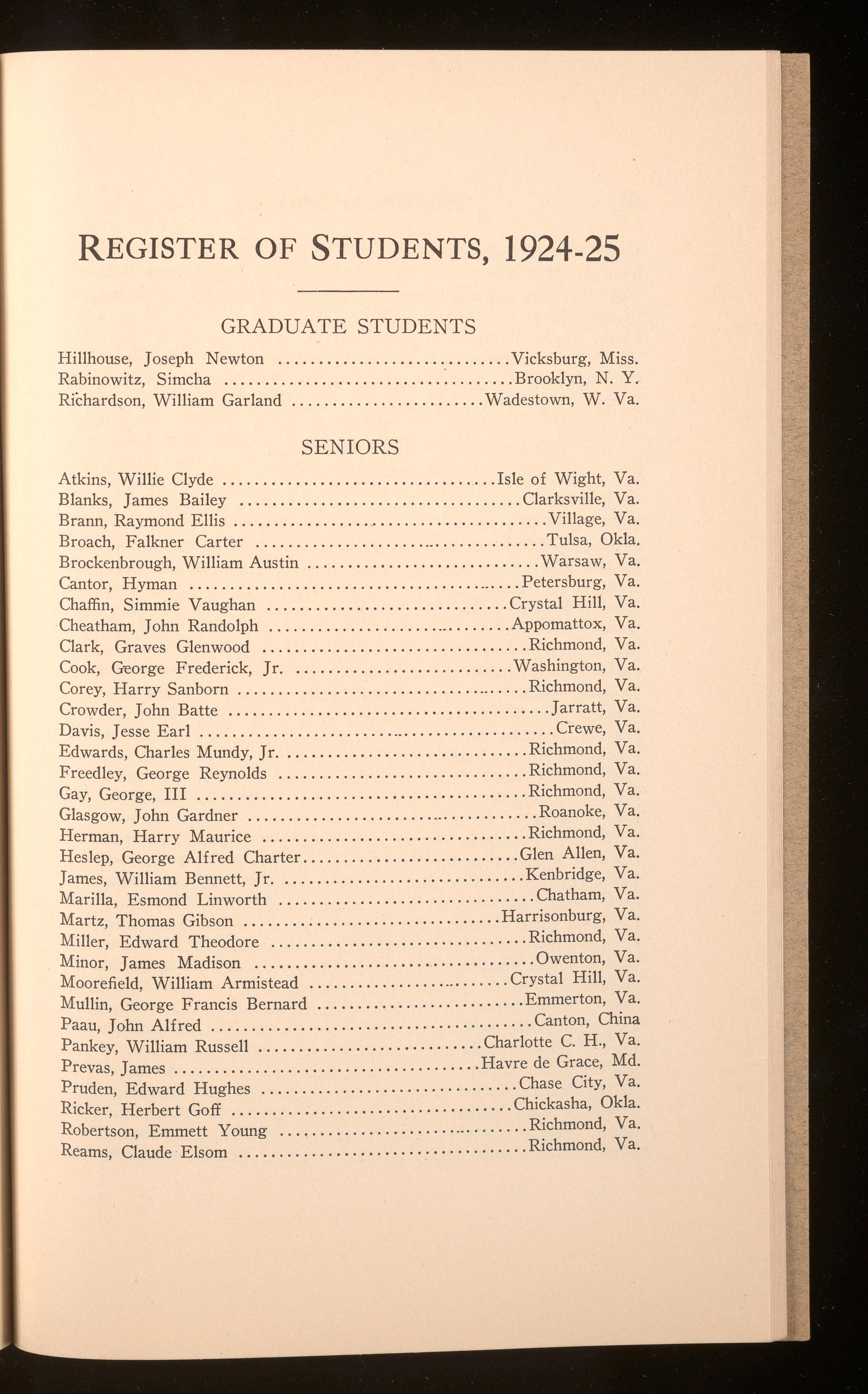
Vicksburg, Miss.
Rabinowitz, Simcha .................................... Brooklyn, N. Y.
Richardson, William Garland Wadestown, W. Va.
Atkins, Willie Clyde .................................. Isle of Wight, Va.
Blanks, James Bailey ................................... Clarksville, Va.
Brann, Raymond Ellis ....................................... Village, Va.
Broach, Falkner Carter ..................................... Tulsa, Okla.
Brockenbrough, William Austin ............................. Warsaw, Va.
Cantor, Hyman .......................................... Petersburg, Va.
Chaffin, Simmie Vaughan .............................. Crystal Hill, Va.
Cheatham, John Randolph ............................... Appomattox, Va.
Clark, Graves Glenwood ................................. Richmond, Va.
Cook, George Frederick, Jr ............................ Washington, Va.
Corey, Harry Sanborn Richmond, Va.
Crowder, John Batte ........................................ Jarratt, Va.
Davis, Jesse Earl ............................................. Crewe, Va.
Edwards, Charles Mundy, Jr ............................... Richmond, Va.
Freedley, George Reynolds Richmond, Va.
Gay, George, III ......................................... Richmond, Va.
Glasgow, John Gardner ..................................... Roanoke, Va.
Herman, Harry Maurice ................................. Richmond, Va.
Heslep, George Alfred Charter ........................... Glen Allen, Va.
James, William Bennett, Jr ............................... Kenbridge, Va.
Marilla, Esmond Lin worth Chatham, Va.
Martz, Thomas Gibson ................................ Harrisonburg, Va.
Miller, Edward Theodore ................................ Richmond, Va.
Minor, James Madison ................................... Owenton, Va.
Moorefield, William Armistead Crystal Hill, Va.
Mullin, George Francis Bernard .......................... Emmerton, Va.
Paau, John Alfred ........................................ Canton, China
Pankey, William Russell ............................ Charlotte C. H., Va.
Prevas, James ...................................... Havre de Grace, Md.
Pruden, Edward Hughes ................................ Chase City, Va.
Ricker, Herbert Goff ................................... Chickasha, Okla.
Robertson, Emmett Young ................................ Richmond, Va.
Reams, Claude Elsom .................................... Richmond, Va.
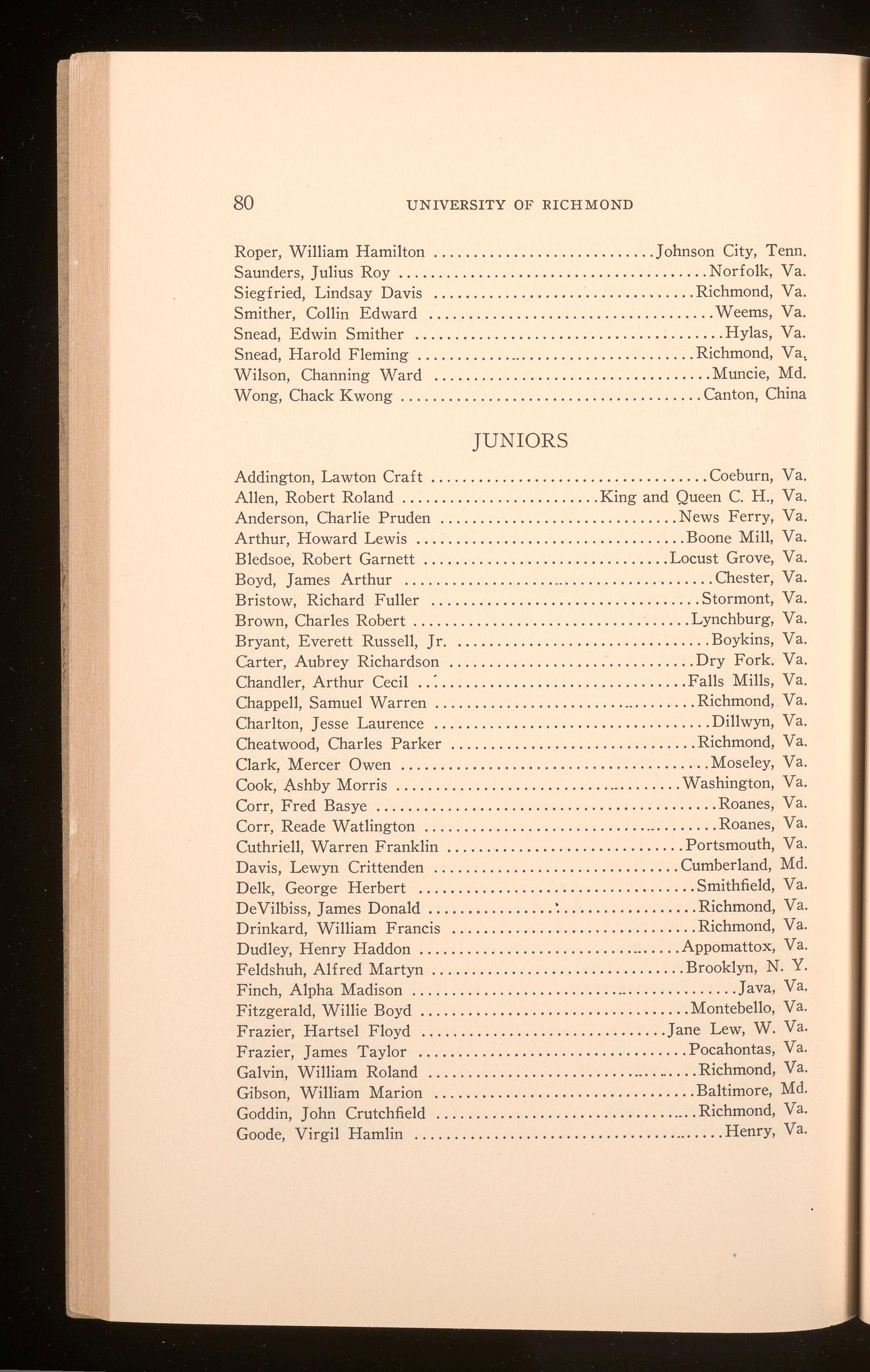
Roper, William Hamilton Johnson City, Tenn. Saunders, Julius Roy ....................................... Norfolk, Va. Siegfried, Lindsay Davis ................................. Richmond, Va. Smither, Collin Edward .................................... Weems, Va.
Snead, Edwin Smither ....................................... Hylas, Va. Snead, Harold Fleming .................................... Richmond, Va, Wilson, Channing Ward ................................... Muncie, Md. Wong, Chack Kwong ...................................... Canton, China
Addington, Lawton Craft ................................... Coeburn, Va.
Allen, Robert Roland ......................... King and Queen C. H., Va. Anderson, Charlie Pruden .............................. News Ferry, Va. Arthur, Howard Lewis .................................. Boone Mill, Va. Bledsoe, Robert Garnett ............................... Locust Grove, Va. Boyd, James Arthur ........................................ Chester, Va. Bristow, Richard Fuller .................................. Stormont, Va. Brown, Charles Robert ................................... Lynchburg, Va. Bryant, Everett Russell, Jr ................................. Boykins, Va. Carter, Aubrey Richardson ............................... Dry Fork. Va. Chandler, Arthur Cecil .. : ............................... Falls Mills, Va.
Chappell, Samuel Warren .................................. Richmond, Va. Charlton, Jesse Laurence Dillwyn, Va Cheatwood, Charles Parker Richmond, Va. Clark, Mercer Owen Moseley, Va. Cook, .Ashby Morris Washington, Va. Corr, Fred Basye Roanes, Va. Corr, Reade Watlington ...................................... Roanes, Va . Cuthriell, Warren Franklin .............................. Portsmouth, Va. Davis, Lewyn Crittenden ............................... Cumberland, Md. Delk, George Herbert ................................... Smithfield, Va. DeVilbiss, James Donald : Richmond, Va. Drinkard, William Francis ............................... Richmond, Va. Dudley, Henry Haddon .................................. Appomattox, Va. Feldshuh, Alfred Martyn ................................ Brooklyn, N. Y. Finch, Alpha Madison .......................................... Java, Va. Fitzgerald, Willie Boyd .................................. Montebello, Va. Frazier, Hartse! Floyd ............................... Jane Lew, W. Va. Frazier, James Taylor Pocahontas, Va. Galvin, William Roland .................................... Richmond, Va. Gibson, William Marion ................................. Baltimore, Md. Goddin, John Crutchfield .................................. Richmond, Va. Goode, Virgil Hamlin ........................................ Henry, Va.

Green, Jesse Carroll ......................................... Crewe, Va.
Green, Norvell Ryland ................................. Richardsville, Va.
Hare, Elmer Calvert, Jr .................................. Richmond, Va.
Hart, Joseph Ogburn .................................... Union Level, Va.
Hicks, Guy Dewey .................................... South Boston, Va.
Hoshall, Clifford Earle Baltimore, Md. Hunnicutt, Thomas Nathanal Newport News, Va.
Isenhour, Frederick Sylvester Concord, N. C.
King, Earle Rudolph Richmond, Va.
Kite, Cecil Earl ........................................... Stanley, Va.
Lam, Wing Hei ........................................... Canton, China
Lansdell, Cyrus Hudson Bluefield, W. Va.
Lutz, John Mark Richmond, Va.
McCorkle, Wm. Claiborne ........................... Johnson City, Tenn.
Mahaney, James Moyer .............................. Oifton Forge, Va.
Martin, Claude Benton .................................. Martinsville, Va.
Miller, David Morris .................................... Lynchburg, Va.
Milner, Morris Edwin ..................................... Richmond, Va.
Moore, Charles Dutton ................................... Richmond, Va.
Newcomb, Walker Howell ............................ Oifton Forge, Va. Newman, Sigmund ....................................... Richmond, Va.
Nicholls, Richard Newport News, Va.
Pankey, George Edward Charlotte C. H., Va. Parker, Leslie Alton Carson, Va. Payne, Roland William Richmond, Va.
Powell, Lucian Linwood Chincoteague, Va.
Robinson, Calvin Howell .................................. Onancock, Va.
Rogers, Albert Alan .......................................... Wilson, Va.
Salomonsky, George Howard Richmond, Va.
Smithers, Herbert Landrum Richmond, Va. Stepanian, Antranig Stephan .............................. Richmond, Va.
Swanson, Frederick Ralph ............................... Cumberland, Md. Swanson, John Chester Cumberland, Md.
Tatum, John Udriet ...................................... Richmond, Va.
Tracy, James Hardson ................................... Dumbarton, Va.
Upp, Lloyd Henry ....................................... Fletcher, Ohio
Vitsky, Meyer Richmond, Va.
Walden, Kennon Christian ................................. Richmond, Va.
Waldron, Harry Morton Thaxton, Va.
White, George Cary ...................................... Richmond, Va.
Whitfield, Theodore Marshall ............................. Richmond, Va.
Wilkins, Gordon Armstrong Monroe Hall, Va.
Wingo, Alfred Lawrence Amelia, Va. Wood, Thomas Fowler ................................... Richmond, Va.

UNIVERSITY OF RICHMOND
Atkins, William Hiter .................................... Richmond, Va.
Baars, Fred Wilkes ................................... Little Rock, Ark.
Babcock, Alvin Judson ................................. Chase City, Va.
Beale, Carroll Howell ..................................... Franklin, Va."
Bennett, Humphrey Ray .................................. Ringgold, Va.
Bentley, William C., Jr. ................................... Richmond, Va.
Brooks, Charlie Sale .................................. Bowling Green, Va.
Brown, James Richard ................................... Richmond, Va.
Butler, Harry Gains ...................................... Culpeper, Va.
Campbell, Thomas Elliott, Jr ............................... Milford, Va.
Cheatham, Robert Benjamin ............................... Richmond, Va.
Choate, Allyn Blythe ................................. Huntersville, N. C.
Clary, John Norwood ..................................... Richmond, Va.
Clements, Luther Raden ................................... Nathalie, Va.
Clements, Peter Henry .................................... Stancell, N. C.
Cooke, Nicholas T., Jr .................................... Richmond, Va.
Cooke, Samuel Leonard .................................... Callands, Va.
Creath, Phillip Aylett ........................................ Paces, Va.
Crute, Otey Spencer ....... ·.................................. Halifax, Va.
Davis, Charles Wingfield ................................. Richmond, Va.
Dawson, Winston Fauntleroy .............................. Richmond, Va.
Denson, William Brokaw ................................ Woodford, Va.
Dunn, Christopher Lee ........................ ; ................ Atlee, Va.
Dunsmore, Henry Hiter .................................. Richmond, Va.
Duval, Addison McGuire .............................. Rhoadesville, Va. Ferguson, George Blair .................................... Danville, Va. Fishman, Abner Stephen ................................. Brooklyn, N. Y. Fleming, Russell Joseph .............................. New Haven, Conn. Ford, Eugene Elwood .................................... Richmond, Va. Foster, Albert White ....................•................ Richmond, Va. Fry, William Judson , .................................... Wilmington, Va. German, Minter Peyton .................................... Ballston, Va.
Gibson, Mack Lee ....................................... Cordova, S. C Glenn, James Price .................................... High Point, N. C.
Habel, Samuel Tilden, Jr .................................... Amelia, Va.
Harmanson, Lewis James ................................. Onancock, Va. Hartz, Edwin Lee ......................................... Richmond, Va. Hartz, Ramon Dabney .................................... Richmond, Va. Hash, John Wendell .................................. : Chancellor, Va. Hatcher, William Franklin ............................ Oifton Forge, Va. Hicks, Joseph Emerson ................................... Baltimore, Md. Hill, Harry Lothair ................................... Greenville, S. C.

Hilliard, Ben ............................................. Richmond, Va.
Hitt, Milton Grimsley ..................................... Castleton, Va.
Hood, Wilton Parker .................................... Richmond, Va.
James, John Bruce ........................................ Danville, Va.
Jennings, De Roy Cage ............................. Republican Grove, Va.
Jones, Robert Randolph .................................... Dillwyn, Va.
JQnes, William Stillwell ................................ Nassawadox, Va.
Kaminsky, Jake .......................................... Richmond, Va.
Klein, Samuel Meyer ...................................... Richmond, Va.
Lambeth, Jesse Parker, Jr ................................ Richmond, Va.
Lee, Kenneth Franklyn .......................... Petersburg, Va.
Lewis, Robert Ernest Tyler ............................... Hampton, Va.
Logan, Martin James ..................................... Richmond, Va.
McGraham, George Howard ........................... Glenn Allen, Va.
McNickle, Thomas Armour ............................... Richmond, Va.
McRae, Thomas Kenneth ................................ Richmond, Va.
Martin, Julian Dwight ................................... Florence, S. C.
Minter, Basil Coleman .................................. Martinsville, Va.
Mitchell, Samuel Williams .................................. Crozier, Va.
Mok, Ki.Pg ............................................... Canton, China
Moore, Joseph Mahon .................................... Petersburg, Va.
Moore, William Robinson ............................... Churchview, Va.
Myers, Cooper Louis ...................................... Ringgold, Va.
Mylum, Otis Brantley .................................... Ringgold, Va.
Noffsinger, Theodore Jacob ............................. Eagle Rock, Va.
Norman, William Ernest ........................... Mirror Lake, Canada
Nunnally, Claude Alexander .............................. Richmond, Va.
Parker, Clyde Norwood ..................................... Carson, Va.
Parrish, Bernard Lee ....................... ; .............. Richmond, Va.
Patteson, Moncure Perkins ............................... Richmond, Va.
Patton, Beverley Kennon .................................. Bon Air, Va.
Pebworth, Otto Wells ..................................... Norfolk, Va.
Penney, Perry Montague ............................. Bowling Green, Va.
Poindexter, Garnett Ross, Jr ........................ Fredericks Hall, Va.
Pregnall, James Percy, Jr ................................. Richmond, Va.
Pullen, Francis Davison, Jr. ............................. Baltimore, Md.
Ragozzino, Albert ................................... New Haven, Conn.
Richardson, Herman Montague ........................... Richmond, Va.
Rogers, William Cates by ........................... Newport News, Va.
Rouse, Paul Gibson .......................................... Marion, Va.
Saunders, Clarence Aubrey .................................. Moneta, Va.
Sene, Tsz Lung .......................................... Canton, China
Simpkins, George Franklin ............................... Richmond, Va.
Slaughter, Richard Franklin ............................... Hampton, Va.
84
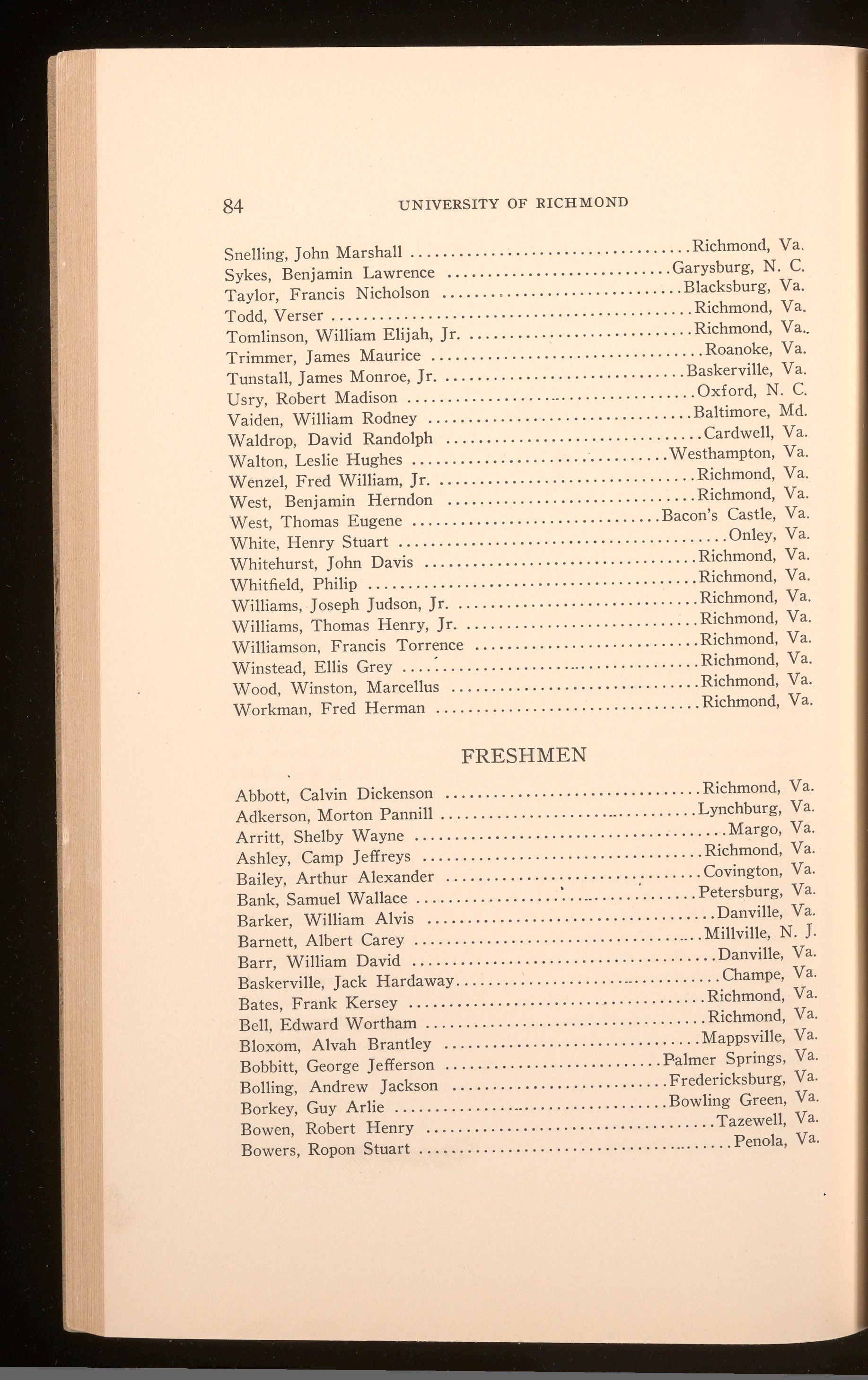
Snelling, John Marshall ................................... Richmond, Va.
Sykes, Benjamin Lawrence ............................ Garysburg, N. C.
Taylor, Francis Nicholson .............................. Blacksburg, Va.
Todd, Verser ............................................. Richmond, Va.
Tomlinson, William Elijah, Jr ............................. Richmond, Va ..
Trimmer, James Maurice .................................. Roanoke, Va.
Tunstall, James Monroe, Jr ............................... Baskerville, Va.
Usry, Robert Madison ..................................... Oxford, N. C.
Vaiden, William Rodney ................................. Baltimore, Md.
Waldrop, David Randolph ................................ Cardwell, Va.
Walton, Leslie Hughes ................................ Westhampton, Va.
Wenzel, Fred William, Jr ................................. Richmond, Va.
West, Benjamin Herndon ............................... Richmond, Va.
West, Thomas Eugene ...............................
Bacon's Castle, Va.
White, Henry Stuart ......................................... Onley, Va.
Whitehurst, John Davis .................................. Richmond, Va.
Whitfield, Philip ......................................... Richmond, Va.
Williams, Joseph Judson, Jr ............................... Richmond, Va.
'Williams, Thomas Henry, Jr .............................. Richmond, Va.
Williamson, Francis Torrence ............................ Richmond, Va.
Winstead, Ellis Grey .... : ................................. Richmond, Va.
Wood, Winston, Marcellus ............................... Richmond, Va.
Workman, Fred Herman ................................. Richmond, Va.
Abbott, Calvin Dickenson ................................ Richmond, Va.
Adkerson, Morton Pannill ................................. Lynchburg, Va.
Arritt, Shelby Wayne ....................................... Margo, Va.
Ashley, Camp Jeffreys ................................... Richmond, Va.
Bailey, Arthur Alexander ................................ Covington, Va.
Bank, Samuel Wallace .................. •.......... .' ....... Petersburg, Va.
Barker, William Alvis .................................... Danville, Va.
Barnett, Albert Carey ..................................... Millville, N. J.
Barr, William David ...................................... Danville, Va.
Baskerville, Jack Hardaway .................................. Champe, Va.
Bates, Frank Kersey ..................................... Richmond, Va.
Bell, Edward Wortham ................................... Richmond, Va.
Bloxom, Alvah Brantley ................................ Mappsville, Va.
Bobbitt, George Jefferson ........................... Palmer Springs, Va.
Bolling, Andrew Jackson ........................... Fredericksburg, Va.
Borkey, Guy Arlie ................................... Bowling Green, Va.
Bowen, Robert Henry .................................... Tazewell, Va.
Bowers, Ropon Stuart ........................................ Penola, Va.
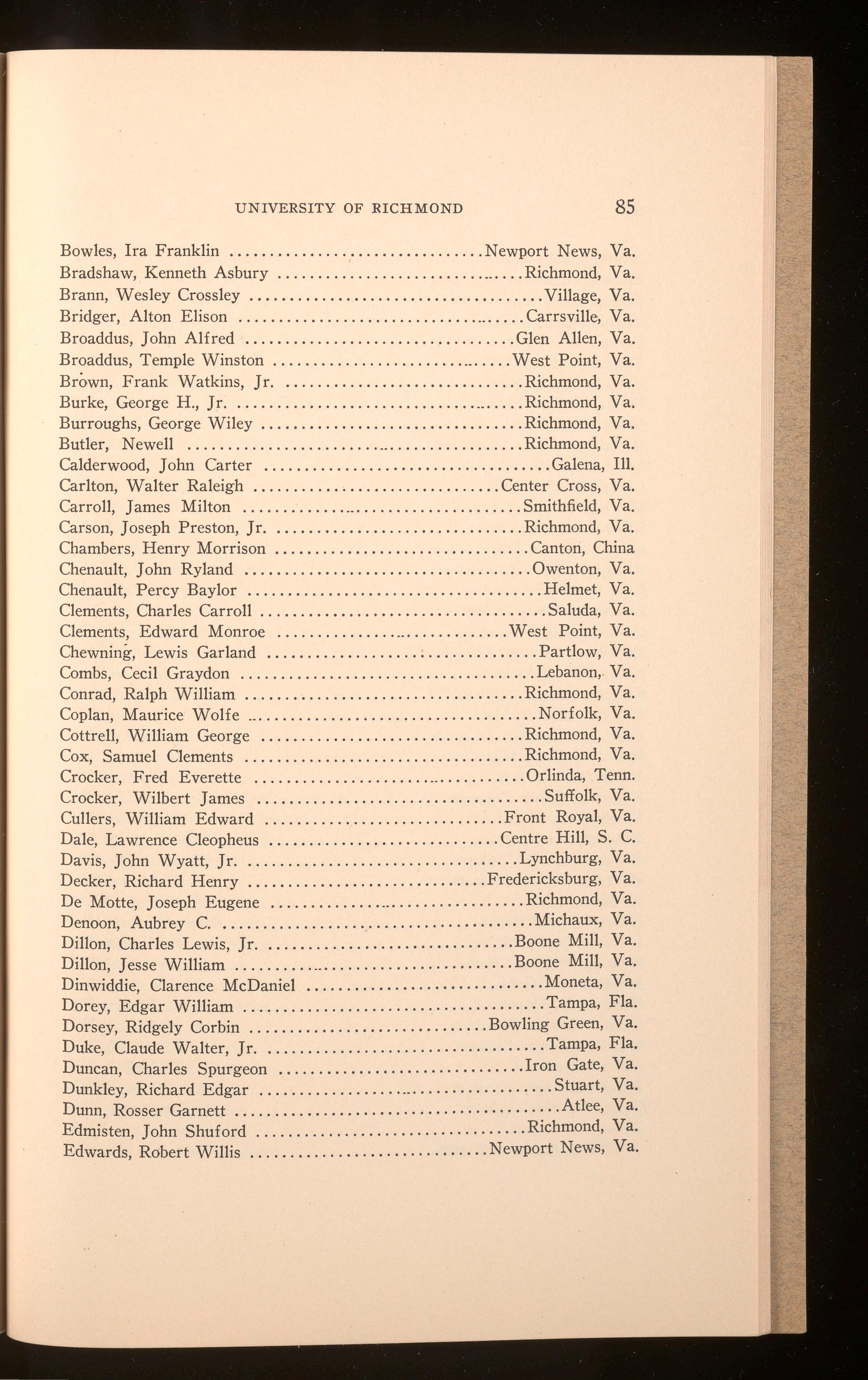
Bowles, Ira Franklin Newport News, Va.
Bradshaw, Kenneth Asbury Richmond, Va.
Brann, Wesley Crossley Village, Va.
Bridger, Alton Elison ..................................... Carrsville, Va.
Broaddus, John Alfred .................................. Glen Allen, Va.
Broaddus, Temple Winston ............................... West Point, Va.
Brown, Frank Watkins, Jr ............................... Richmond, Va.
Burke, George H., Jr Richmond, Va.
Burroughs, George Wiley Richmond, Va.
Butler, Newell Richmond, Va.
Calderwood, John Carter Galena, 111.
Carlton, Walter Raleigh ............................... Center Cross, Va.
Carroll, James Milton Smithfield, Va.
Carson, Joseph Preston, Jr ................................ Richmond, Va.
Chambers, Henry Morrison ................................ Canton, China
Chenault, John Ryland .................................... Owenton, Va.
Chenault, Percy Baylor ..................................... Helmet, Va.
Clements, Charles Carroll .................................... Saluda, Va.
Clements, Edward Monroe West Point, Va.
Chewning, Lewis Garland ................... : .............. Partlow, Va.
Combs, Cecil Graydon ..................................... Lebanon, . Va.
Conrad, Ralph William ................................... Richmond, Va.
Coplan, Maurice Wolfe Norfolk, Va.
Cottrell, William George Richmond, Va.
Cox, Samuel Clements ................................... Richmond, Va.
Crocker, Fred Everette ................................... Orlinda, Tenn.
Crocker, Wilbert James .................................... Suffolk, Va.
Cullers, William Edward Front Royal, Va. Dale, Lawrence Cleopheus ............................. Centre Hill, S. C.
Davis, John Wyatt, Jr ................................... Lynchburg, Va.
Decker, Richard Henry .............................. Fredericksburg, Va.
De Motte, Joseph Eugene ................................. Richmond, Va.
Denoon, Aubrey C. ....................................... Michaux, Va.
Dillon, Charles Lewis, Jr ................................ Boone Mill, Va. Dillon, Jesse William .................................... Boone Mill, Va.
Dinwiddie Clarence McDaniel Moneta, Va.
Dorey, Edgar William ...................................... Tampa, Fla.
Dorsey, Ridgely Corbin .............................. Bowling Green, Va.
Duke, Claude Walter, Jr .................................... Tampa, Fla.
Duncan, Charles Spurgeon ............................... Iron Gate, Va.
Dunkley, Richard Edgar ...................................... Stuart, Va.
Dunn, Rosser Garnett ......................................... Atlee, Va.
Edmisten, John Shuford .................................. Richmond, Va.
Edwards, Robert Willis .............................. Newport News, Va.
Elliott, Jonah A. ..............................
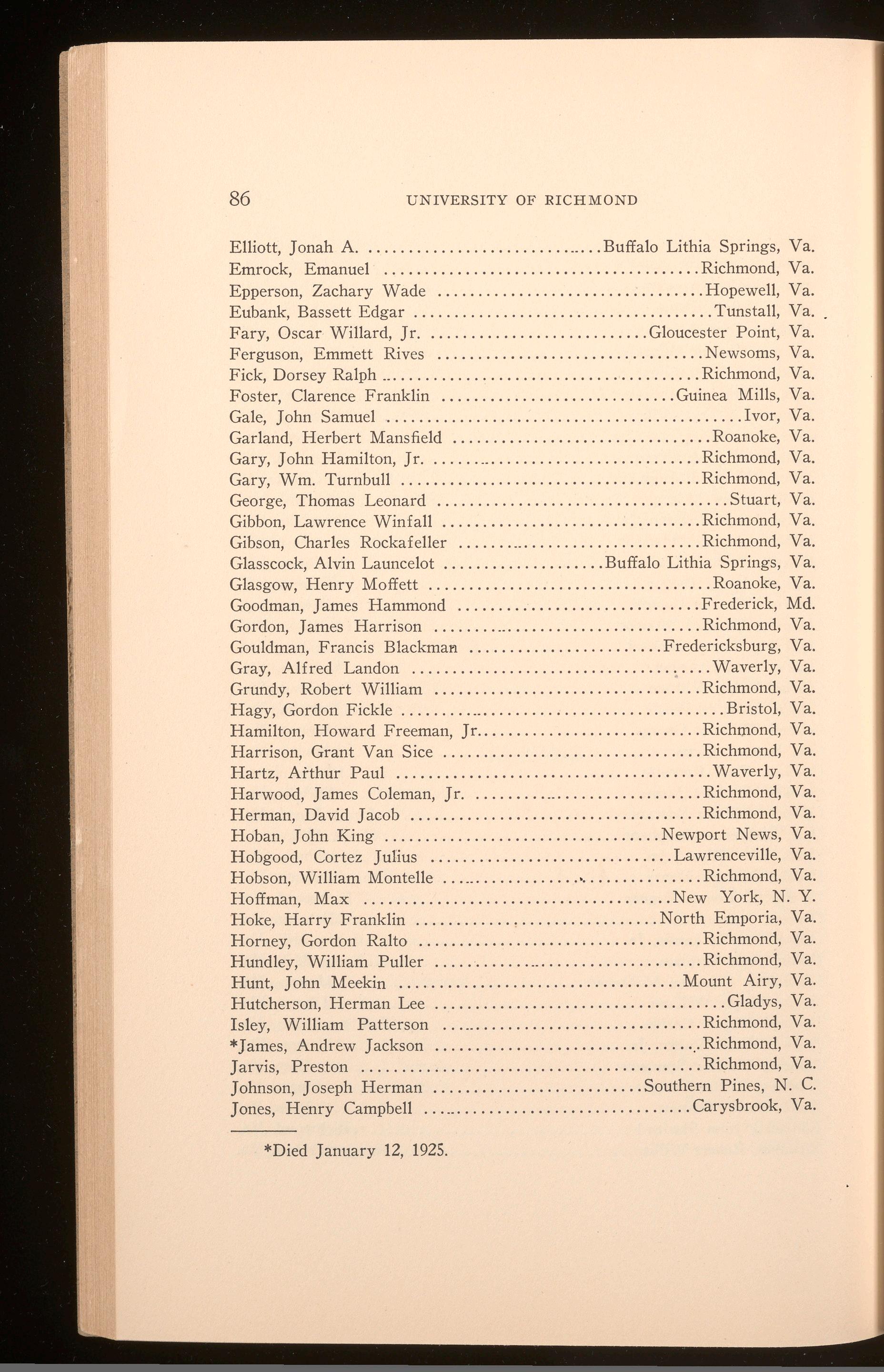
Buffalo Lithia Springs, Va.
Emrock, Emanuel ....................................... Richmond, Va.
Epperson, Zachary Wade ................................. Hopewell, Va.
Eubank, Bassett Edgar ..................................... Tunstall, Va.
Fary, Oscar Willard, Jr. Gloucester Point, Va. Ferguson, Emmett Rives ................................. Newsoms, Va.
Fick, Dorsey Ralph ........................................ Richmond, Va.
Foster, Clarence Franklin ............................. Guinea Mills, Va.
Gale, John Samuel Ivor, Va.
Garland, Herbert Mansfield ................................ Roanoke, Va.
Gary, John Hamilton, Jr ................................... Richmond, Va.
Gary, Wm. Turnbull ..................................... Richmond, Va.
George, Thomas Leonard .................................... Stuart, Va.
Gibbon, Lawrence Winfall ................................ Richmond, Va.
Gibson, Charles Rockafeller ............................... Richmond, Va.
Glasscock, Alvin Launcelot .................... Buffalo Lithia Springs, Va.
Glasgow, Henry Moffett ................................... Roanoke, Va.
Goodman, James Hammond Frederick, Md. Gordon, James Harrison .................................. Richmond, Va.
Gouldman, Francis Blackman ........................ Fredericksburg, Va. Gray, Alfred Landon ..................................... Waverly, Va.
Grundy, Robert William ................................. Richmond, Va.
Hagy, Gordon Fickle ......................................... Bristol, Va.
Hamilton, Howard Freeman, Jr ............................ Richmond, Va.
Harrison, Grant Van Sice ................................ Richmond, Va.
Hartz, Arthur Paul ....................................... Waverly, Va.
Harwood, James Coleman, Jr. . ............................ Richmond, Va.
Herman, David Jacob Richmond, Va.
Hoban, John King .................................. Newport News, Va.
Hobgood, Cortez Julius .............................. Lawrenceville, Va.
Hobson, William Montelle .................................. Richmond, Va.
Hoffman, Max ...................................... New York, N. Y.
Hoke, Harry Franklin North Emporia, Va.
Horney, Gordon Ralto ................................... Richmond, Va.
Hundley, William Puller .................................. Richmond, Va.
Hunt, John Meekin ................................... Mount Airy, Va.
Hutcherson, Herman Lee Gladys, Va.
Isley, William Patterson ................................. Richmond, Va.
*James, Andrew Jackson ................................ _.Richmond, Va.
Jarvis, Preston .......................................... Richmond, Va.
Johnson, Joseph Herman .......................... Southern Pines, N. C.
Jones, Henry Campbell .................................. Carysbrook, Va.
*Died January 12, 1925.
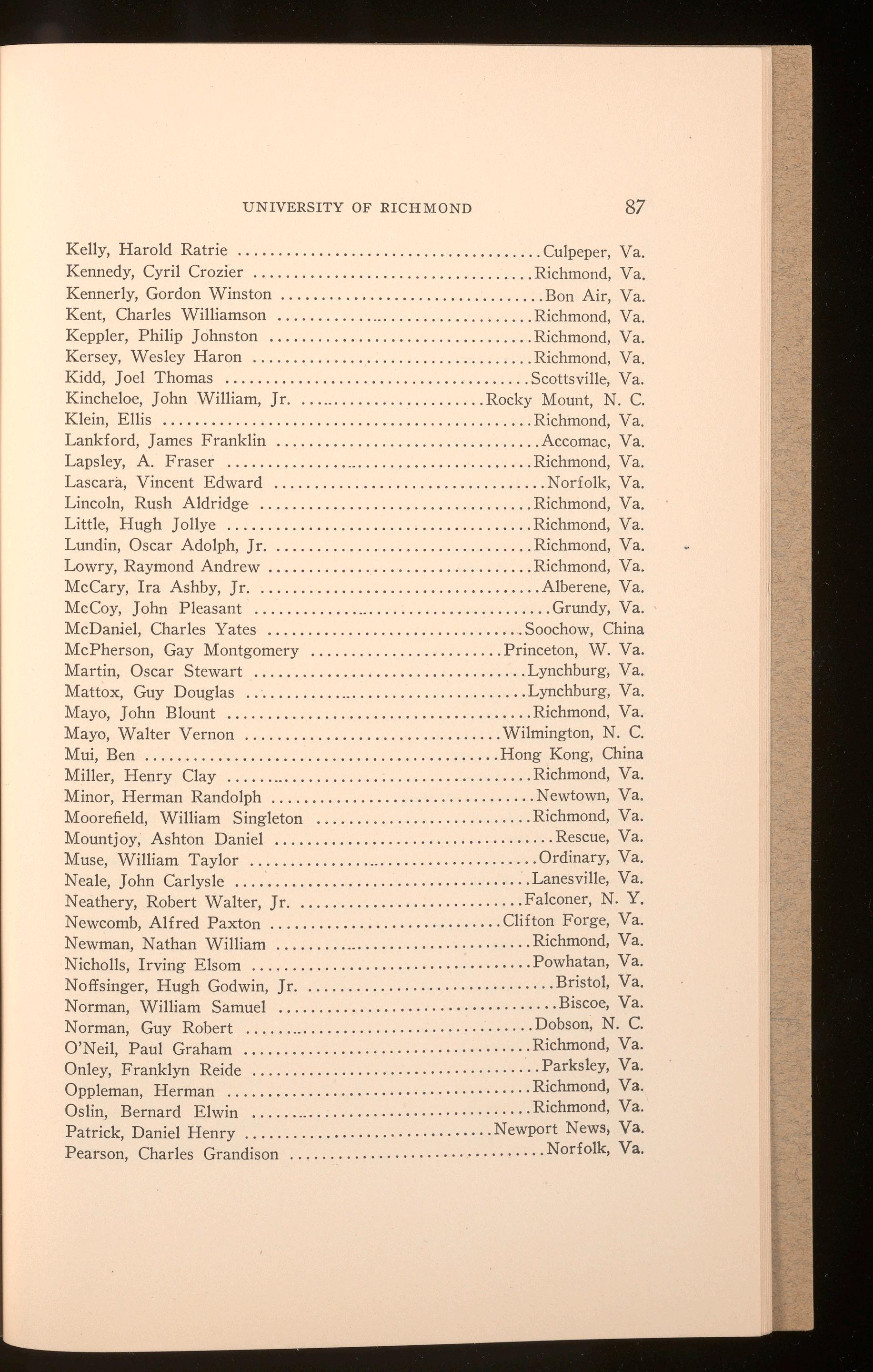
Kelly, Harold Ratrie ...................................... Culpeper, Va.
Kennedy, Cyril Crozier ................................... Richmond, Va.
Kennerly, Gordon Winston ................................. Bon Air, Va.
Kent, Charles Williamson ................................. Richmond, Va.
Keppler, Philip Johnston ................................. Richmond, Va.
Kersey, Wesley Haron ................................... Richmond, Va.
Kidd, Joel Thomas Scottsville, Va.
Kincheloe, John William, Jr.
Rocky Mount, N. C. Klein, Ellis .............................................. Richmond, Va.
Lankford, James Franklin ................................. Accomac, Va.
Lapsley, A. Fraser ....................................... Richmond, Va.
Lascara, Vincent Edward .................................. Norfolk, Va.
Lincoln, Rush Aldridge Richmond, Va.
Little, Hugh Jollye Richmond, Va.
Lundin, Oscar Adolph, Jr ................................. Richmond, Va.
Lowry, Raymond Andrew ................................. Richmond, Va.
McCary, Ira Ashby, Jr Alberene, Va.
McCoy, John Pleasant ...................................... Grundy, Va.
McDaniel, Charles Yates Soochow, China
McPherson, Gay Montgomery Princeton, W. Va.
Martin, Oscar Stewart .................................. Lynchburg, Va.
Mattox, Guy Douglas .................................... Lynchburg, Va.
Mayo, John Blount ...................................... Richmond, Va.
Mayo, Walter Vernon Wilmington, N. C.
Mui, Ben ............................................ Hong Kong, China
Miller, Henry Clay Richmond, Va.
Minor, Herman Randolph ................................. Newtown, Va.
Moorefield, William Singleton Richmond, Va.
Mountjoy, Ashton Daniel Rescue, Va.
Muse, William Taylor ..................................... Ordinary, Va.
Neale, John Carlysle Lanesville, Va.
Neathery, Robert Walter, Jr Falconer, N. Y. Newcomb, Alfred Paxton Clifton Forge, Va. Newman, Nathan William Richmond, Va. Nicholls, Irving Elsom ................................... Powhatan, Va.
Noffsinger, Hugh Godwin, Jr Bristol, Va. Norman, William Samuel Biscoe, Va. Norman, Guy Robert Dobson; N. C. O'Neil, Paul Graham .................................... Richmond, Va.
Onley, Franklyn Reide .................................... Parksley, Va.
Oppleman, Herman ...................................... Richmond, Va.
Oslin, Bernard Elwin Richmond, Va.
Patrick, Daniel Henry ............................... Newport News, Va. Pearson, Charles Grandison ................................ Norfolk, Va.
88

Pearson, Paul Chester ...................................... Enfield, Va.
Peterson, Herbert C., Jr ................................... Richmond, Va.
Pettit, Henry Maynard ................................... Richmond, Va.
Phillips, Cabell Beverly Hatchett Richmond, Va.
Phillips, Ralph George ................................... Hopewell, Va.
Phillips, Walter Blackburn ................................. Richmond, Va.
Pollard, Ramon Arlington ................................ Richmond, Va.
Powell, John Henry ........................................ Myrtle, Va.
Powell, Robert Henry, Jr .................................. Boykins, Va.
Puckett, Charles Willard .................................. Richmond, Va.
Reynolds, Thomas Pierce ................................. Powhatan, Va.
Richardson, Leo McKann ............................... Churchview, Va.
Richardson, Thomas Lee, Jr. ............................ Richmond, Va.
Robins, Roland Clark ........................................ Schley, Va.
Robinson, Joseph Alexander .................................. Palls, Va.
Robinson, Joseph Wyche ................................... Village, Va.
Rollins, P. Benson .......................................... Messick, Va.
Rothschild, Arthur Louis ................................ Richmond, Va.
Rowe, Edward Benjamin .. __............................. Richmond, Va.
Roye, Wyatt Earle ...................................... Richmond, Va.
Rudd, Ashton Cauthorn, Jr ............................. Douglasville, Ga.
Sanford, Thomas Ryland, Jr ........................... South Boston, Va.
Saunders, Homer Stuart ....................................... Ivor, Va.
Saunders, Thomas Alonza, Jr Ivor, Va.
Savory, Edwin Wingfield ............................... Petersburg, Va.
Schneider, Robert Julius ................................. Richmond, Va.
Schoenbaum, Alexander Wilfred .................. Highland Springs, Va.
Scott, Norman Edward Red Bank, N. J. Seal, Henry Lohr .......................................... Radiant, Va.
Shands, Arthur Daniel ..................... , ................. Carson, Va.
Shands, William Eppes ..................................... Carson, Va.
Sharp, Garland Hill ...................................... Richmond, Va.
Shelburne, James Crumpton ................................ Danville, Va.
Shelby, Lionel Theodore ................................. Hopewell, Va.
Shell, Willis Andrew, Jr Newport News, Va.
Sheriff, Wilbur Spencer .•................................ Camden, N. J.
Shockley, Martin Staples .................................... Stuart, Va.
Sibold, Robert Nelson Roanoke, Va.
Simons, Joseph William ............................... : .. Windsor, Va.
Slagle, Linwood Ralph .............................. North Emporia, Va.
Smith, Walter Lee .................................... Peters Creek, Va.
Smither, William Clyde .................................... Weems, Va.
Smithers, John Morgan .................................. Dragon ville, Va.
Sneade, Frank W ........................................ Rawlings, Va.
Sowell, Benjamin Luther ............................

Buenos Aires, Arg.
Spose, Alfred Rudolph .............................. New Haven, Conn.
Stevens, Francis Valentine ................................ Richmond, Va.
Stephenson, Edward Henry .................................... Ivor, Va.
Stubbs, Perry Roderick .................................... Staunton, Va
.Tanner, Winston Rudell ................................. Petersburg, Va.
Taylor, Edwin Chisholm .................................. Richmond, Va.
Tharpe, Lester Everett ....................................... Luray, Va.
Thompson, William George .............................. Richmond, Va.
Tom, Yung Cheun ................................... Hong Kong, China
Tomlinson, Aubrey Strathmore ............................... Berkley, Va.
Turner, Cowles Anthony Davis ........................... Richmond, Va.
Vandegrift, William Addison ........................... Cumberland, Md.
Vaughan, Elliott Toler ....................................... Mica, Va.
Vaughan, Robert Victor .................................. Richmond, Va.
Waddell, John Chesleigh ................................. Richmond, Va.
Waldrop, George Archer .................................. Cardwell, Va.
Warren, Almon Vaden ......................................... Witt, Va.
Wayman, Thomas Brent .................................. Kilmarnock, Va.
Weaver, Kenneth Faulkner .............................. Richmond, Va.
Wells, Perry Atkinson .................................... Petersburg, Va.
White, Joseph Proctor, Jr ................................. Hampton, Va.
Wiggins, Joe Darden ..................................... Franklin, Va.
Wiggins, John Bowers ..................................... Franklin, Va.
Wilkinson, Raymond .................................... Richmond, Va.
Williams, Marion Eugene ................................. Franklin, Va.
Willis, Absalom Graves .................................... Lignum, Va.
Willis, Lyman Squire ...................................... Bartow, Fla.
Wiltshire, Hunter Bowman .............................. Richmond, Va.
Witten, Eb. Howard ....................................... Hatton, Va.
Wolfe, Harry Almon .................................... Richmond, Va.
Woodson, Charles Dutton ................................. Richmond, Va.
Wray, Desmond Carlisle ................................. Lexington, Va.
Wynne, Waller, Jr. ....................................... Richmond, Va.
Adams, Henry Edwards ................................. Richmond, Va.
Atkins, Runie Judson ................................. Isle of Wight, Va.
Bryant, Harvey Lee ..................................... Richmond, Va.
Burton, Walter Thomas .................................. Richmond, Va.
Copley, Ernest Lee ...................................... Richmond, Va.
Cummins, Frank Nathaniel ............................... Petersburg, Va.
*Creath, Samuel Lewis ....................................... Paces, Va.

Crwnp, Lemuel Carlton Richmond, Va.
Davenport, John Morris Richmond, Va.
Doggins, Earl Howerdton ..................................... Caret, Va.
Dunkum, Rupert Ellis ................................... Richmond, Va.
Evans, Adoniram Judson, Jr Lynchburg, Va.
Gandy, Herschel ......................................... Millville, N. J.
Green, Frederick Allen ................................. Falls Mills, Va.
Harris, Roland Henson ...................................... Manteo, Va.
Jones, James Atwell .................................... Tye River, Va.
Jones, Leslie Leftwich ................................... Richmond, Va.
Lawrence, Walter Lee Richmond, Va.
Lane, Walter Ronald .................................... Roxobel, N. C.
Lyles, Harry Alexandria, Va.
McDonald, Sherman Newton ............................ Baltimore, Md.
*Mizell, Joe Thomas .................................... Richmond, Va.
Mok, Poon Lam Canton, China
Pease, Francis Jackson ................................... Richmond, Va.
Quisenberry, Curry Dickerson ............................ Clinton, Miss.
Ragland, Massie Lee ....................................... Wingina, Va.
Shek, Yue Cheung ........................................ Canton, China
Slaughter, William Edward Baltimore, Md.
Smith, Robert Thomas ................................. Beaver Dam, Va.
Tanner, Benjamin Harry ................................ Falls Mills, Va.
*Turner, Eugene Welford ................................ Richmond, Va.
Wilkinson, Noble Desmond ................................ Richmond, Va.
*Matriculated in the T. C. Williams School of Law but carrying some classes at Richmond College.

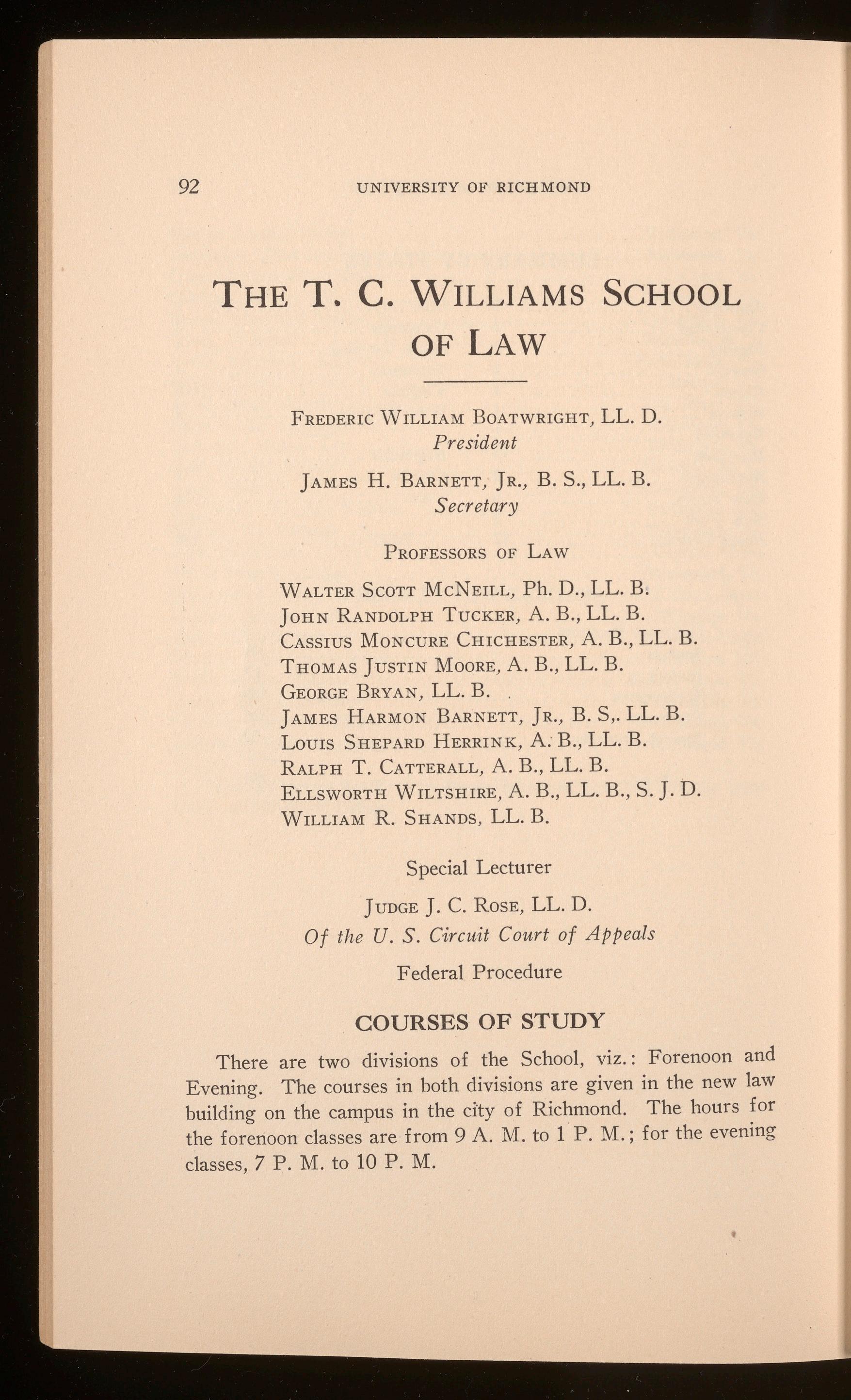
UNIVERSITYOF RICHMOND
FREDERICWILLIAM BOATWRIGHT , LL. D
President
JAMES H. BARNETT, JR., B. s., LL. B.
Secretary
PROFESSORSOF LA w
WALTER ScoTT McNEILL , Ph.D., LL. B.
JOHN RANDOLPH TUCKER, A. B., LL. B.
CASSIUS MONCURE CHICHESTER, A. B., LL. B
THOMAS JUSTIN MOORE , A. B., LL. B.
GEORGEBRYAN, LL. B.
JAMES HARMON BARNETT, JR. , B. s,.LL. B.
Lours SHEPARD HERRINK, A. B., LL. B.
RALPH T. CATTERALL , A. B., LL. B.
ELLSWORTHWILTSHIRE, A. B. , LL. B., s. J D.
WILLIAM R. SHANDS, LL. B.
Special Lecturer
JUDGE J.C. ROSE, LL. D.
Of th e U. S. Circuit Court of Appeals
Federal Procedure
There are two divisions of the School , viz. : Forenoon and Evening. The courses in both divisions are given in the new law building on the campus in the city of Richmond. The hours for the forenoon classes are from 9 A. M to 1 P . M.; for the evening classes, 7 P. M. to 10 P. M.
The Forenoon division has three, and the Evening division has four, years of work leading to the law degree. Regular attendance, satisfactory class room r~citations, and approved written examinations in all of the subjects are required for graduation in either division. No degree candidate is permitted to advance from one class to another, without having successfully completed the work of the preceding class either in this school or the equivalent thereof at some other accredited law school.
Two years of college work are required of all candidates for the law degree.
In 1925 a summer course will be offered covering a period of twelve weeks, consisting of two terms of six weeks each. Matriculates in the summer session are subject to the requirements covering the regular session 1924-'25.
FIRST TERM
Property II-first half. Carriers
Bankruptcy
Bills and Notes
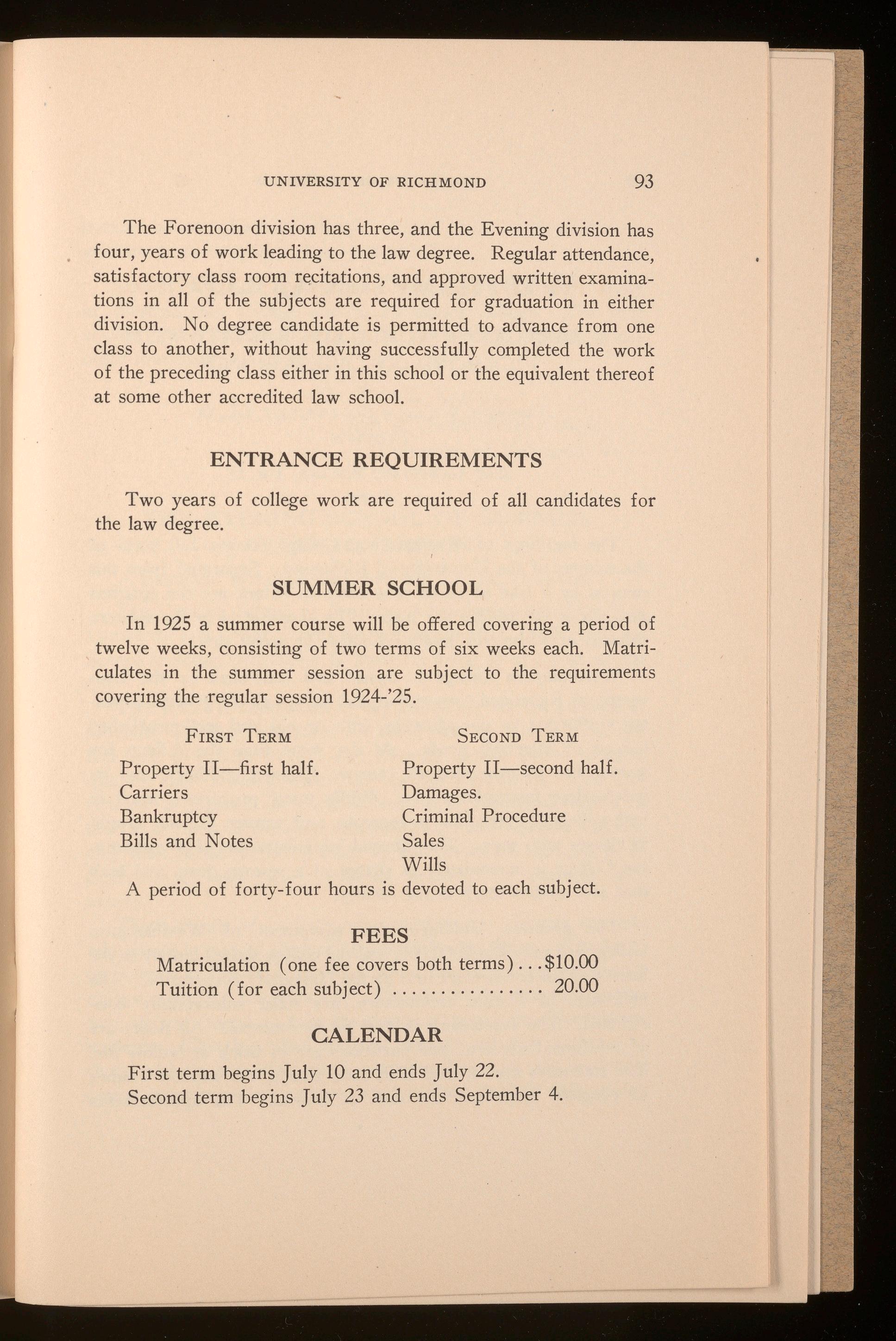
SECOND TERM
Property II-second half. Damages.
Criminal Procedure
Sales
Wills
A period of forty-four hours is devoted to each subject.
Matriculation ( one fee covers both terms) ... $10.00
Tuition ( for each subject) . . . . 20.00
First term begins July 10 and ends July 22. Second term begins July 23 and ends September 4.

UNIVERSITYOF RICHMOND
A COLLEGE FOR WOMEN CO-ORDINATE WITH RICHMOND COLLEGE FOR MEN
FREDERICWILLIAM BOATWRIGHT,LL. D. President
MAY LANSFIELDKELLER, PH. D. Dean
The buildings of Westhampton College occupy 130 acres of the campus of the University of Richmond. Separated from this campus by a lake of about nine acres in extent are the spacious grounds of the college for men. The situation is in the western suburbs of Richmond, easily accessible by street cars.
Westhampton College is owned and controlled by the University of Richmond corporation, and enjoys all the general advantages afforded by co-ordination with an old and well-established college of standard grade. At the same time the college for women has its own separate campus, its own buildings, and its independent institutional life. While many professors teach in both colleges, instruction is separate, and women are not taught in classes with men. The internal administration of W esthampton College is immediately in charge of a woman dean, and both men and women teach in the faculty.
The grounds, buildings, and equipment of Westhampton College are valued at $600,000, and the college shares largely in the benefit of the endowment held by the University corporation. The buildings, of Gothic architecture, are most substantially constructed. The framework is steel set in concrete. All floors are of reinforced concrete, and partitions are of brick or hollow tile. The stairways are of steel with slate treads, the window frames of concrete stone and the sash of bronze. The appointments

throughout are of the very best. Safety, health, and comfort of students have everywhere been considered.
Similar entrance requirements and similar standards apply in Westhampton College and in Richmond College. The next session opens September 16th, 1925. For special catalogue and other information, address
DR. MAY L. KELLER, Dean of Westhampton College, University of
Richmond, Va.
FREDERIC WILLIAM BOATWRIGHT, LL. D., President
The Evening School of Business Administration is located at Lombardy and Grace Streets in part of the T. C. Williams Law School building, convenient to students living in any part of the city.
The School is maintained by the University for the purpose of providing a college education for those who are unable to devote full time to college work. The Evening School allows them to combine their training with their regular occupations. The curriculum is planned on parallel lines with the requirements in the Department of Business Administration in Richmond College, only such variations being made as will enable the students to fit their courses most closely with the needs of the business community.
Three classes of students are provided for: Degree students who desire to take all the work required for the degree of Bachelor of Science in Business Administration; Credit students who wish college credit for the work taken but who, at the time of registration, do not intend to take the degree; Special, or Observation, students. This last class includes students of two kinds: ( 1) those who do not wish credit but who desire to take a certain course or group of courses as an aid to them in their daily work;
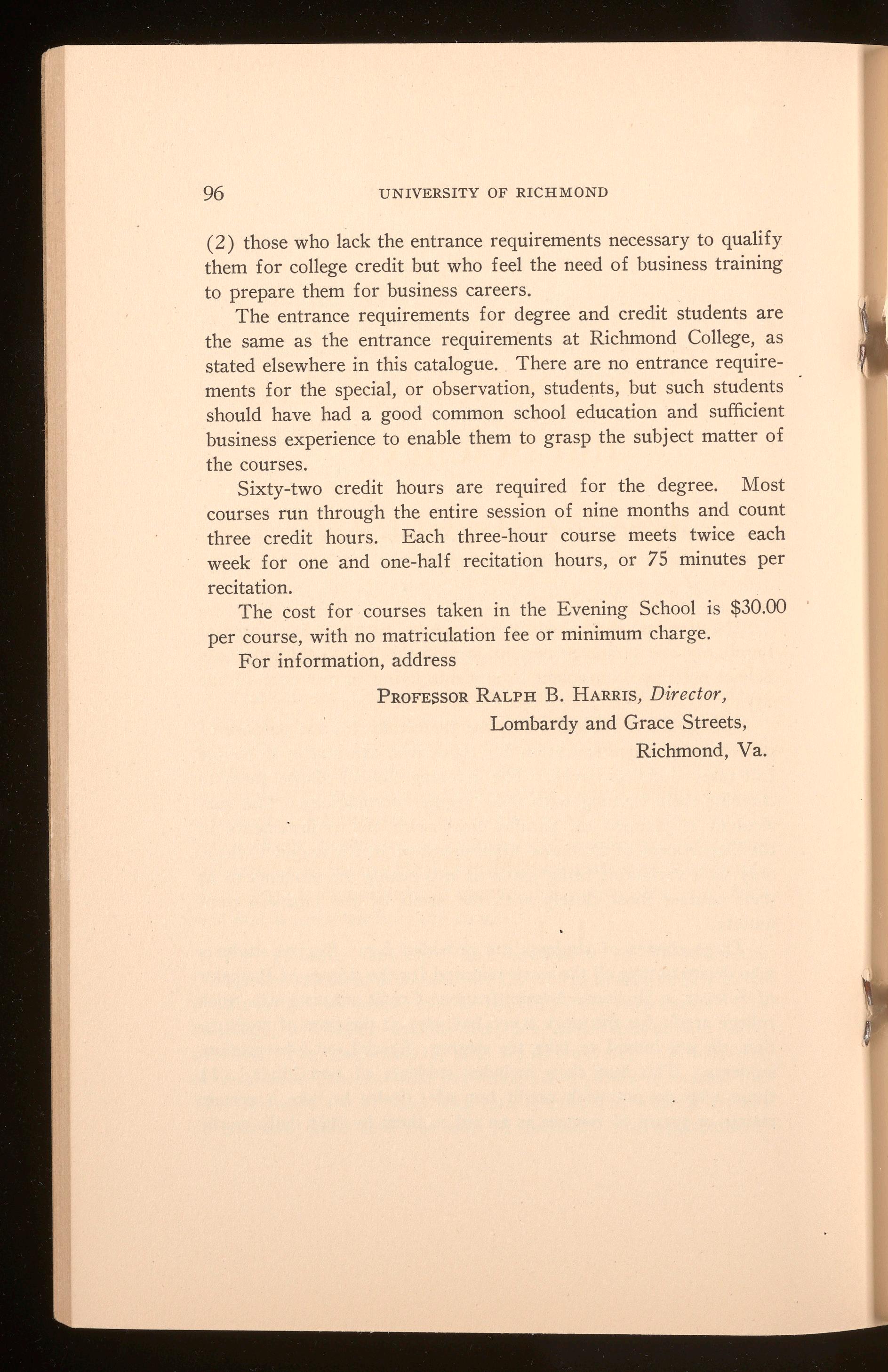
(2) those who lack the entrance requirements necessary to qualify them for college credit but who feel the need of business training to prepare them for business careers.
The entrance requirements for degree and credit students are the same as the entrance requirements at Richmond College, as stated elsewhere in this catalogue. There are no entrance requirements for the special, or observation, students, but such students should have had a good common school education and sufficient business experience to enable them to grasp the subject matter of the courses.
Sixty-two credit hours are required for the degree. Most courses run through the entire session of nine months and count three credit hours. Each three-hour course meets twice each week for one and one-half recitation hours, or 75 minutes per recitation.
The cost for courses taken in the Evening School is $30.00 per course, with no matriculation fee or minimum charge.
For information, address
PROFESSOR RALPH B. HARRIS, Director, Lombardy and Grace Streets, Richmond, Va.
June 22 to August 1, 1925

A course of study lasting six weeks is offered. Various courses suitable to meet the needs of conditioned students, of teachers who wish to obtain the Collegiate Certificate and the Special Certificate will be offered. Certain classes will he formed to enable pre-medical students advantageously to complete preliminary requirements.
For information, address
W. L. PRINCE, DIRECTOR OF THE SUMMER SCHOOL, University
of Richmond, Virginia.
UNIVERSITY OF RICHMOND
SCHEDULE OF CLASSES FOR 1925-1926
MONDAY, WEDNESDAY, FRIDAY
9 :00-9 :SO 10:00-10:50 11 :20-12 :10 12 :20-1 :10 2 :00-2:50
Bible3 Biol.5 Bus. Admn.7(a) Biol. 1 Bus. Admn.l (a)
Biol.6 Bus.Admn.11 Bus. Admn. 16 Bus.Admn.8 Bus. Admn. 15
Bus. Admn.S Econ. 3 Econ. 1 (a) Eng. 2 (b) Eng. 1 (d)
Bus.Admn. 9 Ed. I Eng. 1 (c) French3(a) Eng. 2 (c)
Chem.2 Eng.l(b) Eng.6 Math. 1 (e) Hist. 1 (a)
Eng. 1 (a)
Eng.11 Fr. 2 (b) Math. 4 Lat.2
Eng. 2 (a) Ger. 3 French8 Phys. Tr. Soc.1
French2 (a) Hist.2 Grk. 2 Soc. 5
Greek3 Math. 1 (b) Latin 1 Span. 1 (b)
Math.1 (a) Math. 3 Math. 2
Physics 3 Phys. 1 (a) Phys. 1 (b)
Span. 1 (a) Psych. 1 (a) Span. 5 Span. 3
TUESDAY,THURSDAY,SATURDAY
Bible2 Biol.2 Bus. Admn. 1 (b) *Bus. Admn. 7 (b)
Bus Admn. 6 Biol.4 Chem. I Bus. Admn. 13
Chem.3&4
Bus. Admn. 12 Econ. 2 Bible 1
Eng. 1 (e) Econ. 1 (b)
Fr. 1 (a)
Eng. 1 (f)
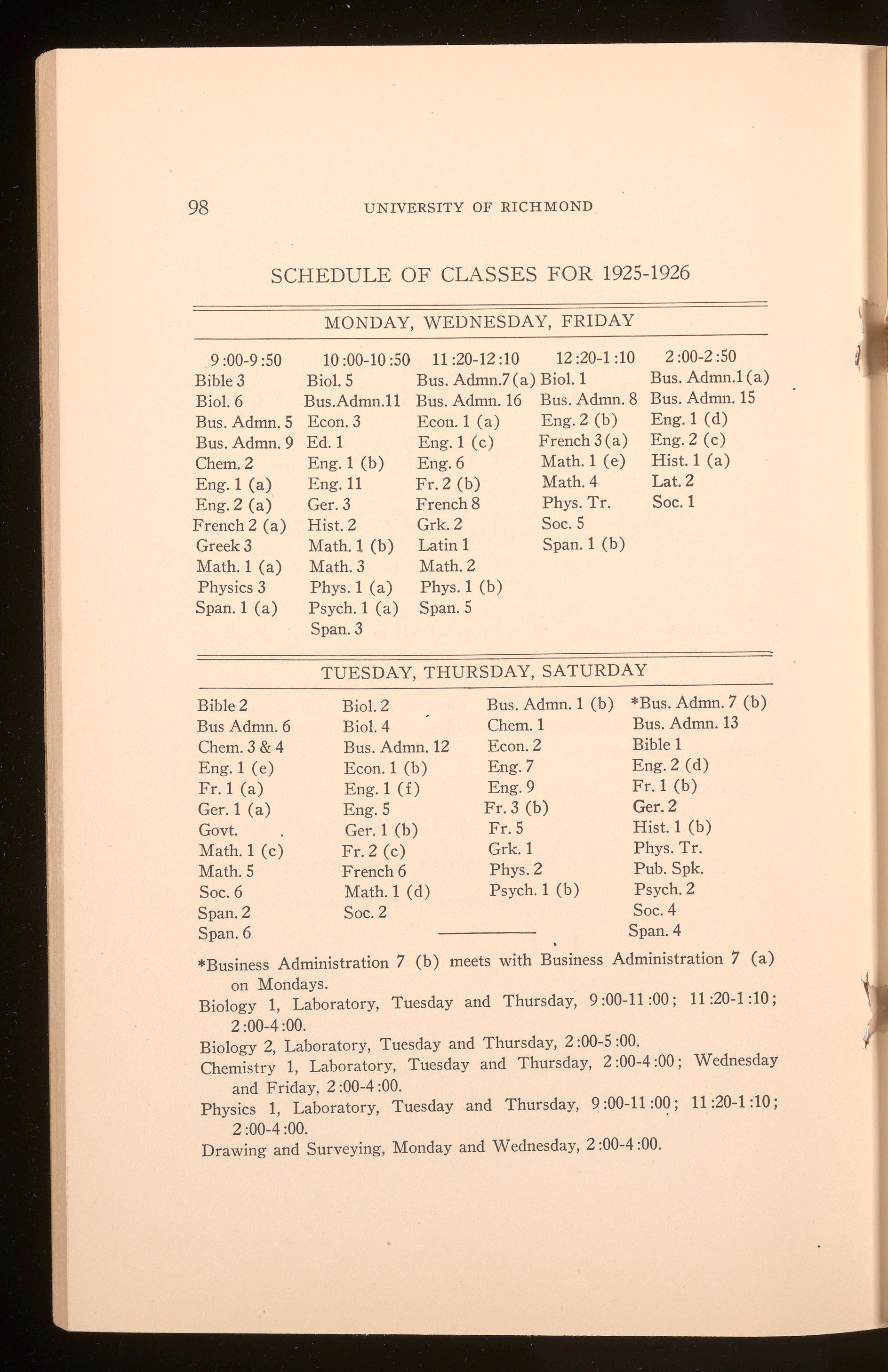
Eng.7 Eng. 2 (d)
Eng.9 Fr. 1 (b)
Ger. 1 (a) Eng. 5 Fr. 3 (b) Ger.2
Govt. Ger. 1 (b) Fr. 5 Hist. 1 (b)
Math. 1 (c) Fr. 2 (c)
Grk.1 Phys. Tr. Math. 5 French 6 Phys. 2 Pub. Spk.
Soc. 6 Math. 1 (d) Psych. 1 (b) Psych. 2
Span.2 Soc. 2 Soc. 4 Span. 6 Span.4
*Business Administration 7 (b) meets with Business Administration 7 (a) on Mondays.
Biology 1, Laboratory, Tuesday and Thursday, 9 :00-11 :00; 11 :20-1 :10; 2 :00-4:00.
Biology 2, Laboratory, Tuesday and Thursday, 2 :00-5 :00.
Chemistry 1, Laboratory, Tuesday and Thursday, 2 :00-4 :00; Wednesday and Friday, 2 :00-4 :00.
Physics 1, Laboratory, Tuesday and Thursday, 9 :00-11 :00; 11 :20-1 :10; 2 :00-4 :00.
Drawing and Surveying, Monday and Wednesday, 2 :00-4 :00.
Absences ........................•
Accredited Schools .. .... :
Administration
Administrative Officers ............ , Admission to College .............. .
Advanced Standing Aid Funds Alumni
Local Chapters ................. Society of .....................
Athletic Association .............. .
Athletics, Regulations Governing · Automatic Rule
Bachelor of Arts ...
Bachelor of Science .............. In Business Administration . ...... Band, University ................
Biblical History and Literature ..... . Biology ...................
Board ...........................
Buildings ........................
Business Administration
Calendar, College Change of Study .................
Chapel Assembly .................
Chemistry ......................
Class Rating of Students ..........
Classes, Schedule of .......•
Committees
Faculty ........................ Trustees .......................
Courses of Instruction .............
E~r~ei~~ri;;
Drawing .........................
Education .......................
English ..
Entrance Examinations
Entrance Requirements ...........
Economics
Examinations For Entrance ..................
Expenses ................
Faculty of Instruction
Faculty Committees ...........•...
General Information
General Regulations
Ger1nan ..................

Grading, System of ..... Greek •....... Health Department .......•........ History ......................... . Laboratory Equipment ............ Latin Law, T. C. Williams School of. Library Staff ............................ Limits of Work .................. Literary Societies .............•.. Loan Funds .... .......... Location and Buildings ........ .•.. Master of Arts .................. Mathematics .............. Matriculation Delayed .......... Ministry, Candidates for ......... . Omicron Delta Kappa ............
Physical Training Physics Political Science ................. Preliminary Professional Studies Prizes
Psychology ....................... Publications, Student .....•.......
Public Speaking ................
Register of Students
Religious Services ...... Removal of Conditions ....... • Reports, Term Rooms, Prices of Romance Languages Schedule of Classes Scholarships, Regulations Governing .. Secretaries and Assistants Sociology ........................ Spanish ......................... Student Assistants ............... , Student Government ............. Student Publications ...........•... Summer School Surveying Thomas Lectures ................. Term Reports .................... Trustees, Board of ............... . Standing Committees of Y. l\L C. A .....................

